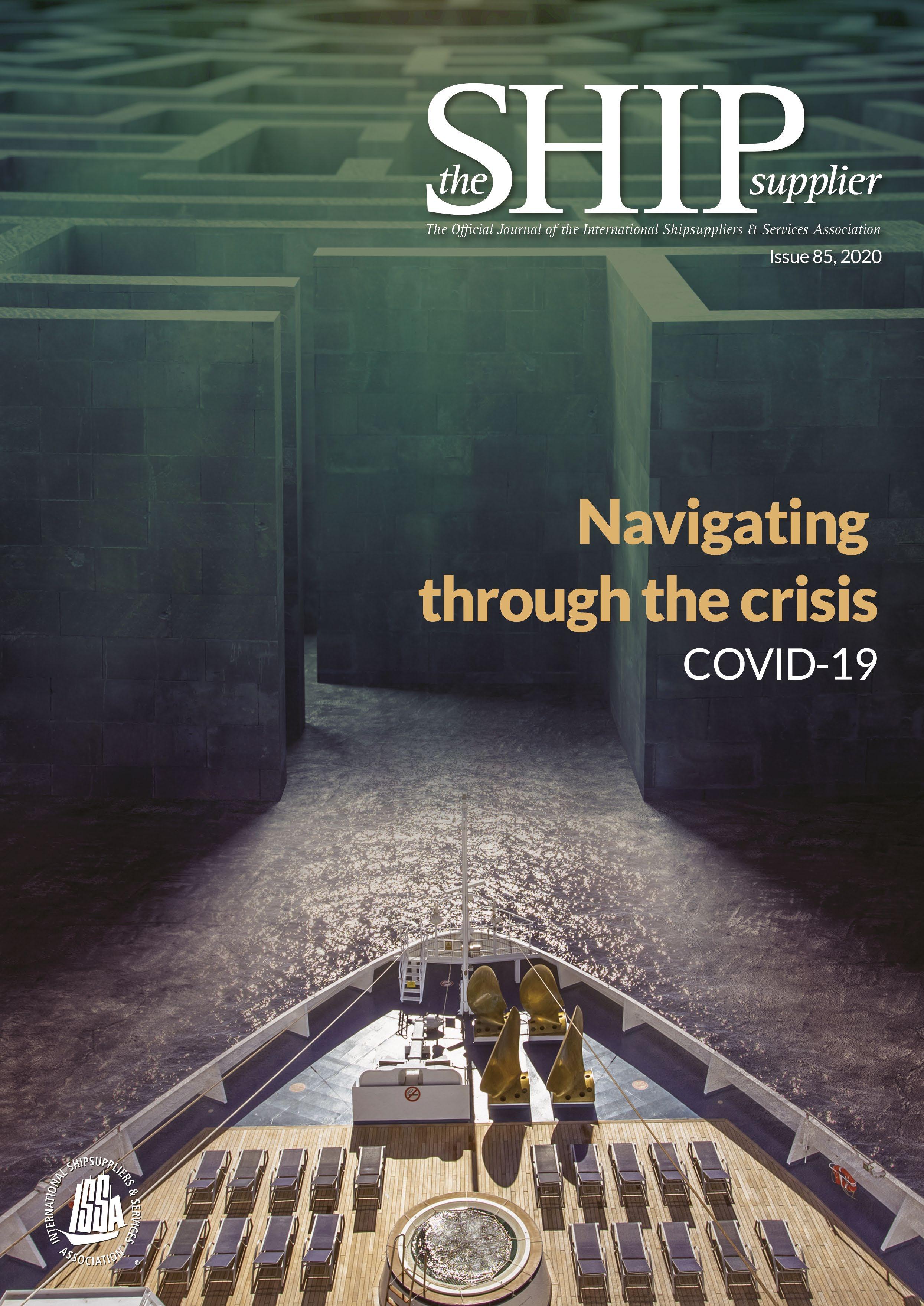
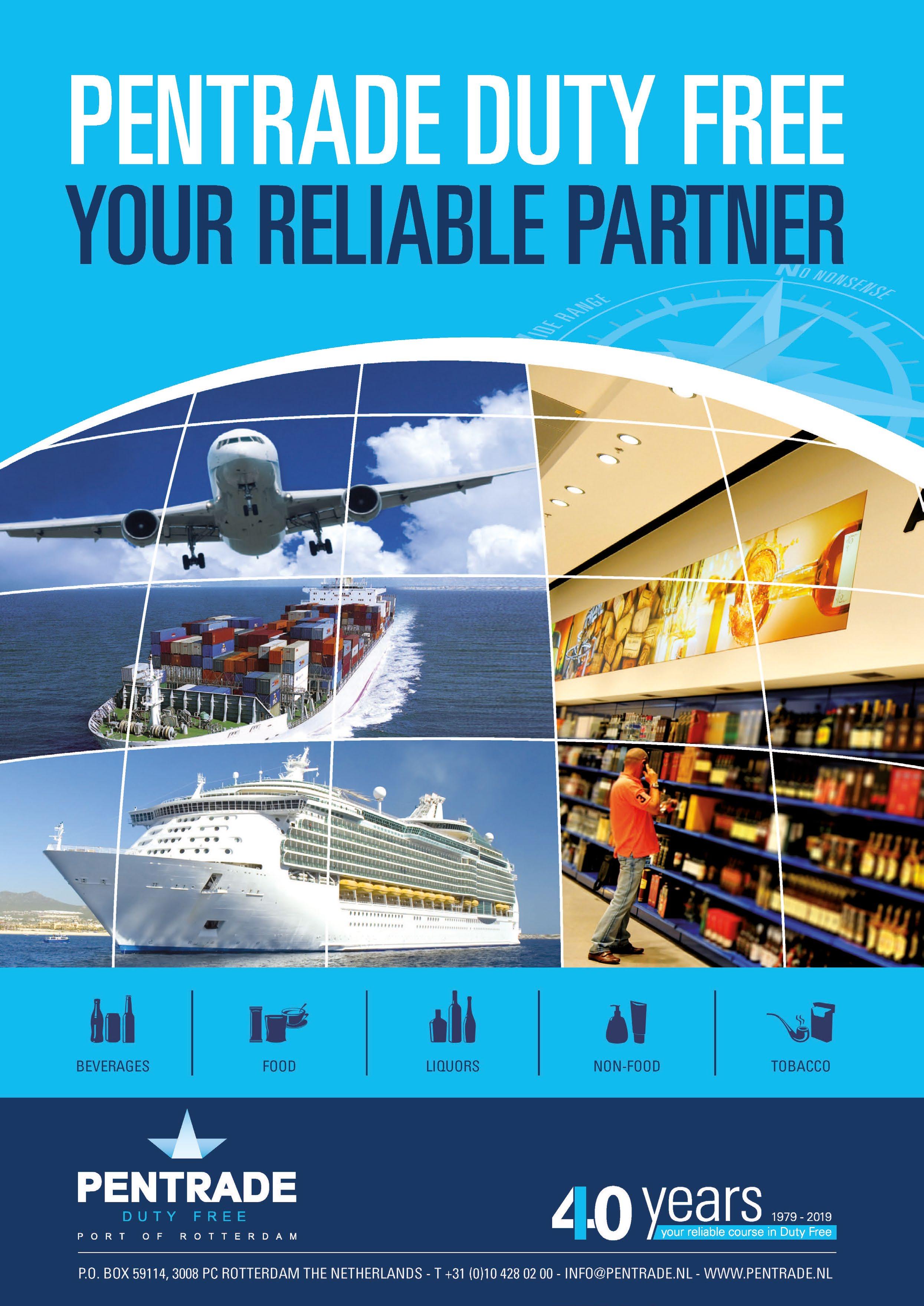
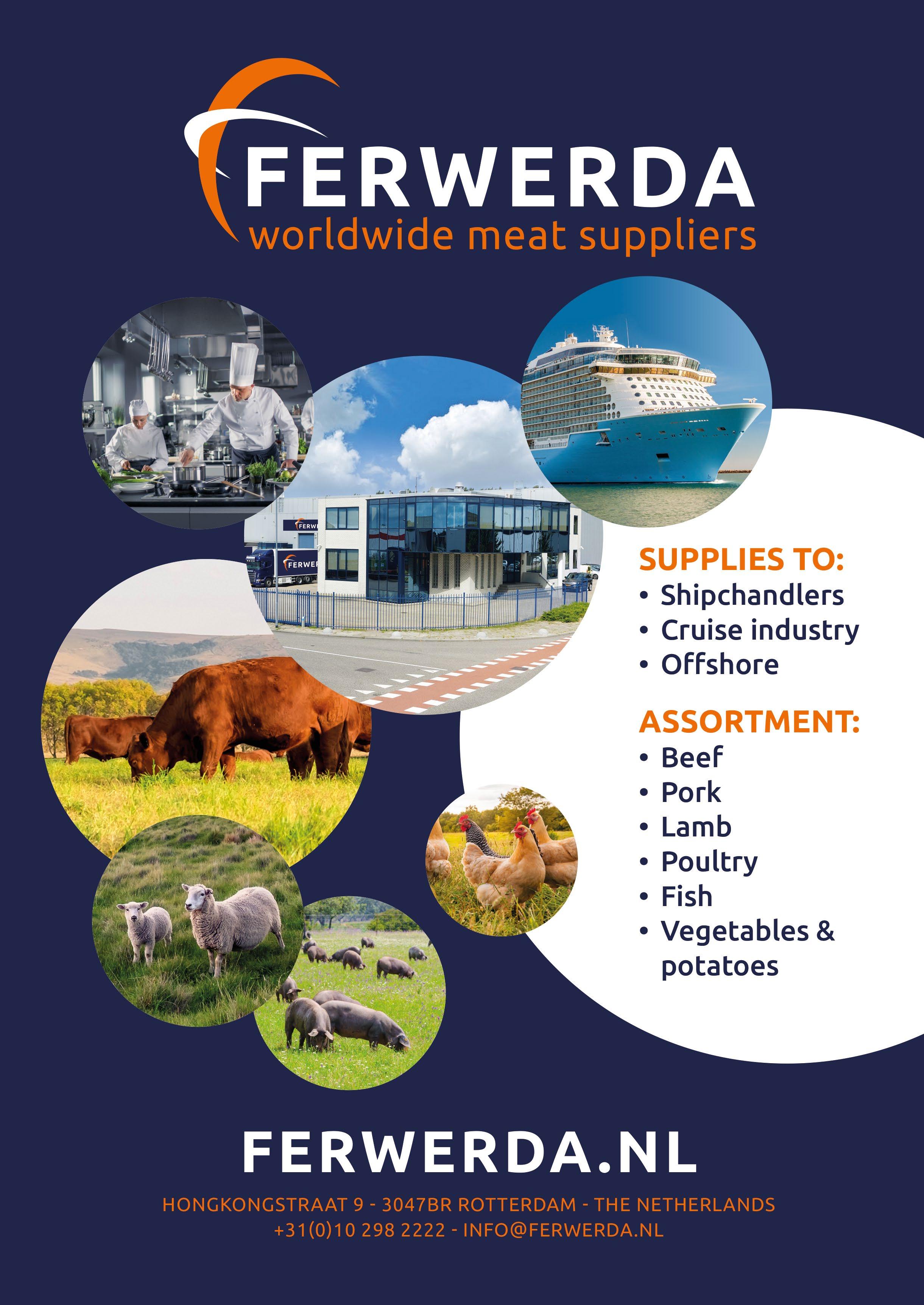
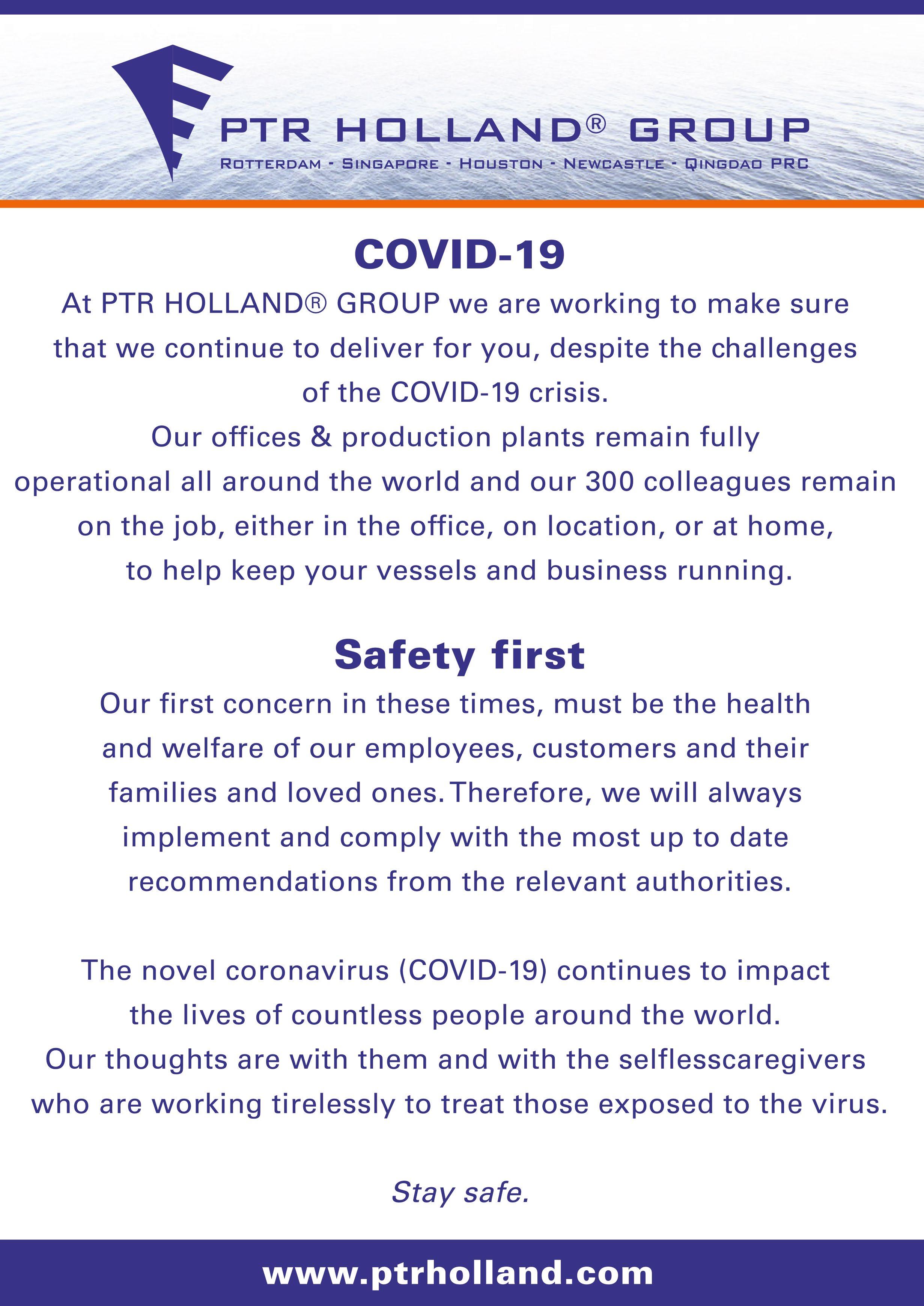
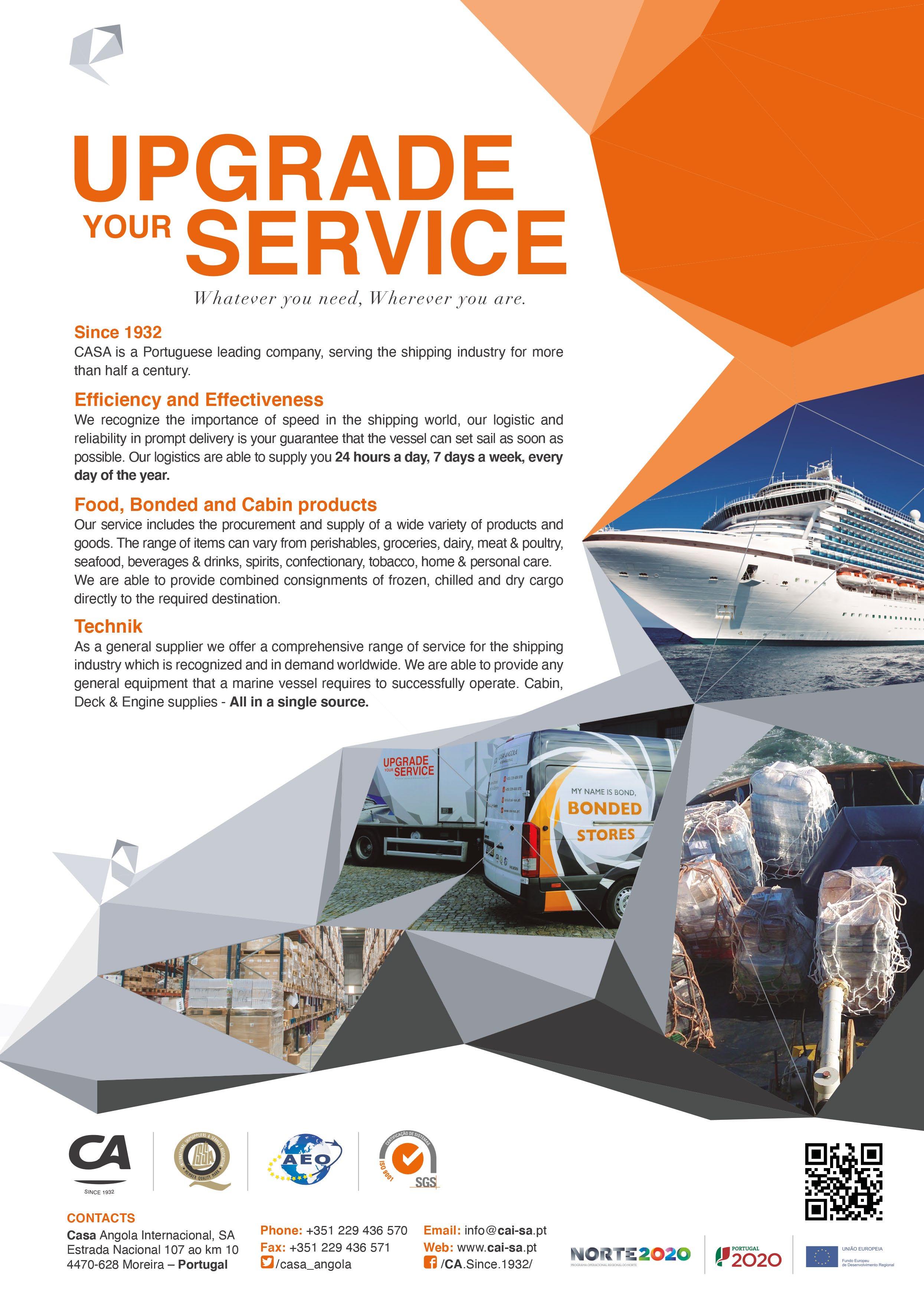
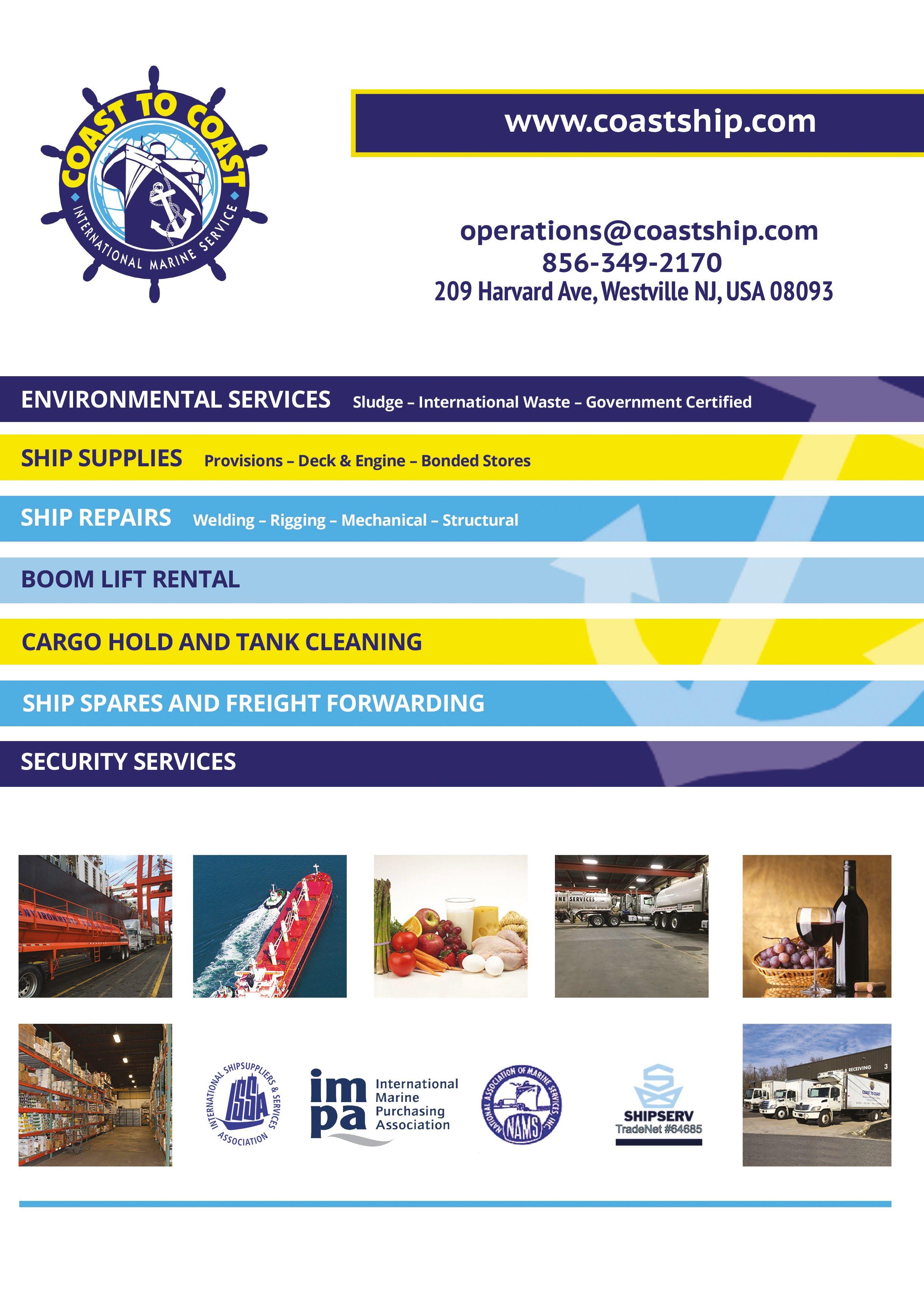
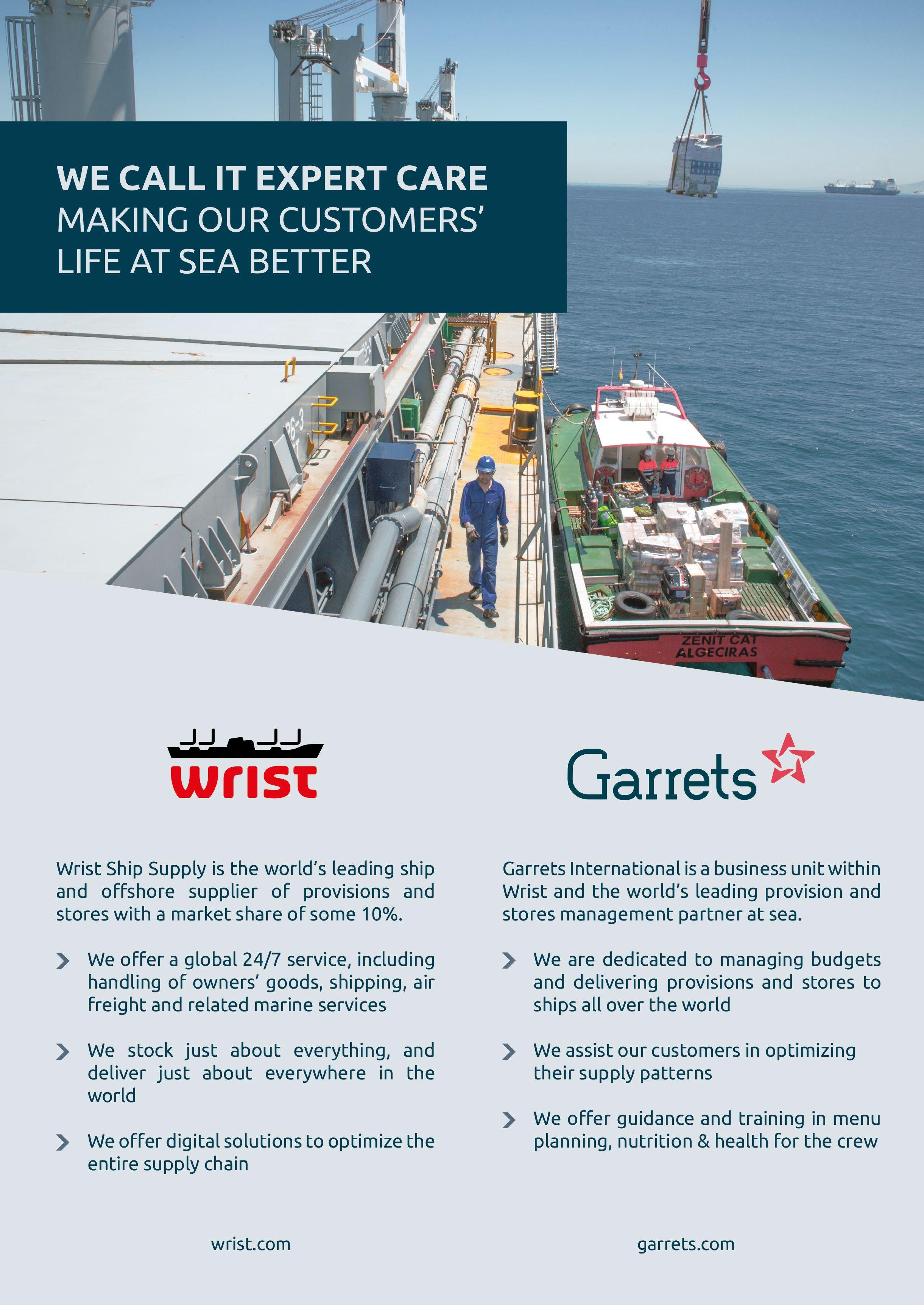
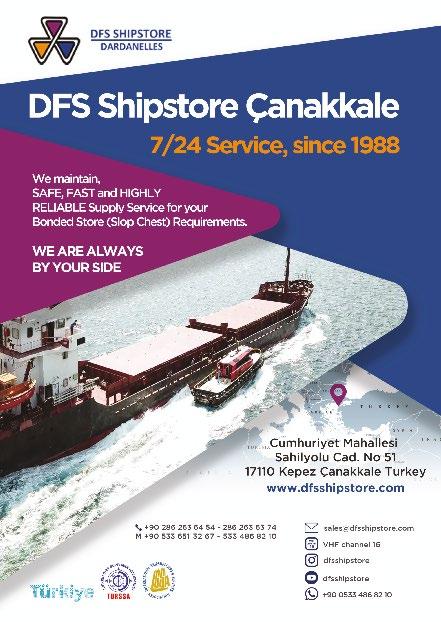

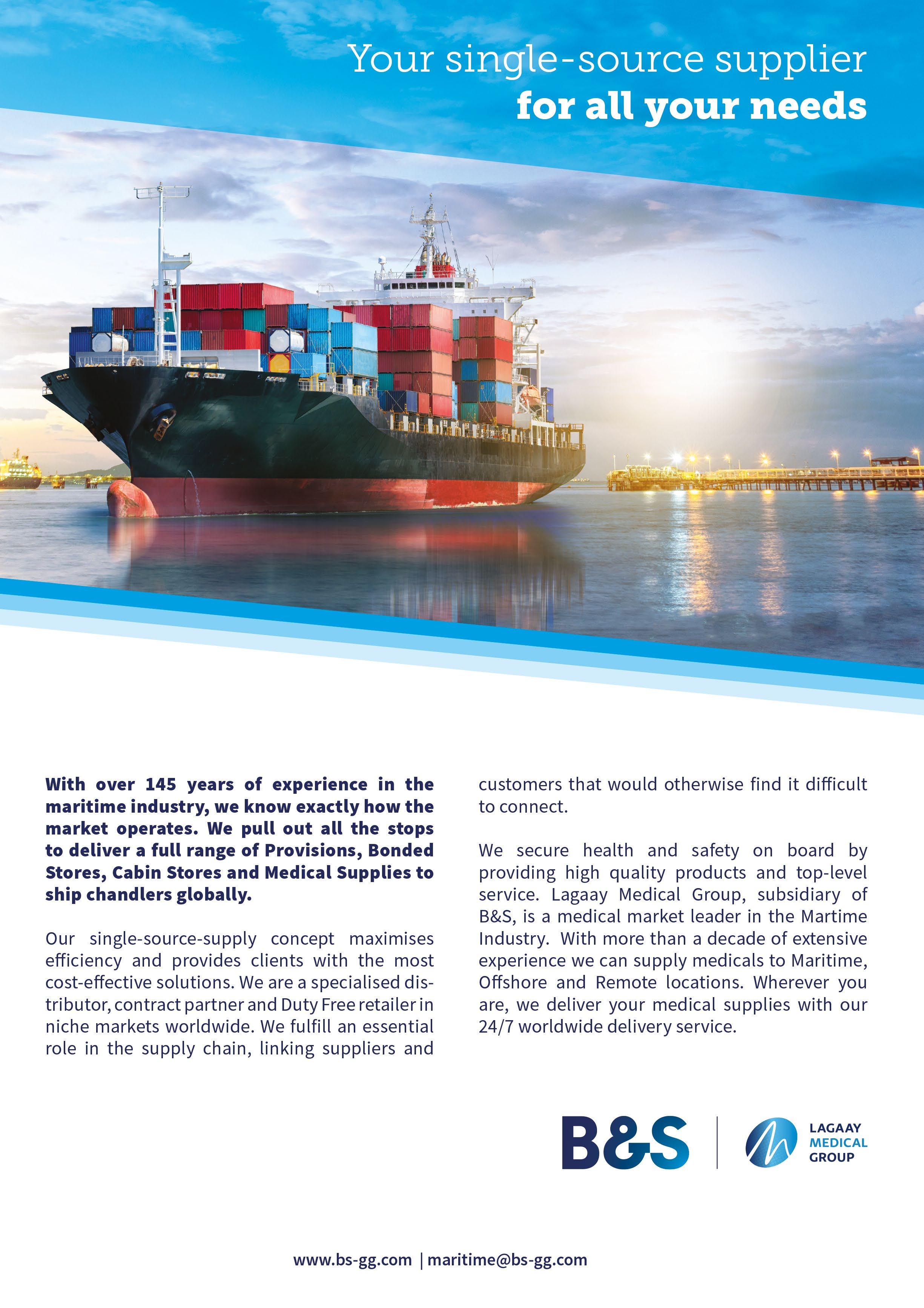
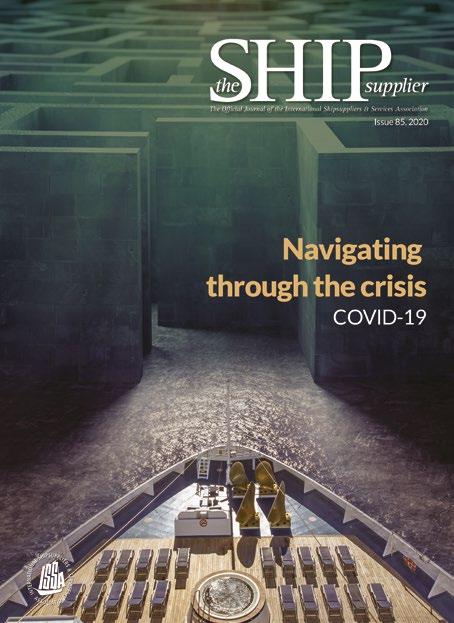
















































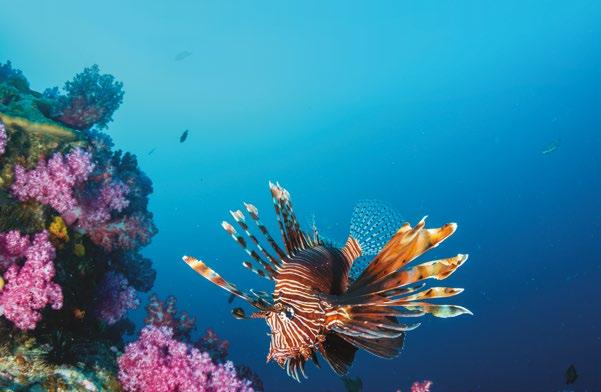
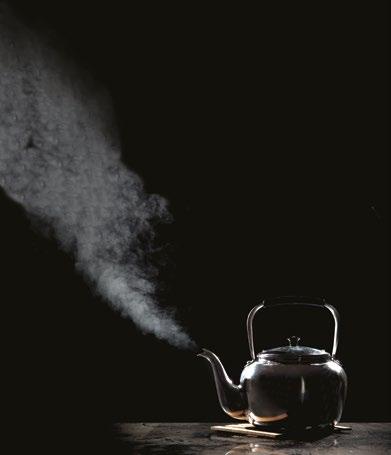


Contents The Ship Supplier Issue 85 2020 Foreword 11 Regional Focus 12 Technology 18 Tools & Spare Parts 20 ECDIS, Charts & Navigation 22 Green ISSA 26 From the Buyer’s Desk 29 Ballast Water 30 Law 34 Medical & Safety Supply 38 Cruise Supply 41 Debt Management 44 ISSA News 45 Market News 48 Play 55 After Hours 56 22 30 40 48 46 Although every effort has been made to ensure that the information contained in The Ship Supplier is correct, The International Shipsuppliers & Services Association/ Elaborate Communications, accepts no liability for any inaccuracies that may occur or their consequences. The opinions expressed in the publication are not necessarily those of the publishers. All rights reserved. No part of this publication may be reproduced, stored in a retrieval system or transmitted in any form or by any means without prior permission of The International Shipsuppliers & Services Association. © International Shipsuppliers & Services Association 2020 International Shipsuppliers & Services Association (ISSA) WEENA 505 3013AL Rotterdam The Netherlands Tel: +44-20-7626-6236 Email: secretariat@shipsupply.org Web: www.shipsupply.org Publishing & Managing Editor Sean Moloney International Shipsuppliers & Services Association Published on behalf of The International Shipsuppliers & Services Association by www.elabor8.co.uk Wingbury Courtyard Business Village Upper Wingbury Farm, Wingrave Aylesbury, Bucks, HP22 4LW United Kingdom Tel: +44 (0) 1296 682051 Fax: +44 (0) 1296 682156 Publisher Sean Moloney ISSA Head of Administration Yvonne Paul Editor Samantha Giltrow Advertising Sales Exec Julian Berry Accounts Fiona Crosbie / Lorraine Kimble Production & Design Diptesh Chohan, Clare Parr The Ship Supplier is published by the International Shipsuppliers & Services Association and is entirely devoted to reporting on the dynamic and diverse Ship Supplying industry. The worldwide readership includes all members and associate members of ISSA, chief purchasing officers, other senior personnel with purchasing responsibility and most marine and trade related organisations. Issue 85 2020 | The Ship Supplier | 9
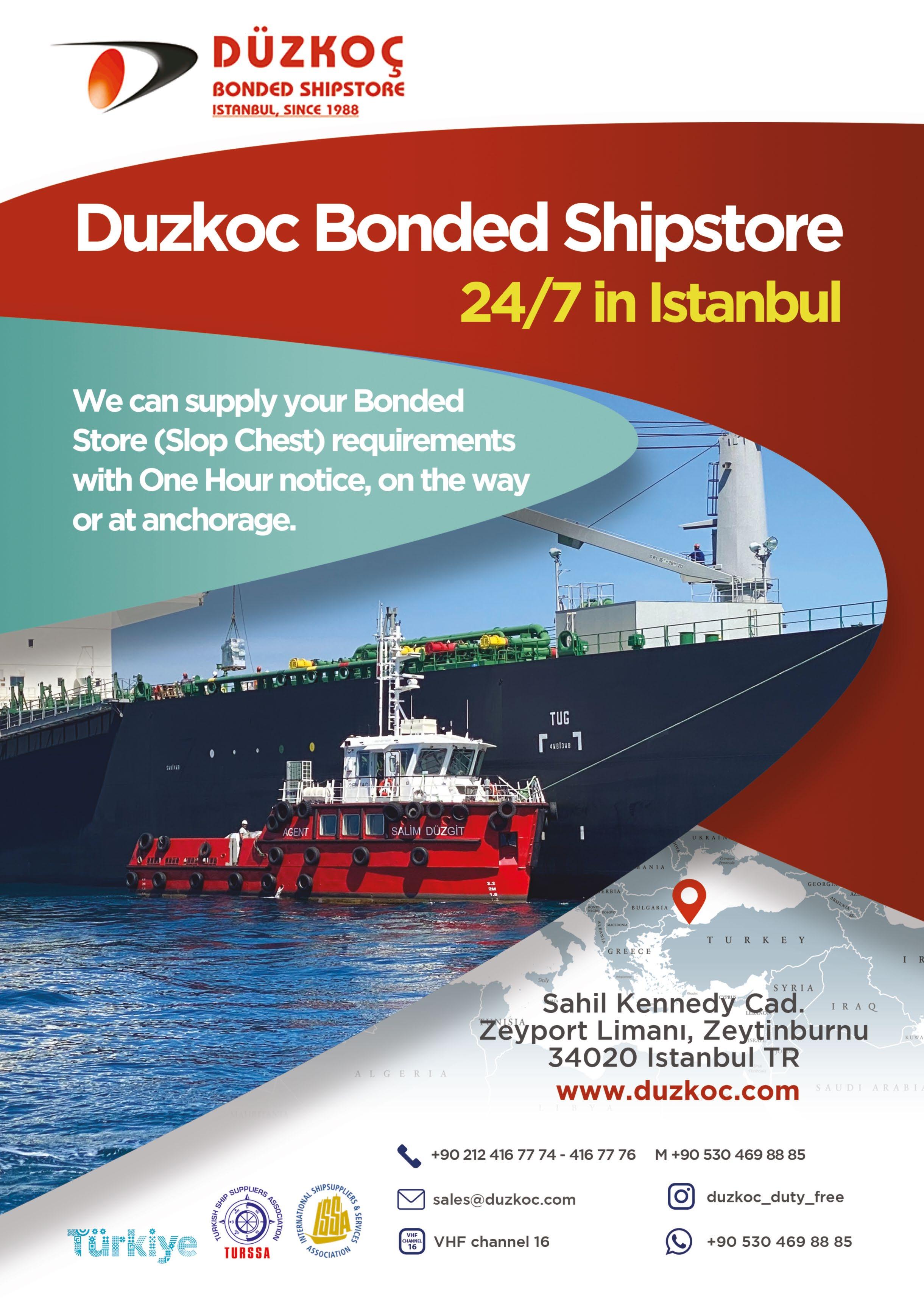
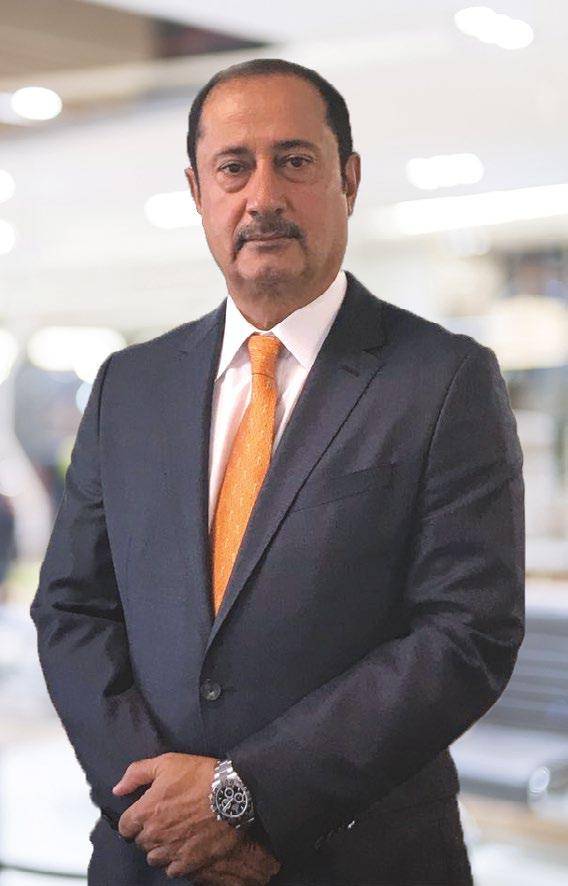
You can keep up to date with the latest news on the ISSA website at www.shipsupply.org and send in your comments and views to the ISSA Secretariat either by phone on +44 (0)20 7626 6236; Fax +44 (0)20 7626 6234 or alternatively email secretariat@shipsupply.org
AForeword
s we start to move into the summer months in the northern hemisphere, the world is starting to recover from the ravages of the COVID-19 pandemic and creep back to some level of normality.
Yet, while national economies brace themselves for the financial fallout from the emergency fiscal measures many have put in place to protect jobs and livelihoods, the shipping industry is weathering its own storm, exacerbated by demand for trade in some areas and total inactivity in others.
Consumer goods are still flowing between ports and countries and the need to store oil, as demand falls but production continues, has helped to prop up the tanker sector. But the cruise industry remains massively affected by the impact of COVID-19. A slump in demand for cruising has meant cruise ships being laid up, or even reportedly sold off, and, as a result, not needing supplies. This has had an adverse effect on some of our members and we look forward, as they do, to a speedy resumption of this important shipping sector.
Our efforts to have ship suppliers treated as key workers has borne fruit in some countries, but not all, with governments understanding the important role suppliers play. But every cloud has a silver lining and if shipping’s role in the global trading psyche is realised and understood because of the important role it played during the pandemic, then that must be seen as a positive.
ISSA has used this lockdown period to continue to strengthen the relationships it is forming with peer associations such as the International Chamber of Shipping and the International Association of Ports and Harbors (IAPH), and has put its full support behind the initiatives to repatriate seafarers stuck at sea.
But while all of these are important, suppliers have their own issues to deal with, not least of all ensuring they get paid by owners and managers for the hard work they do and the valuable services and supplies they deliver. I have written to the Secretary-General of the International Maritime Organization expressing my deep concern at the continuation of poor-payment practices in our industry and I will keep members updated on progress here.
In the meantime, I ask members to heed the advice of Roger Symes, Director of Marine Debt Management (MDM), which is identify where your business is coming from and who your main customers are and be willing to say no more credit, even to longstanding customers. It is also important that you remain wary of new customers and perform an appropriate level of due diligence before granting credit terms.
Happy reading.
Saeed Al Malik ISSA President
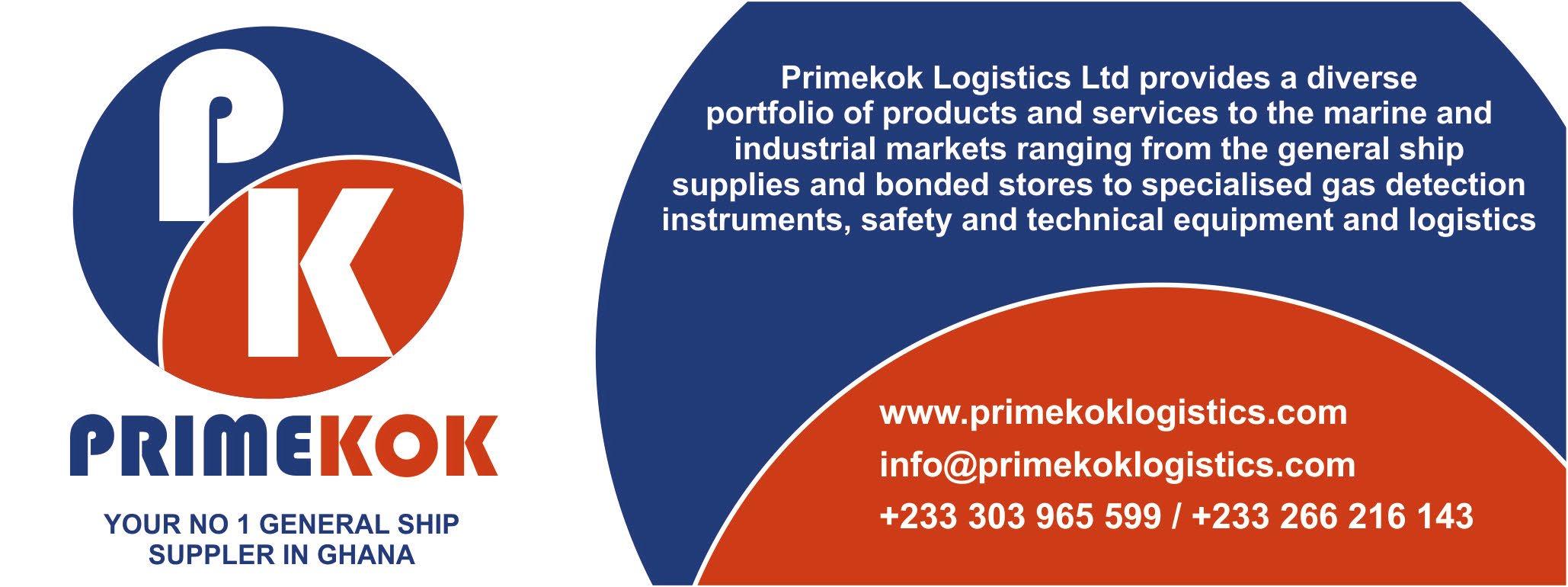
Dear
ISSA Members and Maritime Colleagues
us on twitter @ISSAshipsupply Issue 85 2020 | The Ship Supplier | 11
Follow
UAE & Dubai
UNSSA helps resolve lack of governmental coordination during COVID-19 pandemic
Ship suppliers in UAE and the Middle East have faced many challenges and difficulties during the COVID-19 pandemic, according to Saeed Al Malik, ISSA President and Chairman of the United Arab Emirates National Ship Suppliers Association (UNSSA).
In UAE in particular and Saudi Arabia, he said there has been a lack of coordination between the federal government and local government especially when it comes to transportation such as entering the seaports and providing services.
“ In general, marine supply and service industry dropped the sales approximately by 20% which I believe is normal during this pandemic situation,” said Mr Al Malik.
“Our national association management approached both federal and local government officials to resolve these issues and we found support and help by which we managed to resolve the difficulties and the challenges in days.”
Mr Al Malik also raised his concerns about the impact of the pandemic on ship suppliers in a letter to the International Maritime Organization (IMO) and said a reply from Secretary-General Kitack Lim had served as “great support” in the current circumstances.
In the letter, Mr Lim said: ‘The world is facing an unprecedented challenge and the ability for shipping

services and seafarers to deliver vital goods, including medical and food supplies are even more crucial. As such, I share your concerns related to the well-functioning of the port operations and I want to assure you that IMO will continue to work in close consultation with the World Health Organization (WHO) and other partners to assist Member States in ensuring that measures are implemented in ways that will minimise disproportional interferences with international traffic and global trade’.
Mr Al Malik said all UNSSA members were following the precautionary measures which were announced by the government such as reducing the number of staff in companies, to keep social distancing and proper hygiene. Periodical sanitisation and wearing face masks were also being followed to protect both of staff and customers, with the majority of our staff working from home for their safety.
We continue our services to our principles in a smooth way.
• Shipping industry is now improving and will recover very soon.
• The economy in general will need a few more months to recover.
• The overall forecast in UAE is positive especially the tanker industry. u
12 | The Ship Supplier | Issue 85 2020 Regional Focus
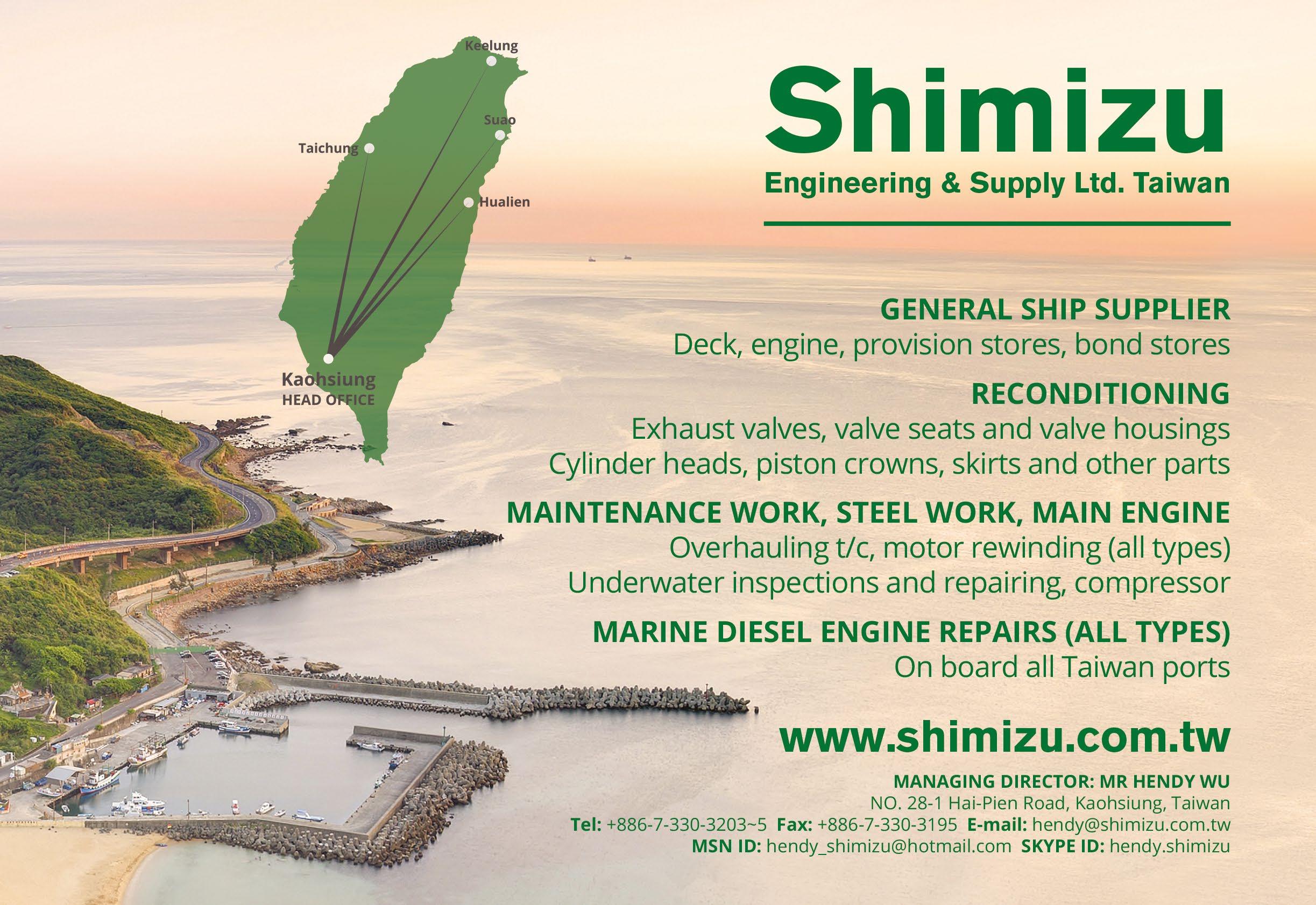
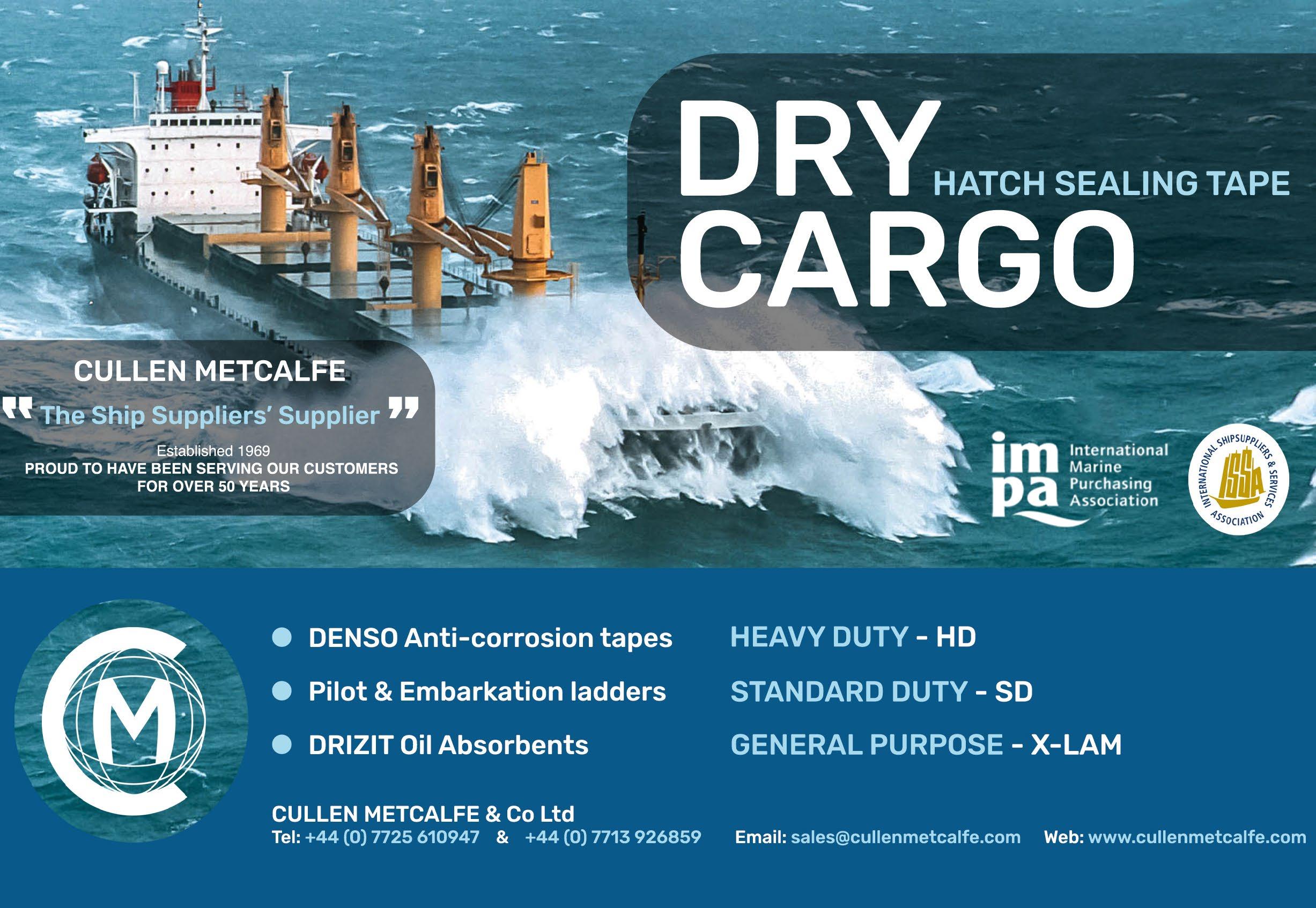
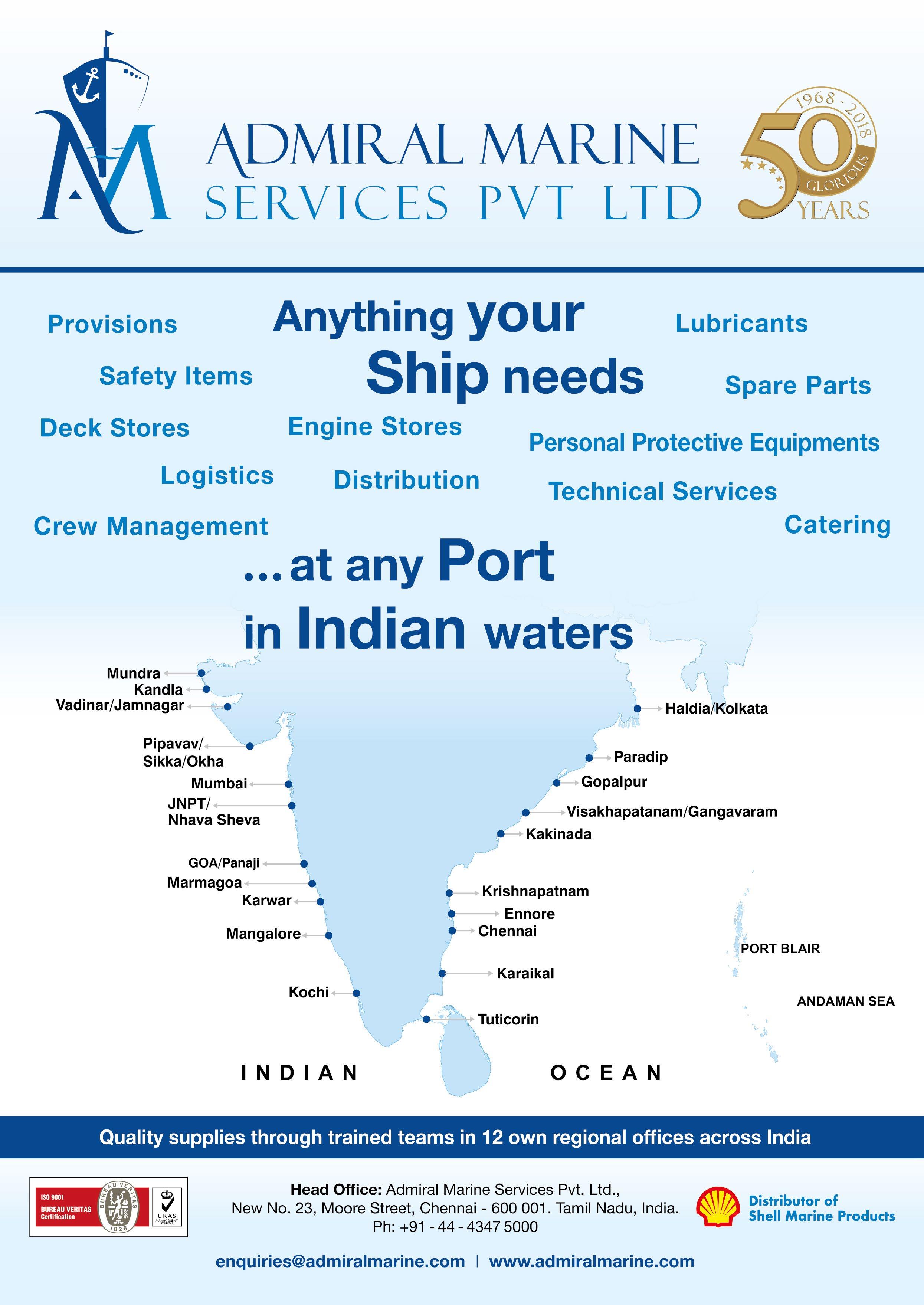
India

India makes slow recovery from pandemic
India, home to the world’s second largest population estimated at 1.36 billion people, has as of June 2020 over 440,000 cases of COVID-19 with the fourth highest number of confirmed cases in the world. The major port cities of Mumbai, Chennai and the capital Delhi alone account for over half the country’s cases.
Given the population density and modest health infrastructure, the Government imposed a nationwide lockdown from 23rd March but it was sudden, not well planned and very strictly enforced, according to Mohamed Yusuf, Director, Admiral Marine Services, based in Chennai.
“As summarised by a noted industrialist, ‘The lockdown
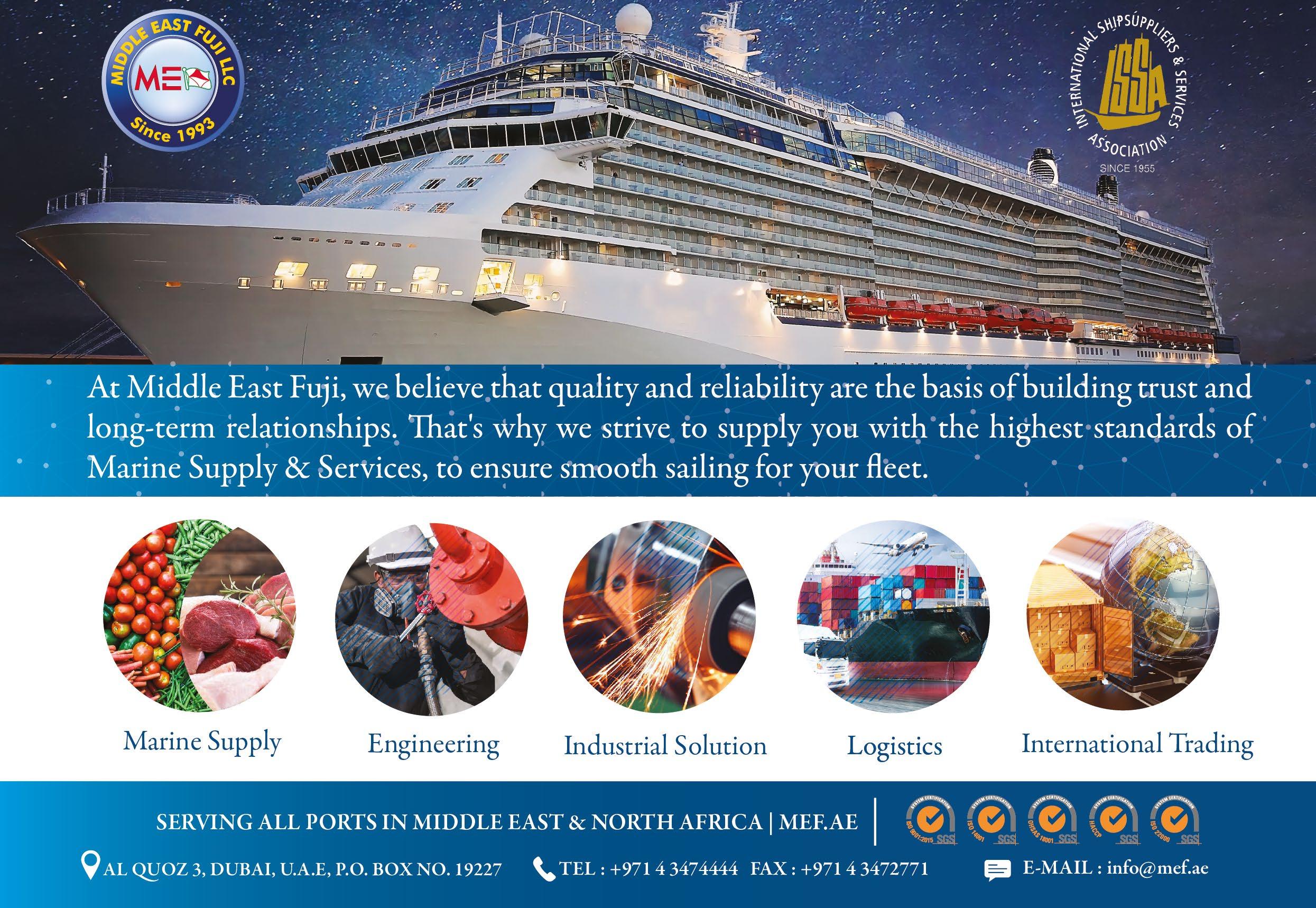
Regional Focus
flattened the wrong curve — not the infection curve, but the GDP curve’, he told The Ship Supplier.
The shipping industry in India, like many others, has been through a turbulent period due to the pandemic but has been making a slow recovery in the past few weeks. Ports witnessed a 50-60% fall in traffic, operating at 30-40% capacity. There has been over a 5% decline in cargo volume in comparison to the same period last year and in the case of containers, the downfall has been more than 12%. An estimated 1.5 million truck drivers have gone to their native places and there have been a lot of restrictions on inter-state and intra-state movement. This also caused a spike in freight rates ranging from 15% to nearly 80%. There has been an unprecedented pileup of containers stuck across the country and there has been much effort in recent weeks to clear the backlog.
Mohamed Yusuf said: “A few days after the lockdown was implemented, the ministry of Shipping, the Directorate General of Shipping, and many other energy affiliated departments did a commendable job in being quick to publish circulars in classifying supplies to vessels and offshore rigs as essential. Yet, these circulars were helpful in only a few port cities.”
In Chennai, for example, passes to operate under the lockdown were denied as credence was not given to ship suppliers involved in the supply of essentials to vessels and offshore rigs. Although operation of seaports, movement of cargo and vessels have not only been deemed essential but also significant, supply of lubricants, machineries, spares etc. that are essential to ships have been

rejected as being non-essential on the basis of comparison with food and medicines.
Mohamed Yusuf said they have found ways to carry out supplies by getting letters from vessel managers and captains about the urgency of supplies, arranging port passes, convincing the local authorities and approaching police stations for one-time permission.
“In reality, we are not even accepted as essential supply and service providers since our passes for vehicle and personnel movement have been rejected, delivery trucks have been stopped, our staff have been heckled and fined.”
He said delayed payments on credit offered to vessel managers and owners had always been a prevailing issue but the pandemic was being used as another excuse to further delay payments.
Although delivery time at the ports has considerably increased due to new PHO procedures, he says Admiral Marine Services has remained patient and coordinated with vessel agents in setting realistic expectations for the vessel. The company has also put in place stringent safety procedures at its offices including temperature screening and recording all attendees in offices and warehouses, the use of masks at all times, maintaining prescribed physical distances, availability of sanitisers, hand soaps and PPE for all, and fumigation of all workplace areas including vehicles and loading materials.
“We remain motivated and excited as we believe that there is light aplenty at the end of this dark tunnel,” said Mohamed Yusuf. u
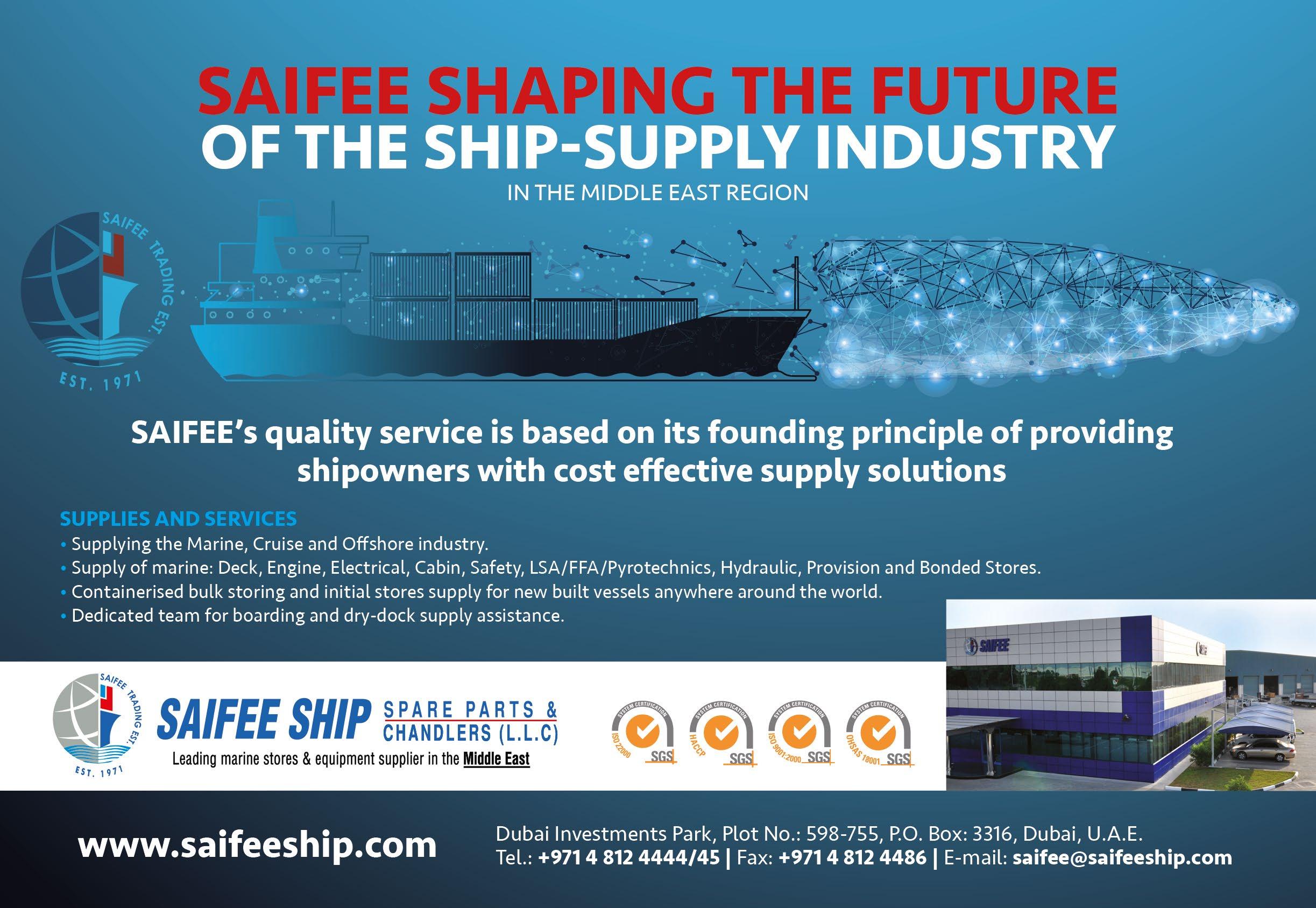
Regional Focus


Coronavirus crisis speeds up reorientation
“It’s now becoming increasingly clear that digitalisation is an important driver in the maritime sector,” noted Klaus Deleroi, Deputy Chairman of VDMA – Marine Equipment and Systems and Managing Director of REINTJES at the recent press conference of the shipbuilding and offshore supply industry in the VDMA (Mechanical Engineering Industry Association).
The conference heard that in 2019, German marine and offshore equipment suppliers with their 64,500 highly qualified employees (3% more than in 2018) increased their sales to €11.4 billion (up 4.5%) and registered 3.4% growth in orders. However, he said it was difficult to estimate the further outlook for 2020 once this order backlog has been handled following the coronavirus pandemic.
About 40% of companies anticipate a drop in incoming orders in Germany, while 25% of firms currently expect foreign business to decline.
“In the long term we expect to see the rapid technical modernisation of the global fleet, which is obsolete in many cases. Such an upgrade is essential for achieving the climate targets that have been set,” said Mr Deleroi.
Overall, German makers of marine and offshore equipment supply their components and systems for nearly all ship types under construction. There are, of course, companies that have specialised in specific vessel types and now have to cope with declines in orders, which have been very considerable in some cases. It is vital for these firms to make new developments and refinements attractive for other groups of customers and position themselves more broadly if possible.
Technology drivers here are cruise ships and yachts and particularly also ferries, gas tankers, work boats and ships for navies that are built worldwide and are in demand.
Maritime equipment suppliers in Germany are satisfied with their performance in the 2019 financial year and, despite all short-term imponderables, expect to achieve good business results in the future.
“Thanks to the favourable order situation, we were able to increase our workforce last year. We’re generally in good shape in the sector,” said Martin Johannsmann, Chairman of VDMA –Marine Equipment and Systems and CEO of SKF. “That paid off in the Corona crisis. We very quickly learned how to respond to the pandemic.”
Production in the industry continued with almost no hold-ups, despite occasional bottlenecks at suppliers. Orders could be completed, and international logistics is
meanwhile also back on track.
Companies are reporting problems with the international travel restrictions that now apply, as service personnel cannot visit customers to provide support. “But even here new solutions are presenting themselves in some cases. Firms that invested early on in the digital possibilities offered with teleservice now have an advantage,” Mr Johannsmann said. “We’re currently concerned about customers’ increasing reluctance to buy items. However, we can’t make any reliable predictions in this respect and have to continue to proceed cautiously. The measures swiftly taken by the German federal government such as degressive deprecation, loss carry-back and expansion of tax incentives for research and development are important for enabling companies to weather this period effectively and stay competitive in the world market.”
“We want to provide technical support for our high-tech products and systems over the entire lifecycle for all ship types and ensure optimal operation both ecologically and economically,” added Mr Deleroi. “However, just as important is a generally healthy and competitive European and German maritime industry if it is to remain successful on the world market. In the current situation, the future supportive measures announced by the federal government, such as the bringing forward of the fleet renewal programme, from which German shipyards and the supply industry will hopefully benefit.”
At the same time, the sector has to attract sufficient suitable young talent for ensuring the further digitalisation of products and processes by offering attractive working conditions and interesting assignments. Future-oriented areas such as the standardisation of open interfaces with the Universal Machine Technology Interface (UMATI) are important for companies developing new products and services. Only firms that know and implement the overarching digital system developments can hold their own on the market. The joint efforts of the German maritime industry with the compilation of the VDMA standard sheet for the MTP (Module Type Package) give the sector an international competitive edge in this respect.
Mr Johannsmann concluded: “The current situation in the economy generally and in our sector in particular is problematic, as we have little in the way of reliable indicators for the future. We are convinced that once the Corona crisis has passed we will be successful with our innovations in digitalisation along with the implementation of green drive concepts in the global maritime market and make our contribution to promoting climate-neutral logistics.” u
Technology
18 | The Ship Supplier | Issue 85 2020
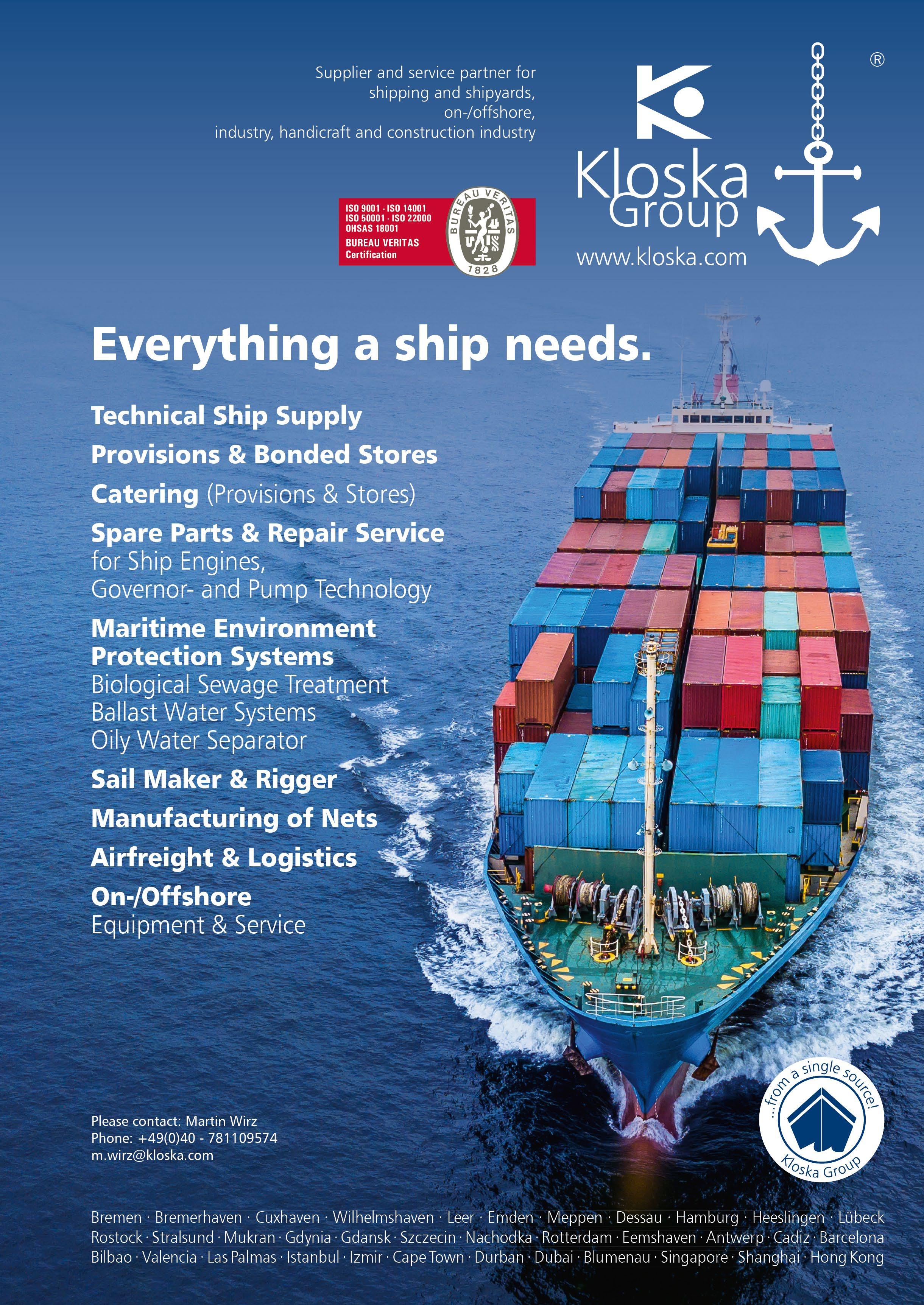
Spare parts – the key to staying afloat
By Lauri Helkkula, Manager, Life Cycle Services, Auramarine
With global markets crashing, businesses forced to rapidly alter operations to stay afloat and international travel - for the most part - suspended, the last few months have seen the world shaken with previously unprecedented change due to COVID-19. More specifically, the shipping industry has been massively impacted through the disruption of crucial supply chains, a reduced and stranded workforce and record low oil prices.
The global pandemic, coupled with the implementation of IMO 2020 and industry’s shifted focus towards a zero carbon emissions future, has not only seen an influx of alternative fuels and propulsion methods, but played host to a new and uncertain regulatory landscape. In turn, it has placed an even greater need for ship owners and operators to implement processes which ensure operational and environmental efficiencies, continuity, compliance as well as minimising costly downtime in a post 2020 world.
Right now, there remains even more pressure on ship owners and operators to keep the global supply chain moving, providing the world with essential goods and supplies in the wake of COVID-19. Ensuring the rapid delivery of high-quality, and tailored spare parts is a critical part in achieving this.
Ship owners and operators, and the wider industry as a whole, are becoming more aware of the necessity to forward plan, future proof and adapt, in order to accommodate planned regulatory changes, as well as unplanned circumstances. In the wake of IMO 2020, while owners and operators have now determined their compliance solution of choice, managing the operational transition to new very low sulphur fuel products is where the real challenge in ensuring compliance and continuity lies. Auramarine therefore offers services, such as the modernisation of existing fuel systems, to ensure vessels are able to remain compliant at minimal expense. Fuel supply systems play a critical role in meeting this challenge, and in line with this, having an integrated strategic approach to managing spare parts in order to repair, modernise and upgrade systems and components is vital.
This has been a core tenet of Auramarine’s customer relationship management strategy; supporting our customers
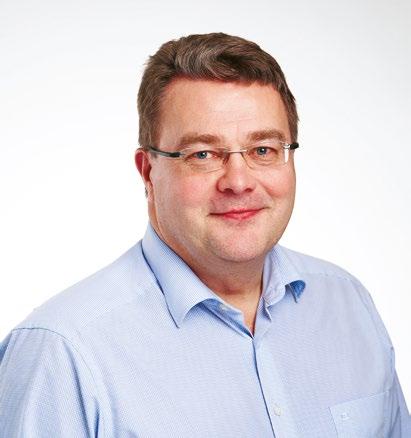
through providing rapid worldwide on-demand spare part deliveries from our hubs in Shanghai in China and Turku in Finland.
Driven by our Life Cycle services team, we have been working with owners and operators to enable them to understand how different fuels, for example LSHFO and MGO, behave when introduced to a fuel supply or switching system, and how this can impact performance. This expert insight into specific elements of fuel management, such as cooling, viscosity and lubricity, is key in ensuring that the fuel’s properties meet the set specifications at engine inlet. With this knowledge, and additional technical support and consultation, we can recommend and provide solutions that are most fitting and appropriate to a fleet’s specific requirements. That being said, the challenge is that the fuel properties are sometimes unknown and can vary in different bunkering stations. Ensuring that all elements of a fleet’s spare part network are catered for will enable owners to swiftly continue and safeguard operations whilst staying in line with regulations as well as unforeseen circumstances.
With continuing changes to the regulatory landscape, and COVID-19 impacting operators in different ways depending on location, it is critical that spare parts programmes are tailored for specific ship owner requirements. Although it is not always possible to stay ahead of the curve, proactive and planned maintenance is vital to protecting critical equipment, as well upgrading and modernising systems to provide superior performance, drive efficiencies, ensure compliance, minimize downtime, as well providing peace of mind.
The recent uncertainty around IMO 2020, coupled with the detrimental knock-on effects of COVID-19, further highlights the need for adaptability and future proofing measures for vessel owners and the wider industry in a post IMO 2020 climate. In order to drive continuity and commercial success, shipowners must understand how best to mitigate risks, minimise downtime and manage unexpected costs and delays. The rapid delivery of quality and custom spare parts are key to not only safeguarding operations but achieving a sustainable infrastructure which meets the significant challenges that we face today, as well as standing the test of time. u
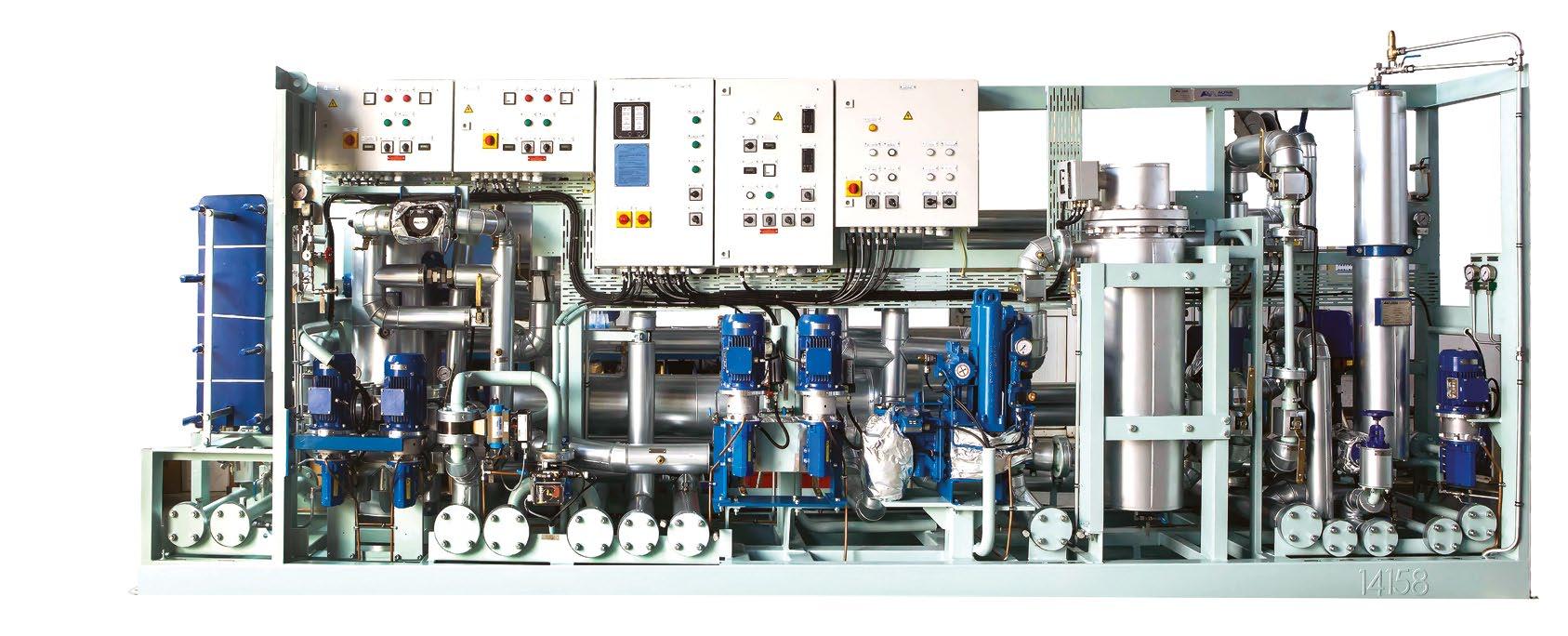
Tools and Spare Parts 20 | The Ship Supplier |





Navigating the impact of COVID-19



Across the maritime world, Covid-19 has accelerated the take-up of digital and new tech solutions. The world of ECDIS, charts and navigation is no different – but, as Felicity Landon reports, there are other important drivers too


At the end of May 2020, ChartWorld launched MyFleet, described as the shipping industry’s first free-ofcharge cloud-based tool to do due diligence on voyage planning. Designed to support onshore teams in checking and assessing risk in a ship’s voyage plan, MyFleet’s arrival follows on from a legal ruling which has a huge impact on vessel operations, said Oliver Schwarz, ChartWorld’s Business Development Director.
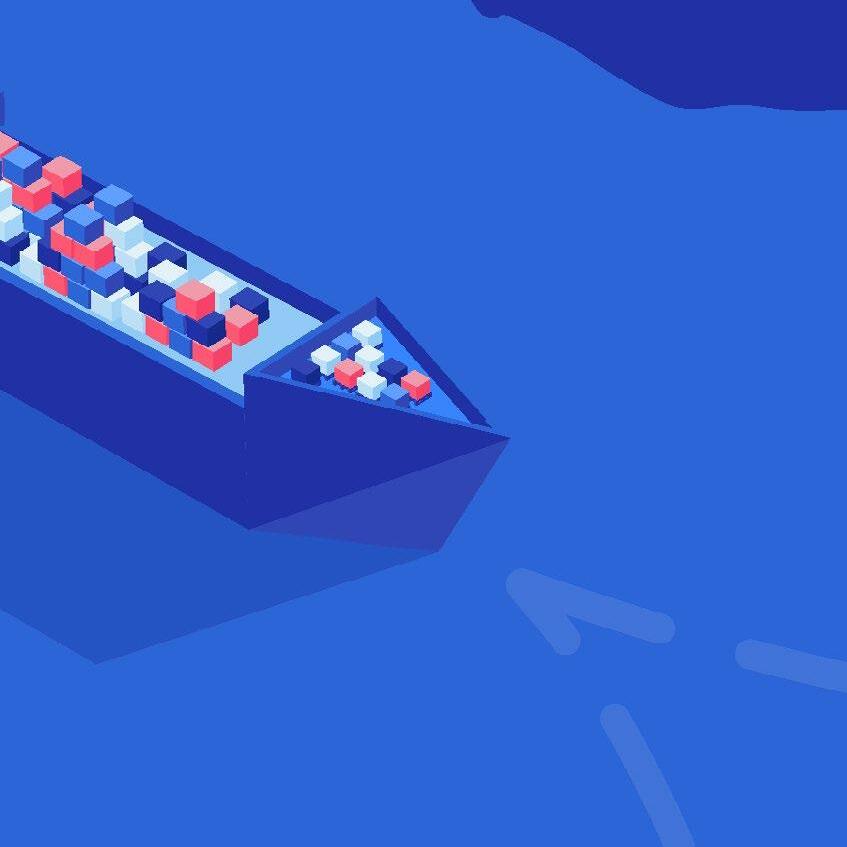

He said its development was driven by a combination of factors – response to demand, the CMA CGM Libra legal decision and ChartWorld’s ongoing development focus.
“There were two major triggers to move forward with MyFleet. First, specific demand from our office in Tokyo. Japanese ship managers/owners appear to take a particularly diligent approach to safety and due diligence of a voyage plan prior to departure. That is something we have not seen in other parts of the world. In Japan they manually enter routes into an ECDIS in the office to do due diligence of the voyage plan coming from the second mate on the vessel – and that is so much work.”

“Second, the CMA CGM Libra case (the containership grounded when leaving the port of Xiamen in May 2011) and appeal judgment in the High Court. The judge confirmed previous rulings, agreeing that if the shipping company does not put into place proper due diligence measures on a voyage plan, then the ship can’t be considered seaworthy. This ruling has a huge impact on the way ship managers and ship owners will need to operate vessels in the future. I don’t think the industry has really understood yet what it means.”
ChartWorld has been ‘carefully testing the ground’ in this area, he said. “The ruling suggested that the shipping company must make sure the vessel has all the tools of information in place to make the best possible voyage plan and must have some sort of process to verify this.”



MyFleet is a logical evolution of ChartWorld’s MyRA voyage planning tool, said Mr Schwarz. “MyRA is an appraisal tool. The voyage plan made on the vessel is automatically shared with MyFleet on shore, allowing the marine management team on shore to take a good view of what is happening on the vessel and do verification.”
the created voyage plan for each vessel of the owner’s fleet, and the route in use on the ECDIS. The reaction to the tool has been extremely good, said Mr Schwarz. “It was launched at the end of May and we have eight shipping companies subscribing to it already.”
A ship being ‘at sea’ is no longer a viable or legal defence for lack of shore-based oversight, he warns. “Improvements in communications, tech and intelligent routing software means the wider world now expects vessels to have shore-based navigational oversight.”

The entire development of MyFleet, from planning phase to delivery of first release, took eight months. ChartWorld can push out updates easily because MyFleet uses browser technology, and it is planning six update releases a year.
In its basic form, MyFleet provides free-of-charge weather data, ChartWorld ENC data, the ship’s position,

What about industry reaction to the Libra ruling?
“We are seeing very strong resistance in the industry against the indication about what this court ruling implies. At present, liability sits with the master but in the future that may not be the case – so the question is, who will take responsibility? Will the master be able to share responsibility with the office?”
“Ship owner/manager offices are all happy to look at information but actually sharing in all the responsibility isn’t what shipping companies want to do. But it is inevitable and it will require change in mindset.”


The COVID-19 pandemic, meanwhile, has had a clear impact on customers, said Mr Schwarz. “Clearly something we have identified is that customers are not making investment decisions. No one knows where this (COVID-19) is going and they don’t want to spend money.

The Ship Supplier ECDIS, Charts & Navigation





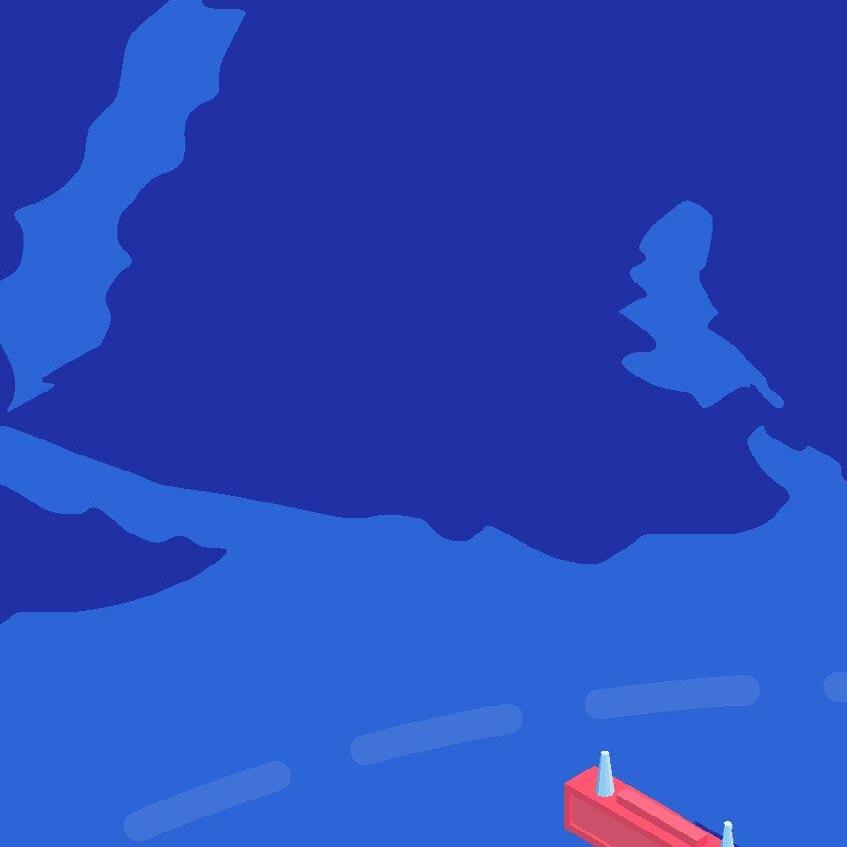
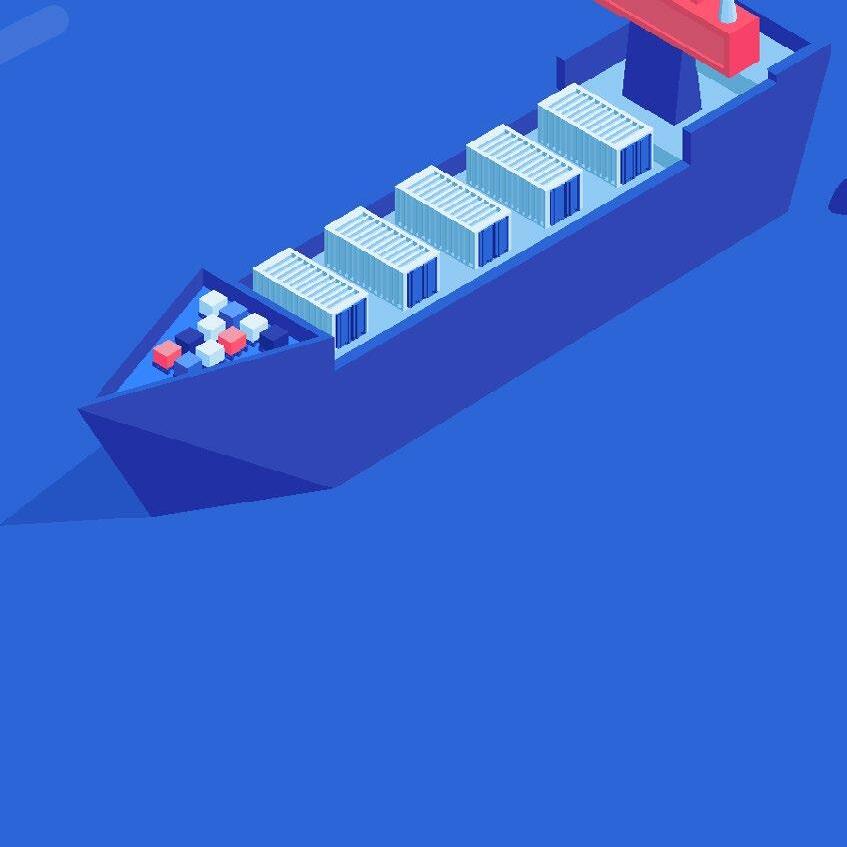
“But an important development is that our customers now understand that sending out paper products to vessels is a thing of the past. We don’t need to send paper books; we can learn to appreciate benefits of e-books. COVID-19 pushed this forward and customers had to respond.”
For ChartWorld, the impact of COVID-19 has led to a rethink on office space. “Working from home is a new experience,” said Mr Schwarz. “We have had people working from home in the past – of course, software developers can easily work at home. But all the customer services team have been working from home; we learned how to live with the ‘new normal’.
“We had previously applied to rent another floor (in Singapore) because our work was growing fast, but now we have told the landlord it isn’t going to happen. That entire trend is going to affect the real estate market. There will be new ways of working – for example, staff partly working at home and not coming into the office every day.”



First ever digital sextant
ScanjetPSM is launching a new development which provides back-up in the event of failure or malicious adjustment of a vessel’s GPS system. It says the first ever Digital Sextant provides a simpleto-use solution, with no specialist training needed, and is capable of delivering ‘pinpoint accuracy’ without the need for additional charts or tools.

home was a success for e-navigation specialist NAVTOR, too – but nevertheless, the company moved into new offices in Egersund, south of Stavanger, in early June.
“It is always nice to move into something brand new,” said Managing Director Tor Svanes. “We will have about 225 people spread across two floors.”


In addition, the company has already adjusted its travel budget. “We have adopted e-meetings and e-sales pitches and there will be a lot less travel.”
Having employees working from

He pointed to the positive impacts of COVID-19 on the industry: “All the maritime news reports say that digitalisation in maritime has been speeded up due to COVID-19. So, if that is what we can expect, it is good to see.
“When it comes to physical ships, of course we have seen some ships go into lay-up – but we don’t look at that as a loss, because a part of the service NAVTOR has is that it is possible to switch off and then switch on again and in seconds you are up and running with all updated information. So, it is very convenient when you have to go into warm layup because there is no hassle at all just to connect and go on.”

“The Digital Sextant enables fast, accurate identification of position with longitude and latitude readings, minimising the opportunity for operator error and providing and recording the location within seconds. Once readings have been taken, the position is immediately displayed. If the vessel is moving, the heading and speed can be entered. With no manual calculations required, the attendant risk of errors is removed.”


The embedded design of the Digital Sextant incorporates a built-in chronometer, with access to the astronomical details of the sun, moon and more than 60 stars and planets. Algorithms offer automatic position analysis and global position calculation. u
different; at that time we had servers in the office which needed to be maintained and kept running. Now everything is in the Cloud and we can log in wherever we are – it is fantastic and we had no interruption of services.”

NAVTOR had people working at home for 12 to 14 weeks. Everything went well, said Mr Svanes. “Twenty years ago it would have been

There has been the odd challenge in getting customers up and running, he says: “But all these things can be solved by phone call or email to our technical service team.”
NAVTOR says a collaboration agreement signed with Japanese weather service company Weathernews Inc (WNI) will keep it on course to ‘redefine navigation, moving

The Ship Supplier ECDIS, Charts & Navigation

beyond charts and chores and into the very heart of vessel operations’.

WNI originates from a background of safeguarding sailors and protecting ships. “Utilising its vast amount of climatology data and the in-depth knowledge of its staff ensures a safe and economic routing of vessels to supports the single most important objective of safety at sea,” the company has said.
“The agreement between NAVTOR and WNI is unique in the e-navigation sphere. NAVTOR will significantly upgrade its weather information offering within the route planning software NavStation, and WNI gets direct access to ENC and passage planning, further improving WNI’s service offering. The combined strength of NAVTOR and WNI enables the development of a groundbreaking artificial intelligence (AI) routing service.”
The partners are combining their wealth of operational and weather data to create a software application that transforms data into detailed, reliable and optimised decision-making tools with real-

time capabilities, said the company. “This novel combination has the potential to revolutionise route planning, efficiency and safety in the maritime industry.”




“A series of releases this year will mark the beginning of a very comprehensive fleet management system, which will be a sort of disruptive product in that market and interesting to see,” said Mr Svanes. “Normally we talk to the responsible navigation people at the shipowner or manager. Now we will start talking to the people in operations and shipping, so it is quite interesting to us to broaden our network. Going into vessel/voyage performance is a big step in a new direction.”
What are customers asking for? Navtor puts great emphasis on customer feedback, said Mr Svanes.
“We try to push our users to tell us what they are looking for, what we can do better, all the time. Sometimes they don’t say anything because they don’t know what is possible to do. So you have to ‘squeeze’ them a bit and ask: what would you like to see?”
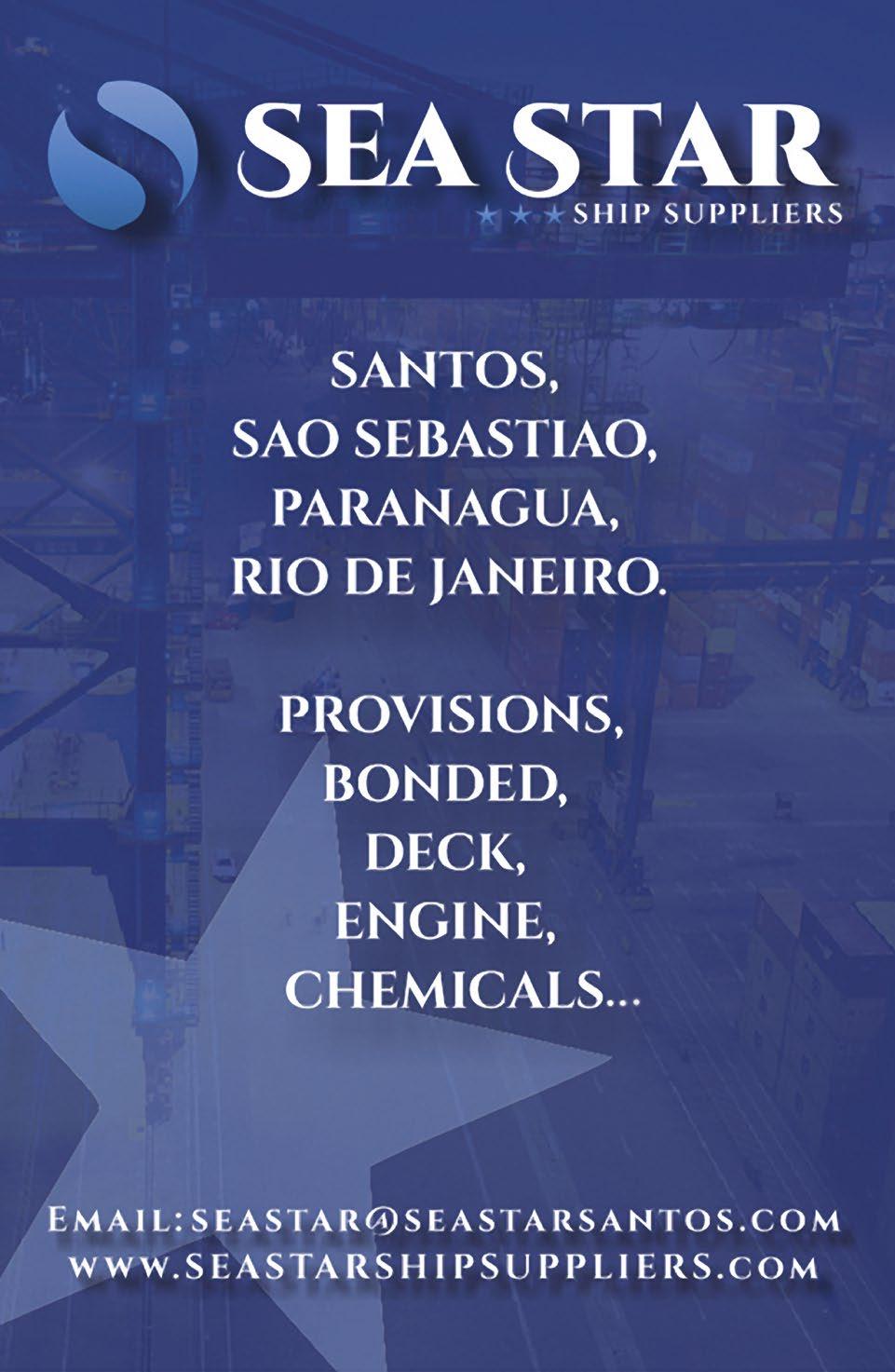

Number one priority is ease of use. “Customers are looking for a better and better human interface. It should be intuitive to use (navigation systems) and they want it to become even easier for the user. If it isn’t user-friendly, it isn’t going to be used.”
Electronic navigation is here to say, he said – a younger, electronic-savvy generation coming on board will not be expecting to use paper charts.
“Ship owners and managers have the issue of getting crew onboard – if they don’t have electronic navigation and the internet on board, then they have a problem because the younger generation wants to use their smart phone and Facebook and do electronic navigation.” u



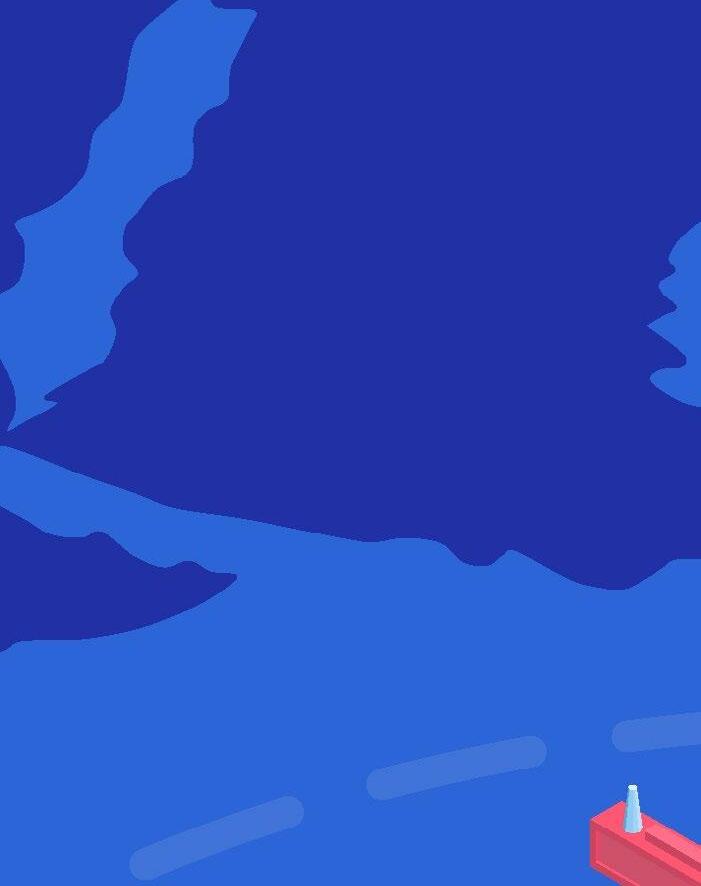
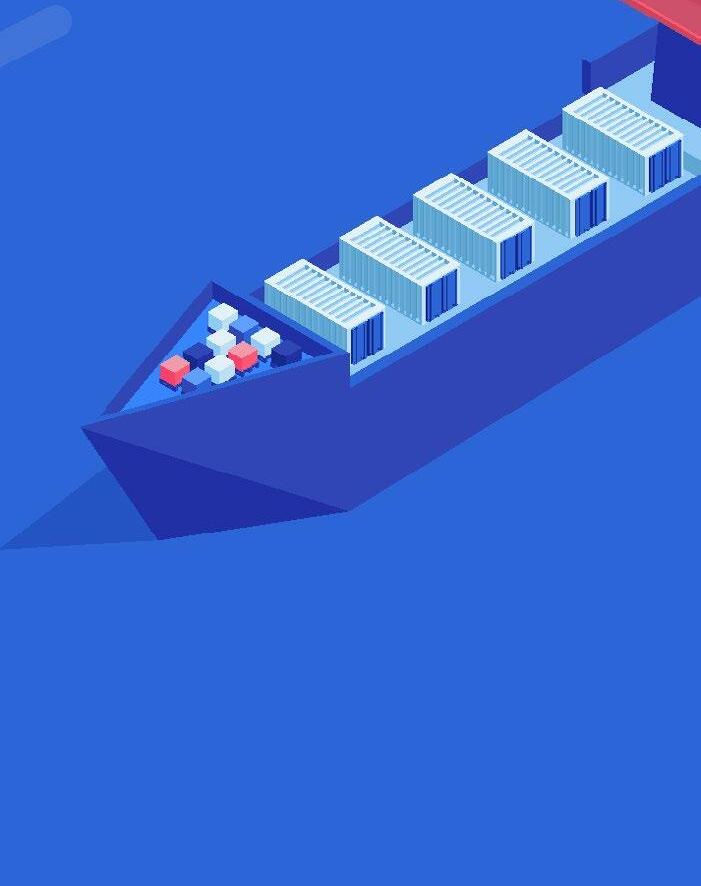
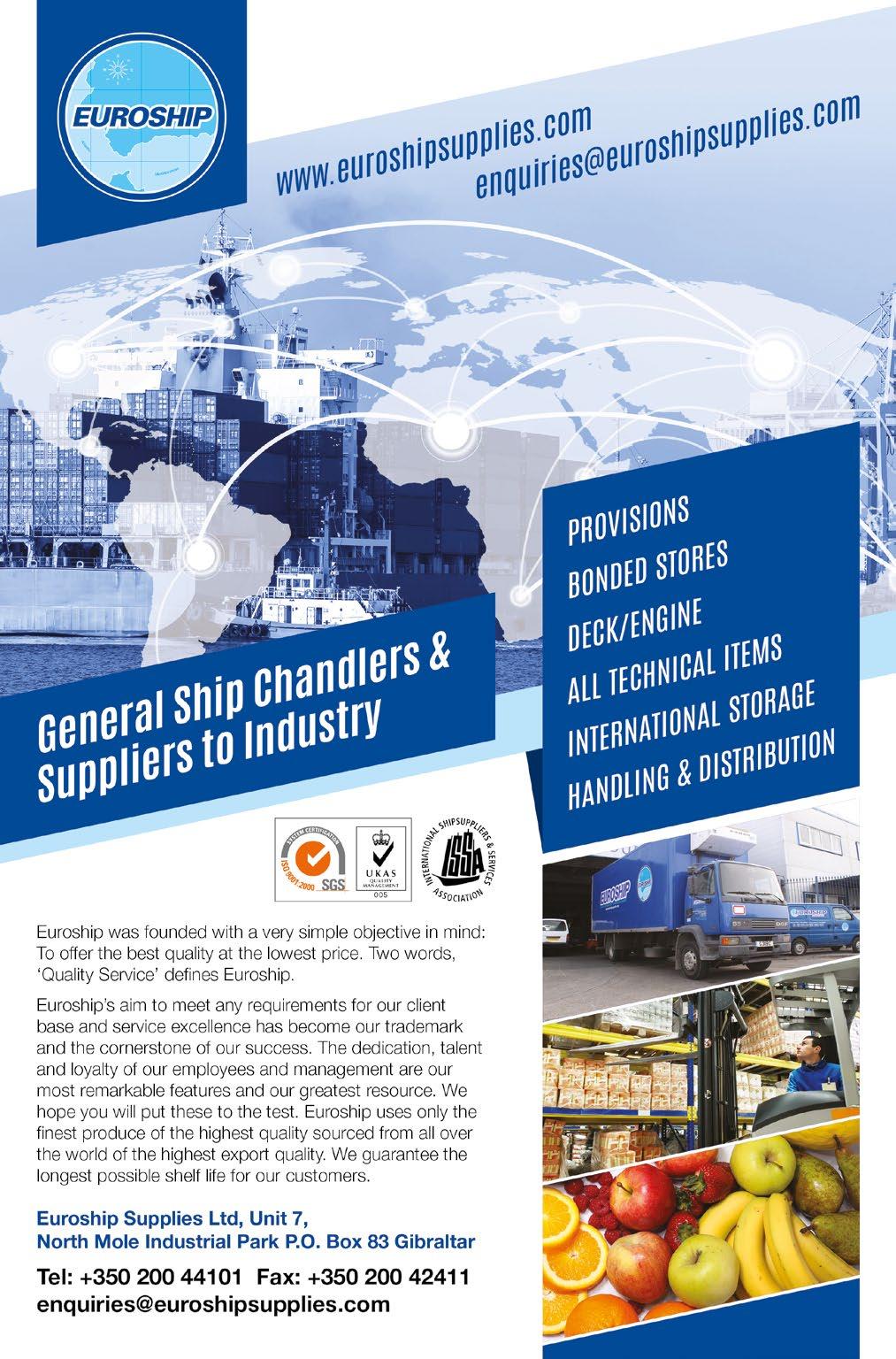


ECDIS, Charts & Navigation
24 | The Ship Supplier | Issue 85 2020






Pandemic ‘time-out’ results in sharp drop in pollution

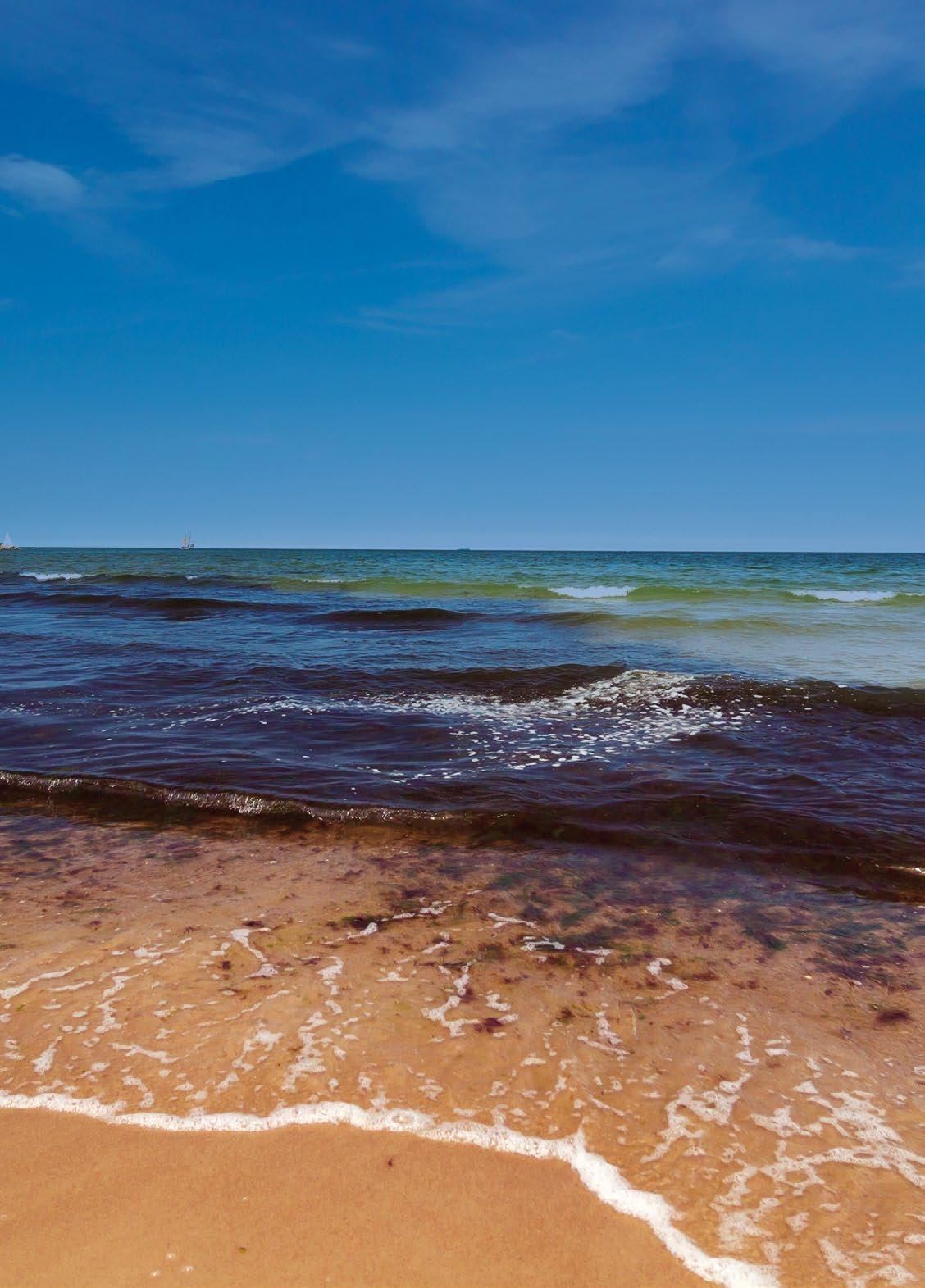

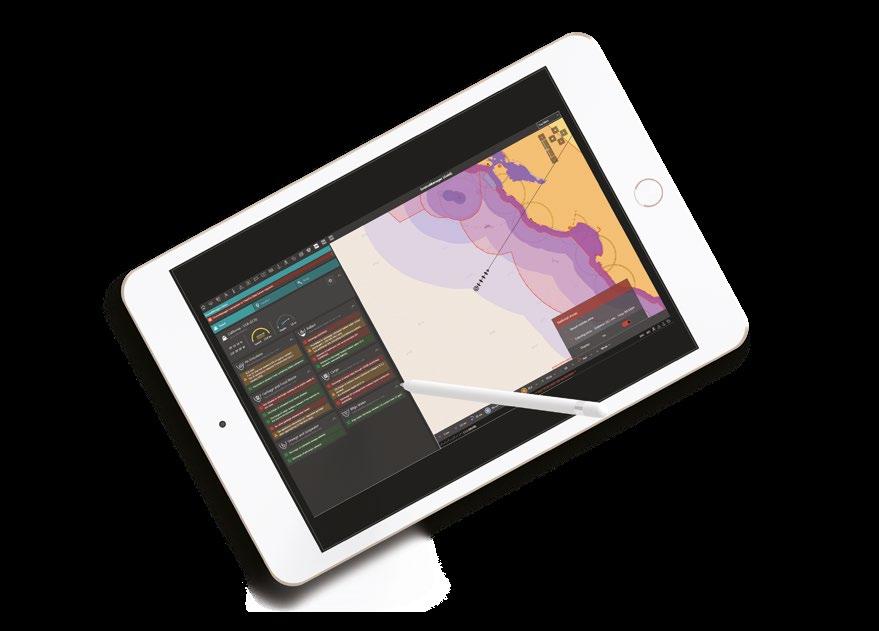

One of the precious few positives to have emerged from the COVID-19 pandemic is that the global lockdown measures have handed the world’s oceans something of a reprieve, says voyage solutions software provider OneOcean. The ‘time-out’ interlude has resulted in a swift and sharp drop in pollution levels.
What next? January 2021 marks the start of the UN Decade of Ocean Science for Sustainable Development and OneOcean says: “There can be no better coordinated and more high-profile time for shipping companies to be seen as proactive example setters in the application of green practices.

“Key to this essential, next-level evolution in environmentally responsible operations will be digital solutions which can provide an easy-to-use, costeffective means of ensuring fleetwide control and consistency in the sphere of regulatory compliance. This is the very issue which OneOcean’s EnviroManager tool has been created to address and simplify.”

As a central component of the single-solution OneOcean platform, EnviroManager is intended to cover a number of bases related to pollution at sea. By interfacing with a vessel’s GPS system, it presents the environmental regulatory data that crews require for any given area in real time, relevant to the vessel’s current position. u



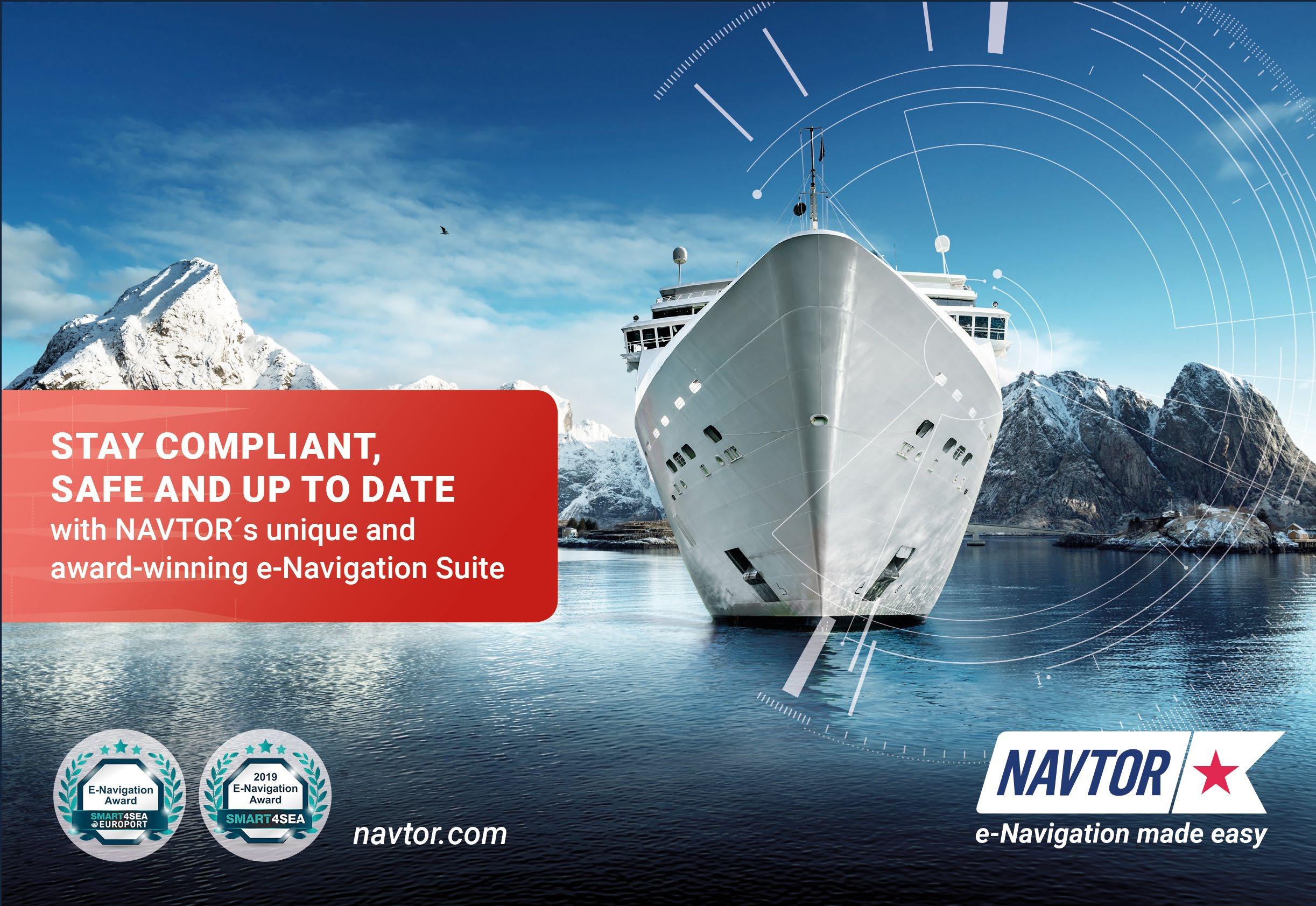
Green ISSA
First global standard for ship hull cleaning essential for marine ecosystems
BIMCO, the world’s largest shipping association, has moved a step closer to finishing a global set of guidelines needed to protect the marine environment from invasive species and reduce CO2 emissions.
Currently, there is no common global standard for cleaning ships’ hulls to avoid transferring invasive aquatic species, nor for the potentially damaging debris washed off in the process.
Every time one of the world’s 80,000 large merchant ships calls at a port, it brings foreign aquatic species on the submerged parts of the ship, also known as fouling. In a country like Australia alone, around 30,000 commercial port calls are carried out every year and if their hulls aren’t fairly clean organisms can move from one continent to another, transferring invasive species between marine environments and potentially harm local aquatic ecosystems. The organisms growing on the hull also increase drag and reduce fuel efficiency of the ship by as much as 35%, leading to higher fuel bills and more CO2 emissions.
BIMCO says to ensure that hull cleaning can be carried out in a safe and environmentally sustainable way in the future, a global standard is essential.
“The new in-water cleaning standard puts great emphasis on capturing what is removed from the ship, thereby ensuring that the marine environment is not negatively affected. We believe that a global standard will create much needed transparency along with economic and environmental benefits for ship owners, ports, port authorities and in-water cleaning companies,” said Aron Sørensen, BIMCO’s Head of Marine Environment.
He emphasised it is imperative that the cleaning can be done “in-water”, as there is limited availability of dry docks for very large ships, for example carrying iron ore or crude oil. In addition, the cost to deviate to docks in Asia and unload the ship is extremely high and the added trip to drydock adds to GHG emissions, which can be avoided if cleaning is done in-situ.
For ship owners, the lack of a common set of global rules creates economic and administrative headaches. Countries like

Australia and New Zealand, as well as regions such as Hawaii and California, have already implemented regulation on biofouling on ships arriving in their waters, or are in the process of doing so, as some of the first. But without a clear, international standard for cleaning, ports will have difficulty identifying which companies clean the ship hulls sufficiently and collect the debris that is washed off the ship to a satisfactory standard. And the same goes for ship owners.
“If you don’t have global standards, the ship owner can’t know if a supplier in one country – the in-water cleaning company –has done a good job. Furthermore, the port authorities lack a common method to evaluate in-water cleaning companies,” said Mr Sørensen.
BIMCO says a global standard will also reduce the risk to divers cleaning hulls, maintain the performance of the anti-fouling systems, and collect materials removed from the ship and thus reduce the pollution from heavy metals and paint flakes released into the ocean during underwater cleaning.
BIMCO’s aim is to make a standard that is acknowledged by the International Maritime Organization (IMO).
Mr Sørensen heads a working group that consists of ship owners, paint manufacturers and hull cleaning companies. The group recently sent the first draft of the cleaning standard to a reference group that includes scientists and government regulators. The next step is practical tests of the standard done with a hull cleaning company and a shipowner, which is scheduled to take place during 2020.
An approval standard will address minimum requirements on approving in-water cleaners based on testing verified by accredited laboratories and certificates issued by internationally recognized classification societies. A certificate based on an approval will show that the equipment and the procedures of inwater cleaners of good quality.
The approval standard is still under development and ultimately, BIMCO would ask IMO for adoption of the standard. Such a process would take two to three years. u
26 | The Ship Supplier | Issue 85 2020
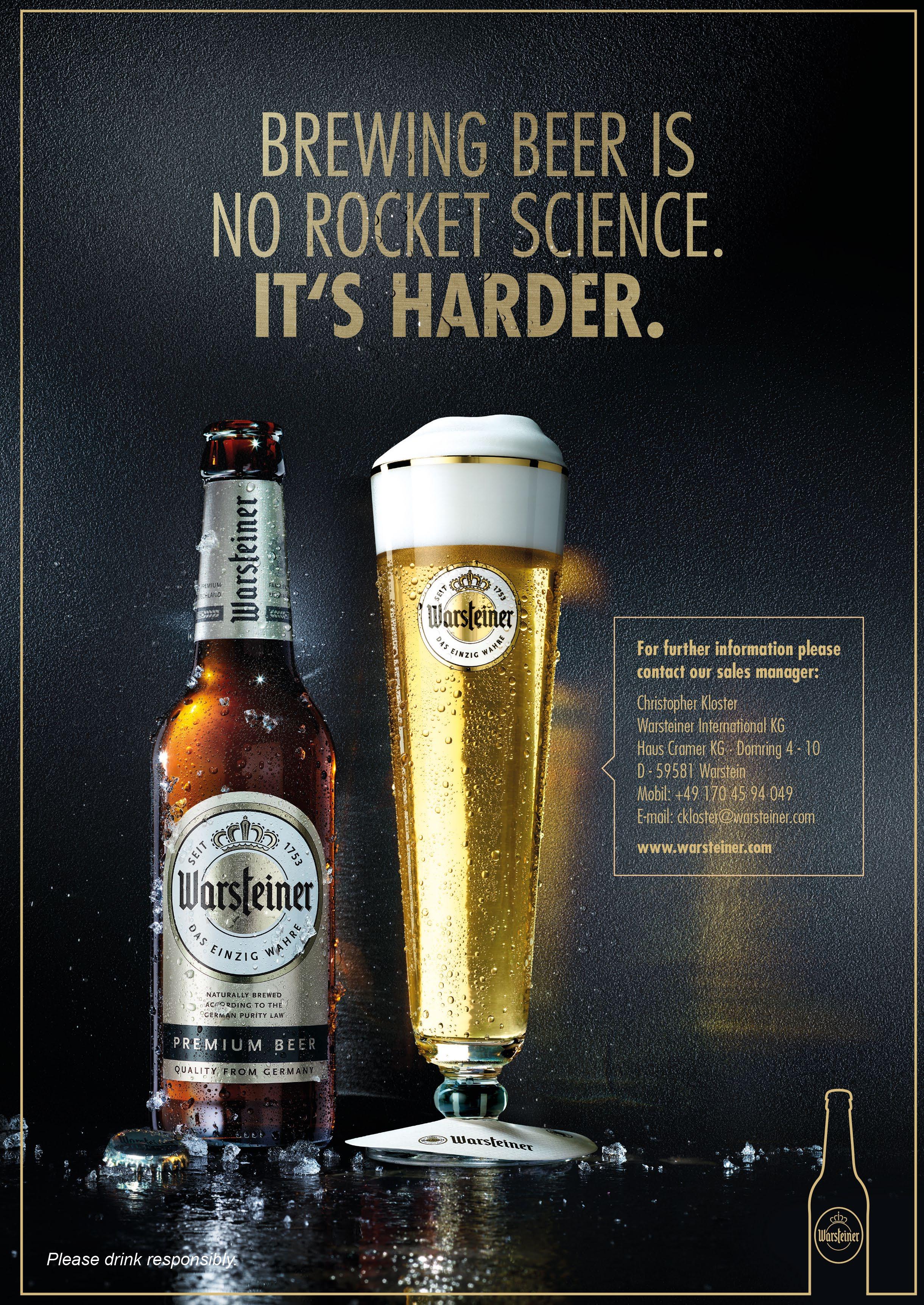

From the Buyer’s Desk
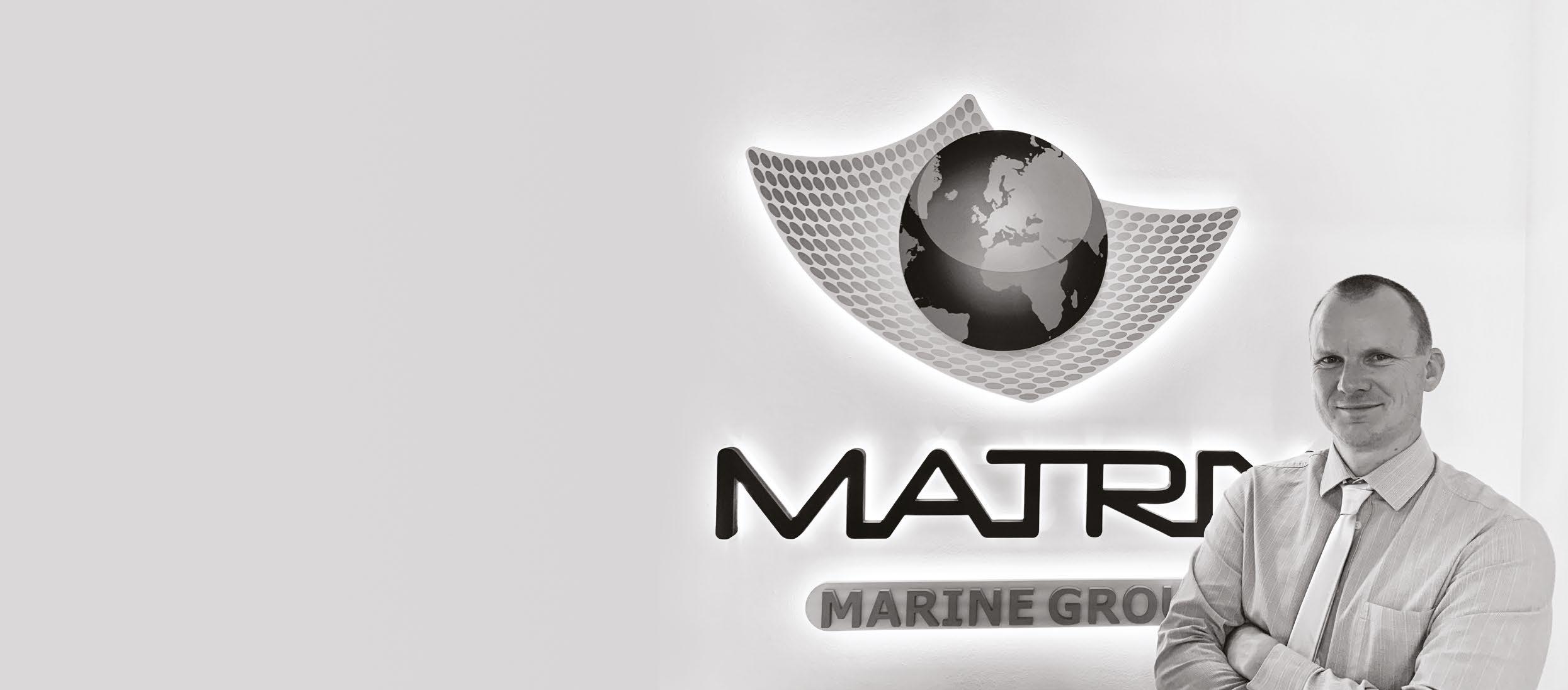 Mike Dobson, Commercial Director, Matrix Ship Management
Mike Dobson, Commercial Director, Matrix Ship Management
How important is it to build relationships with your suppliers and how do you choose who to buy fromwhat are you looking for in your ship suppliers?
It is always important to build relationships with suppliers as we need to be able to call on them at any time for assistance. We look for a supply of good quality products, original spare parts and reliable service at a competitive cost, of which delivery time, response time to enquiries and customer service are significant factors. When selecting service contractors, we insist on qualified and approved personnel who are specialised in the equipment that is being serviced, to ensure the owners vessels are looked after in the safest, most professional way possible.
Do you tend to stick to the same small number of suppliers or are you always looking at potential new sources of products and services?
We do have preferred suppliers, however we are always keen to identify new sources including recommendations made by the vessels and their associated Superintendents, new recommendations made to us locally and new contacts made at various trade meetings and forums globally throughout the year. Our policy of competitive quoting for a percentage of requisitions allows us to forge new relationships and benchmark existing suppliers. Product evaluation is always performed on receipt of the goods so any supply that is not up to standard would be highlighted and that supplier would be monitored for future performance.
What are some of the main issues you have with suppliers and please explain a little about each?
The biggest issue we face is the delay in receiving quotations. This is an ongoing battle for our purchasing team, but an issue we are looking to overcome through supplier feedback. Another issue is the delay in some orders being delivered onboard. We must chase suppliers frequently to ensure they are selecting the best delivery streams available. This situation has of course become more challenging with the current global pandemic as movement of goods and availability of services is severely limited due to travel restrictions, but this is a fluid situation that we are constantly evolving with to ensure delays are kept to a minimum.
Is cost still a major factor in who you use or do you place a higher importance on others such as quality, business relationships etc and what do you look for when buying supplies?
Of course, the bottom line is always looked at, but delivery time and product quality can be equally as important. We will sometimes go with a certain supplier who was reliable in a previous supply for specific machinery, but this is decided on a case by case basis to ensure the best product at the best price is delivered as quickly as possible to keep the owners vessels running efficiently and reliably.
How has procurement changed at your company in recent times?
A lot more sources are now found online and can be a benefit to turning their quotes around more quickly. We have invested significantly in our supply chain management systems and are now operating on an efficient digital solution. The system allows us to process the supply chain more effectively, handling greater volumes, with greater efficiency whilst making oversight and audits easier too.
How sophisticated should 21st century ship supply become and how has technology moved things along?
I suspect in the future there will be more online hubs where requests can be entered, and a host of suppliers will come back and place offers. Technology has certainly moved things along in terms of sourcing suppliers as many are now available on the internet as well as various online catalogues of suppliers for the marine industry also being available. There are a number of online portals already in place to assist purchasing departments with the entire ordering process, but their supplier pools are not quite fully integrated. Potentially within a few years these systems will be extremely useful.
Please give me a brief overview of how many vessels you look after in terms of supply?
Matrix are proud to look after the full management of a fleet of modern Ro-Pax vessels and HSC, operating in Northern Europe. As part of that management service, Matrix coordinate all the of the supplies to the vessels across the six major ports that they call at.
Matrix Ship Management is a customer centric ship manager, with a young dynamic workforce, offering both mainstream and bespoke solutions to ship owners at a very competitive cost. u
Issue 85 2020 | The Ship Supplier | 29
Coronavirus will cause backlog for ballast water solutions
Despite the coronavirus crisis, some ship owners are still pushing ahead with their plans for compliance with the Ballast Water Management Convention.
Though compliance has been a slow journey, Tore Andersen, Executive Vice President of Optimarin, the Norwegian company which produced the Ballast Water Treatment System in the world, says his team has been able to carry on working thanks to digitalisation.
Optimarin trained all of its service people on Skype at
“
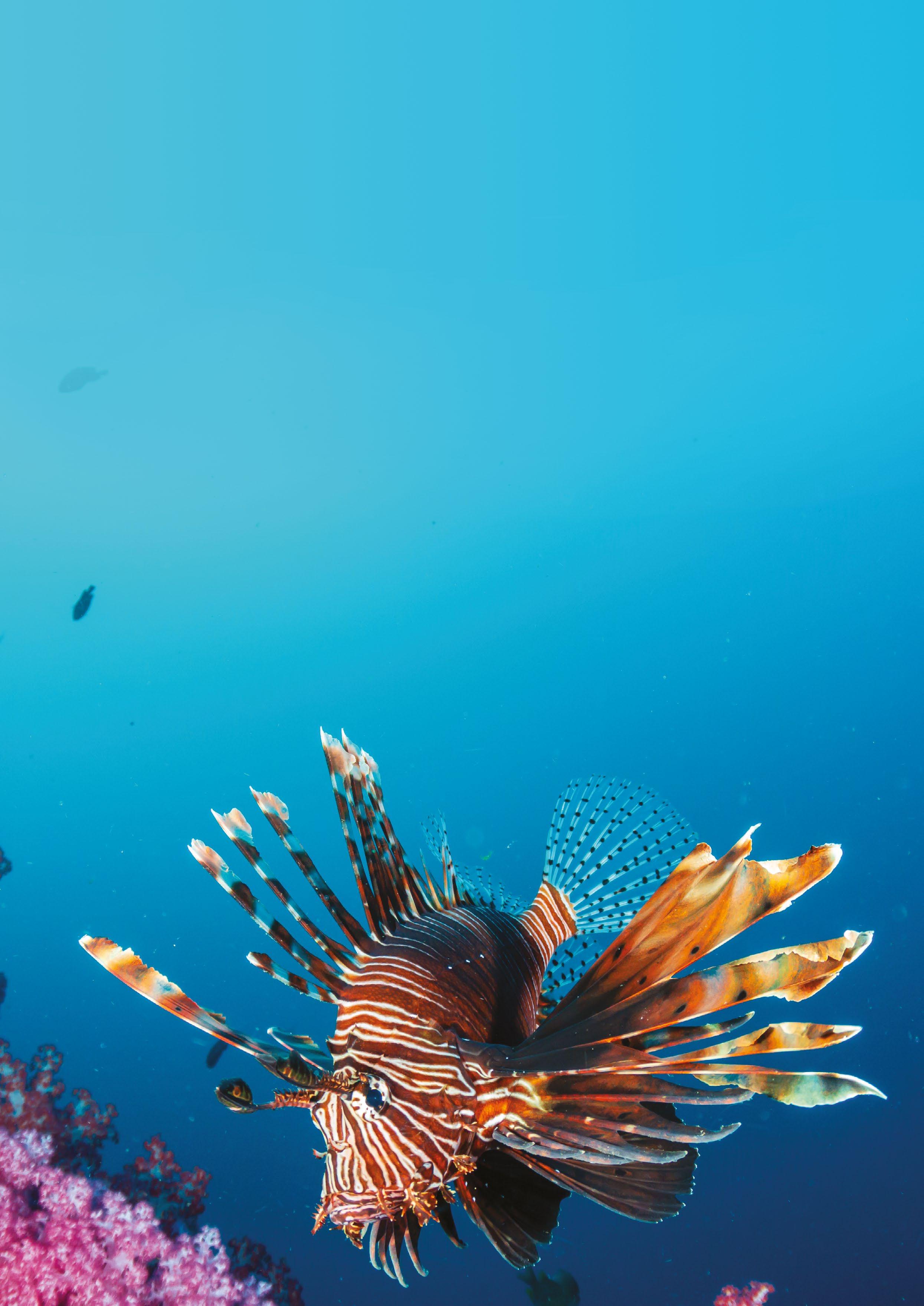
the beginning of the pandemic and it has also devised internet training so all crew members can go on its online training programme to understand about ballast water, what they should be doing and how to use the system and maintain it.
Mr Andersen believes the current predicament has been a game-changer for the industry in terms of digitalisation. “It has opened up a lot of eyes and people of my generation who say they are not ready for this….I think a lot of people have been forced into digitalisation and that is good,” he said.
I think a lot of people have been forced into digitalisation and that is good
Tore Andersen, Executive Vice President of Optimarin
”
Ballast Water
30 | The Ship Supplier | Issue 85 2020
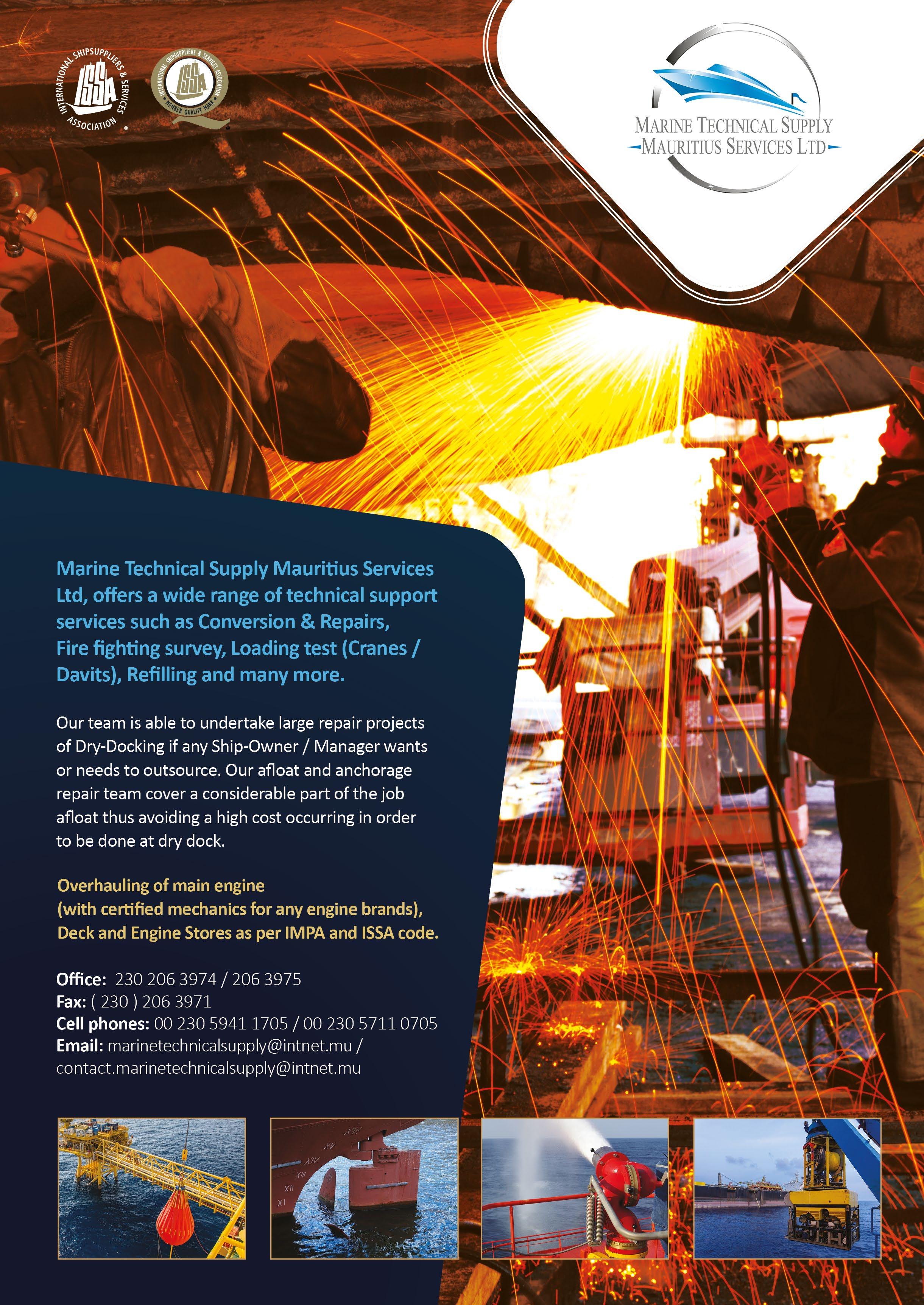
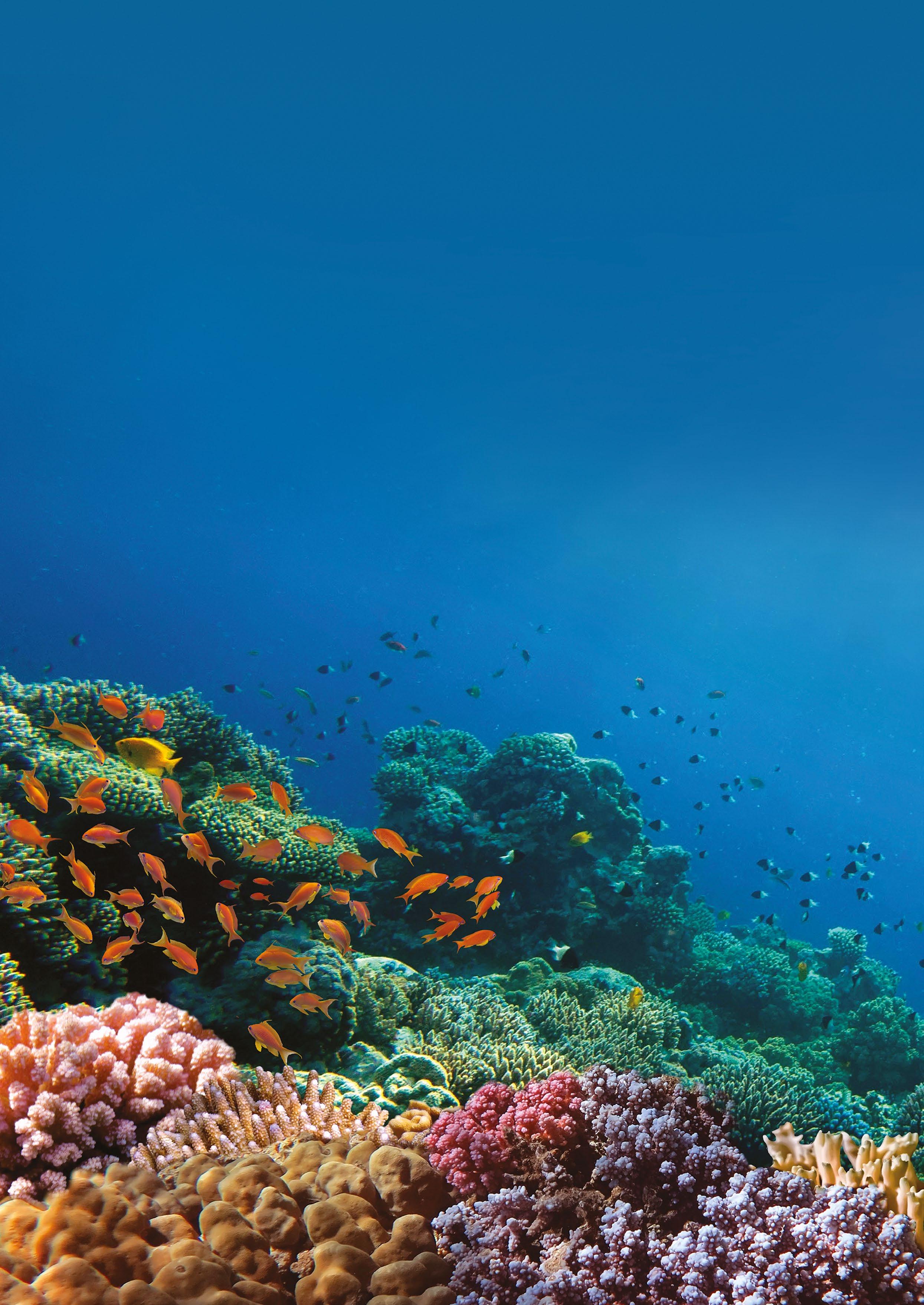
Optimarin is also now making it easier for cash-conscious owners to meet the regulatory requirements by offering a leasing option which allows owners to install a BWTS without a large capital outlay.
The company, which has installed around 600 BWTS units since its formation in 1994, recently partnered with a UKbased finance company to offer customers the chance to split payments into manageable monthly costs over three years.
Mr Andersen said he expected the option to be popular as it would be easier than going to the bank for funding.
“It can be a solution for people that really need a system but do not have the cash right now. We want to make BWT compliance easy for everyone. And this is a major step forward in enabling that ambition.”
The BWM Convention aims to protect marine ecosystems by requiring ships to manage their ballast water so that harmful aquatic organisms and pathogens are removed or rendered harmless before the ballast water is released into a new location. This helps prevent the spread of invasive species - as well as potentially harmful pathogens.
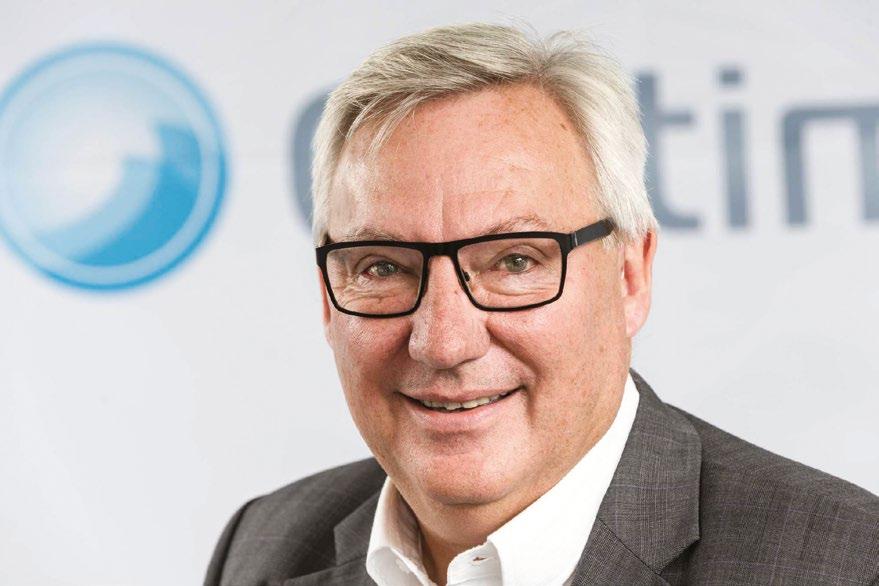
The BWM Convention entered into force in 2017 and now has 83 Parties, representing 90.98% of the gross tonnage of the world’s merchant shipping, up from 81.83% previously. Since the entry into force requirements for the treaty were met in September 2016, there have been some 30 ratifications, with
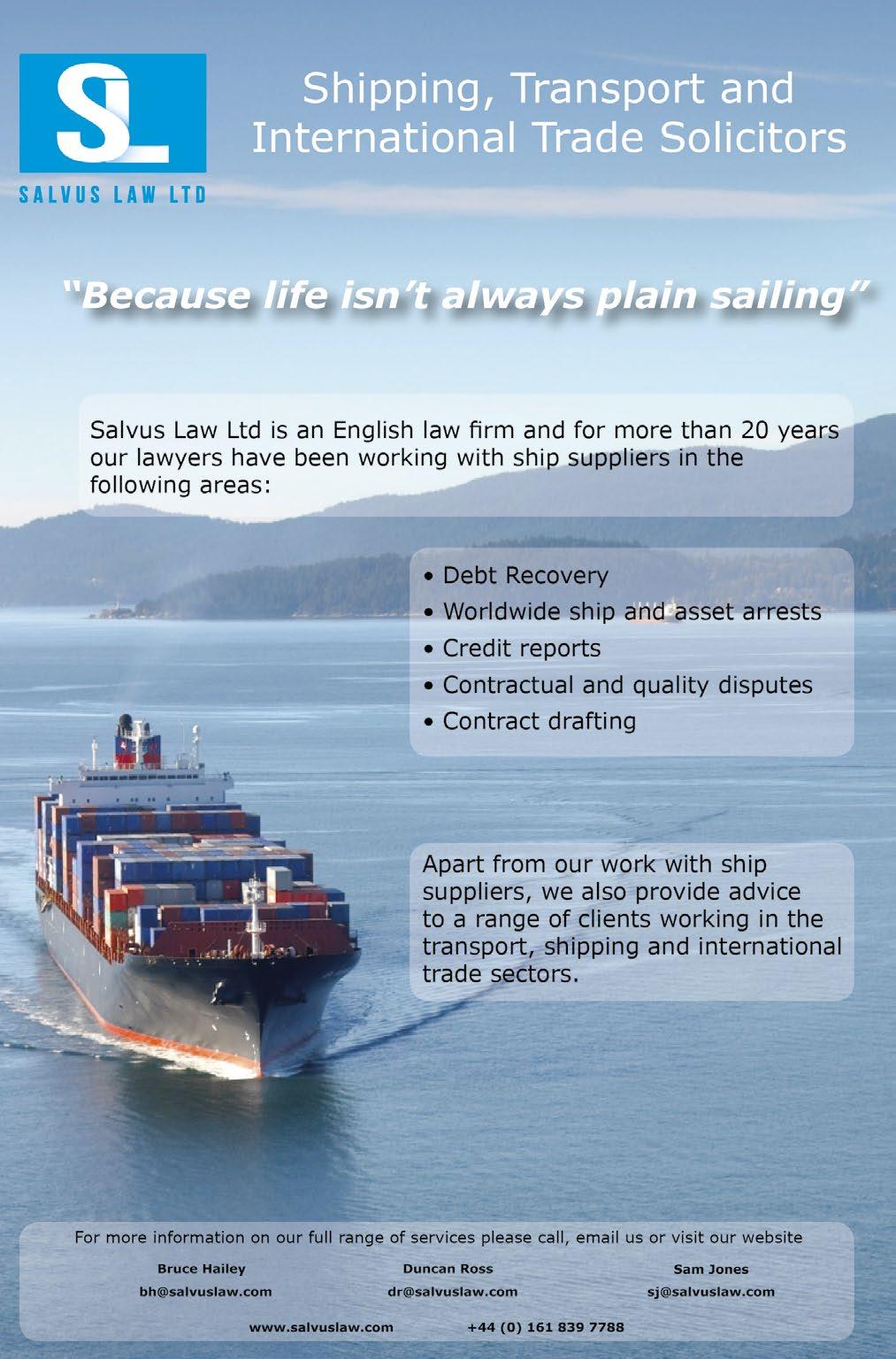
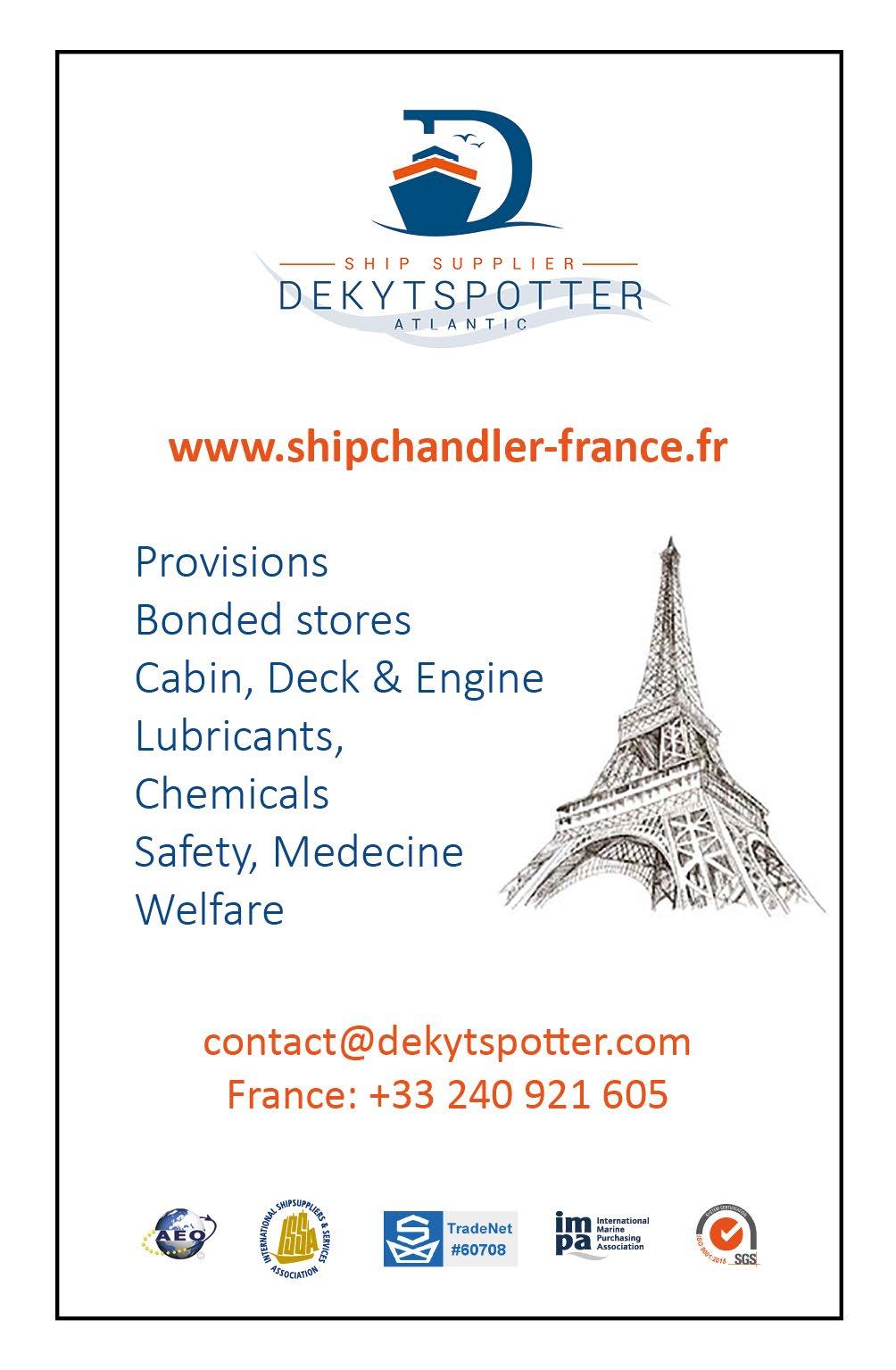
Ballast Water
32 | The Ship Supplier | Issue 85 2020
Tore Andersen, Executive Vice President of Optimarin
the percentage of world merchant shipping tonnage covered increasing considerably, from 35.14% to 90.98%. Following China’s extension of the treaty to the Hong Kong Special Administrative Region recently, ships flagged to Hong Kong, China - the fourth largest flag Administration in the world by shipping tonnage - will be required to apply the requirements of the Ballast Water Management Convention (BWM).
China notified the International Maritime Organization (IMO) in May that the Government of the People’s Republic of China has extended the BWM Convention to the Hong Kong Special Administrative Region, with effect from 13th August 2020.
Optimarin has sold 1,000 of its BWTS units so far – the first being in 2000 - but Mr Andersen says it has been a slow process with owners and operators only recently starting to make the investment, and while the first quarter of this year has been buoyant, COVID-19 will undoubtedly now affect the figures.
Mr Andersen explained: “It has been a slow journey. Ratification was expected in 2017 but then was delayed for two years and now the virus has come.
He added: “What we have seen, and what we believe, is that the big wave should start this year and end in 2023 but this will probably now be a bit flatter and longer since the US Coast Guard, for example, are now giving 12 months’ extension because of the virus, if you need it.
“Look at the oil industry where the prices are down. This means all the offshore related ships are suffering and the tankers are filled up with oil, so it will have an impact and, of course, if you can delay or move this installation you will not escape but you can do it one year later.”
He predicts this will cause a backlog but says what Optimarin has been quite good at is not growing faster than the orders that are coming in. Before the Covid-19 crisis, it has increased staffing by 30% in the last 12 months and Mr Andersen believes they will add more people every quarter when the pandemic is through. He also says that while numbers will most probably not be as planned, the business is still very healthy as it had a good base from last year. u
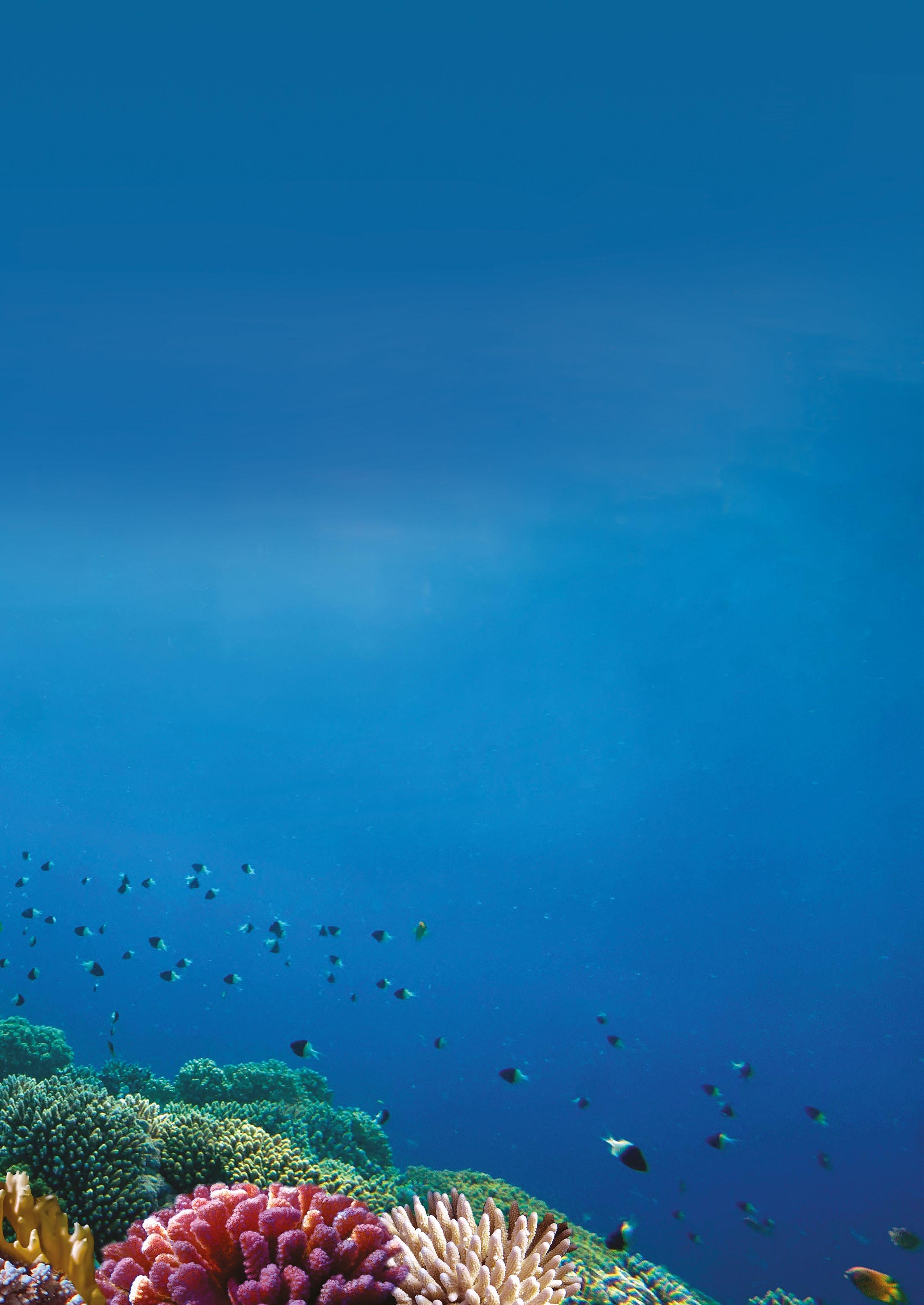
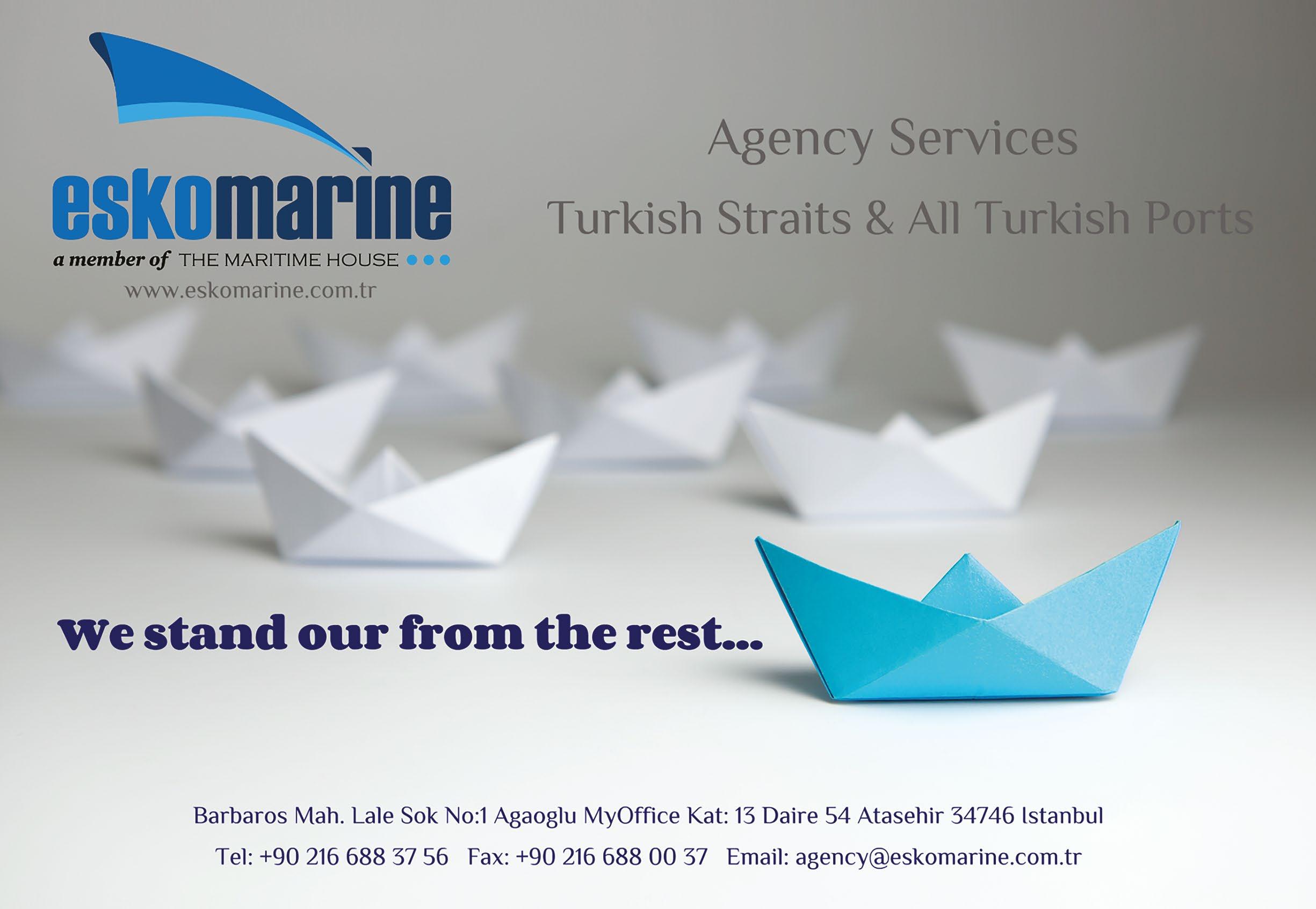
Ballast Water
From the Brig Consider agreements with purchasing groups carefully
By ISSA’s legal expert Bruce Hailey

There is a growing trend for “purchasing groups”, which predominantly serve vessels managed by companies within their group.
They market themselves as harnessing the purchasing power of their membership to ensure the best pricing and service for that membership. Essentially, they claim to exist for the benefit of the ship owners that are managed by the members of their purchasing group. It is said the owners can be assured of best value.
Towards suppliers, they explain they can bring a significant volume of business, by marketing the suppliers to the members of their group. All that they want from suppliers in return is a commission, volume discounts based upon annual turnover and good service.
In some cases, it is said that the volume discounts are returned to the members - whether the members pass on those discounts to the ship owners is unclear.
Cynics might suggest these purchasing groups simply add an additional layer of cost, which is ultimately reflected in higher (not lower) prices paid by the end user ship owners.
Our experiences show suppliers are asked to sign agreements that can be prejudicial to them in the event the owner does not pay what is due. These agreements absolve everyone but the owner from responsibility for payment and impose conditions upon the supplier that make collections from the owner more difficult.
Anecdotal evidence suggests these arrangements may contribute to a culture where the suppliers’ exposure to default and bad debt is disregarded, with supplies ordered in the knowledge
that the manager is not properly funded and that the owner is in financial difficulty and quite likely not to pay. The agreements may even oblige suppliers to supply all the vessels of members, therefore forcing suppliers to supply owners who are well known to be poor performers.
The message here is that these purchasing agreements are not designed for the benefit of the supplier (or arguably the ship owner). In return for a potentially larger share of business (or simply to maintain existing business) suppliers are required to give up many of the protections afforded to them by, for example, the ISSA Conditions of Sale, and to pay commission and rebates.
Agreements should be considered carefully. Suppliers are free to negotiate the terms of these agreements and should not be hesitant in doing so. Suppliers should be clear about when commissions become due, with suppliers being careful to ensure unpaid invoices do not count in the calculation of commissions or rebates. Suppliers ought to avoid provisions that require them to supply all members’ vessels – there ought to be a right to decline business without any repercussions.
Suppliers should be careful not to restrict their rights to take action against owners and vessels in convenient jurisdictions and to consider carefully whether the manager should be jointly liable for the orders they place. At the very least, there ought to be a commitment from the manager to provide sufficient information about their ship owner client that you can make an informed decision on whether to supply on credit. u
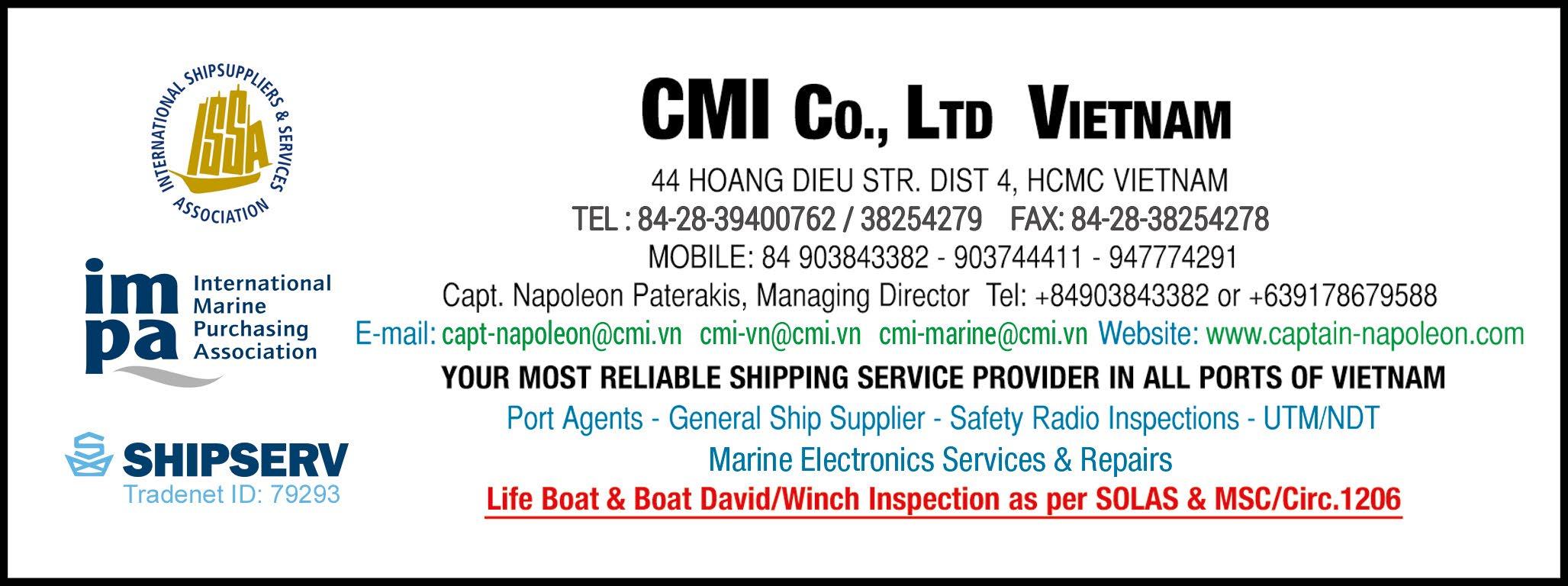
34 | The Ship Supplier | Issue 85 2020
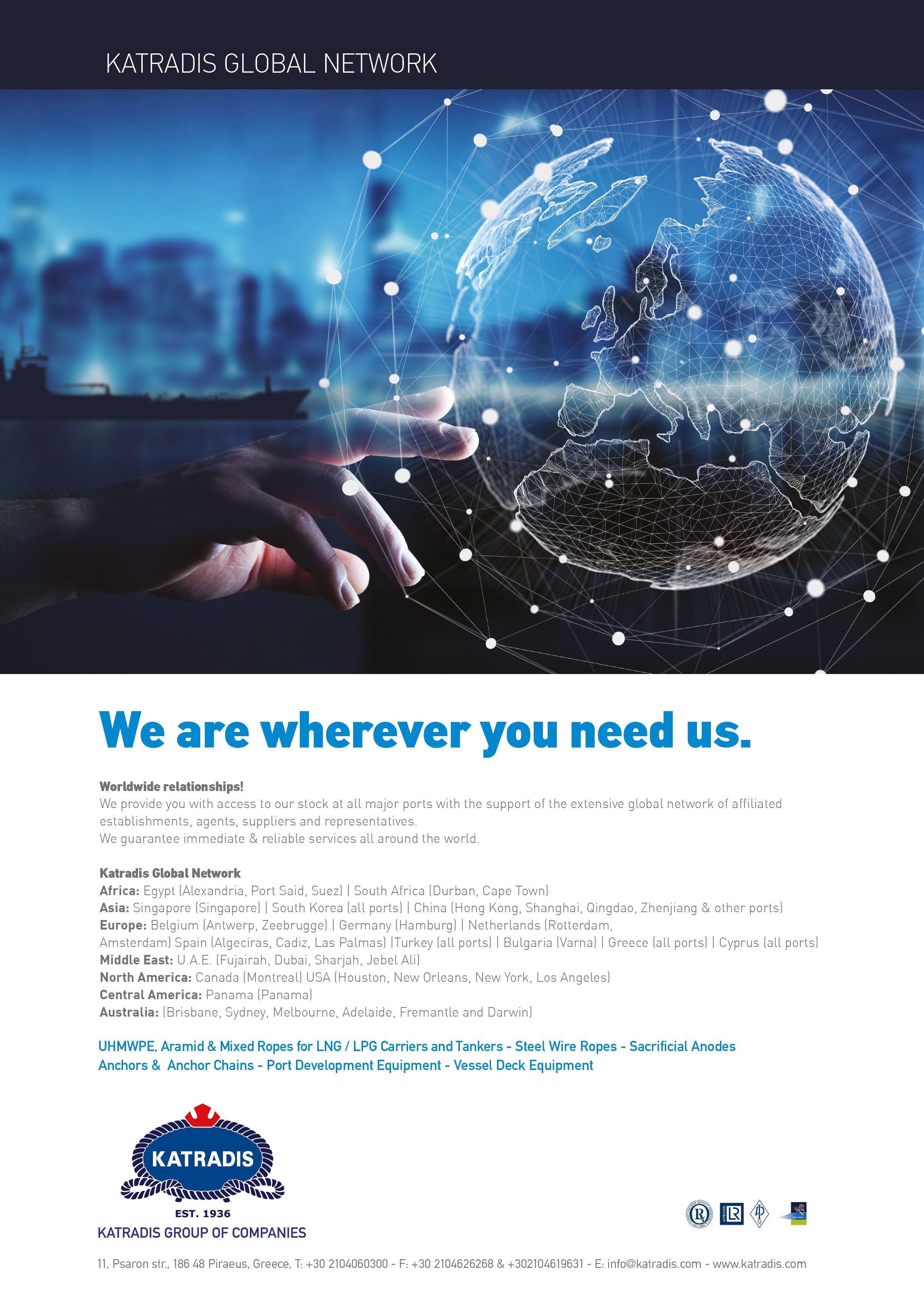
How Portuguese Casa Angola Shipchandlers has successfully dealt with the coronavirus crisis
Despite an elderly population and underfunded health system, Portugal has managed better than most to limit the damage caused by the coranavirus. Mainland Europe’s most westerly nation registered its first coronavirus cases on 2nd March, a month after the disease appeared in Italy and Spain.
At that moment the alarms went off immediately at Casa Angola, and the time lag allowed the company to learn from its neighbours and introduce countermeasures before the virus took a grip.
Casa Angola’s business has been on the frontline, supplying all essential needs to vessels’ crew, and it has had to adapt its business model to face the new pandemic of COVID-19.
Long before the state of emergency declared on 18th March, putting Portugal on lockdown, the company had already implemented a contingency plan to protect its business and people from COVID-19.
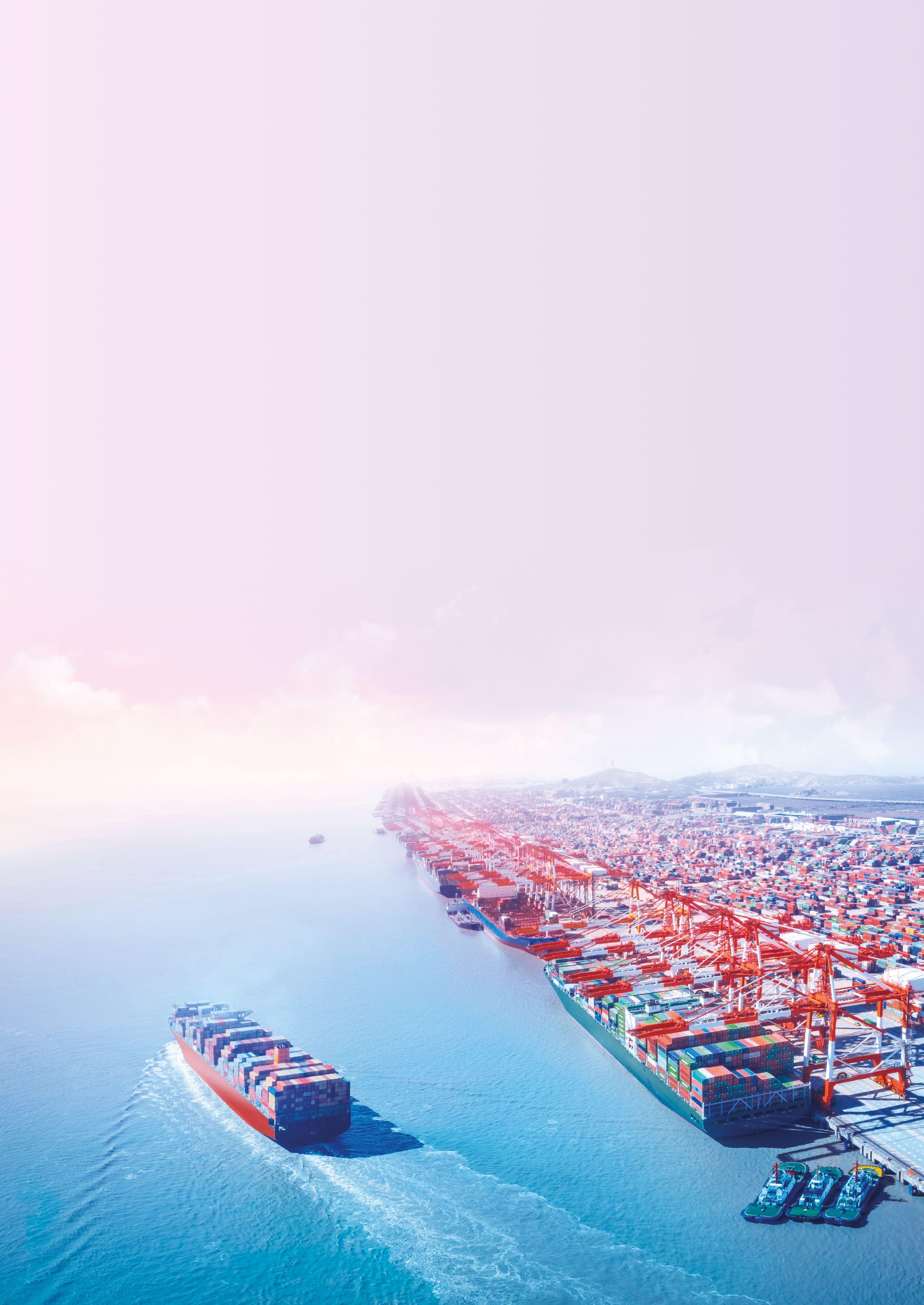
Since April, all visits and face-to-face meetings have been suspended indefinitely, rotation teams and work-at-home have been prepared, and personal protective equipment (PPE) kits distributed daily. The cleaning and sanitising of the facilities, including warehouse and fleet was reinforced by outsourcing a specialised company.
Rui Moreira, CEO of Casa Angola, told The Ship Supplier that it was essential “to keep our staff duly motivated and avoid panic, that all measures taken were science-based, justified and supported by World Health Organization (WHO)”. Filtering misinformation or fake news was key to understand how to deal and fight the virus.
This coronavirus crisis highlighted the challenge of protecting the health either of staff
Advertorial: Casa Angloa 36 | The Ship Supplier | Issue 85 2020
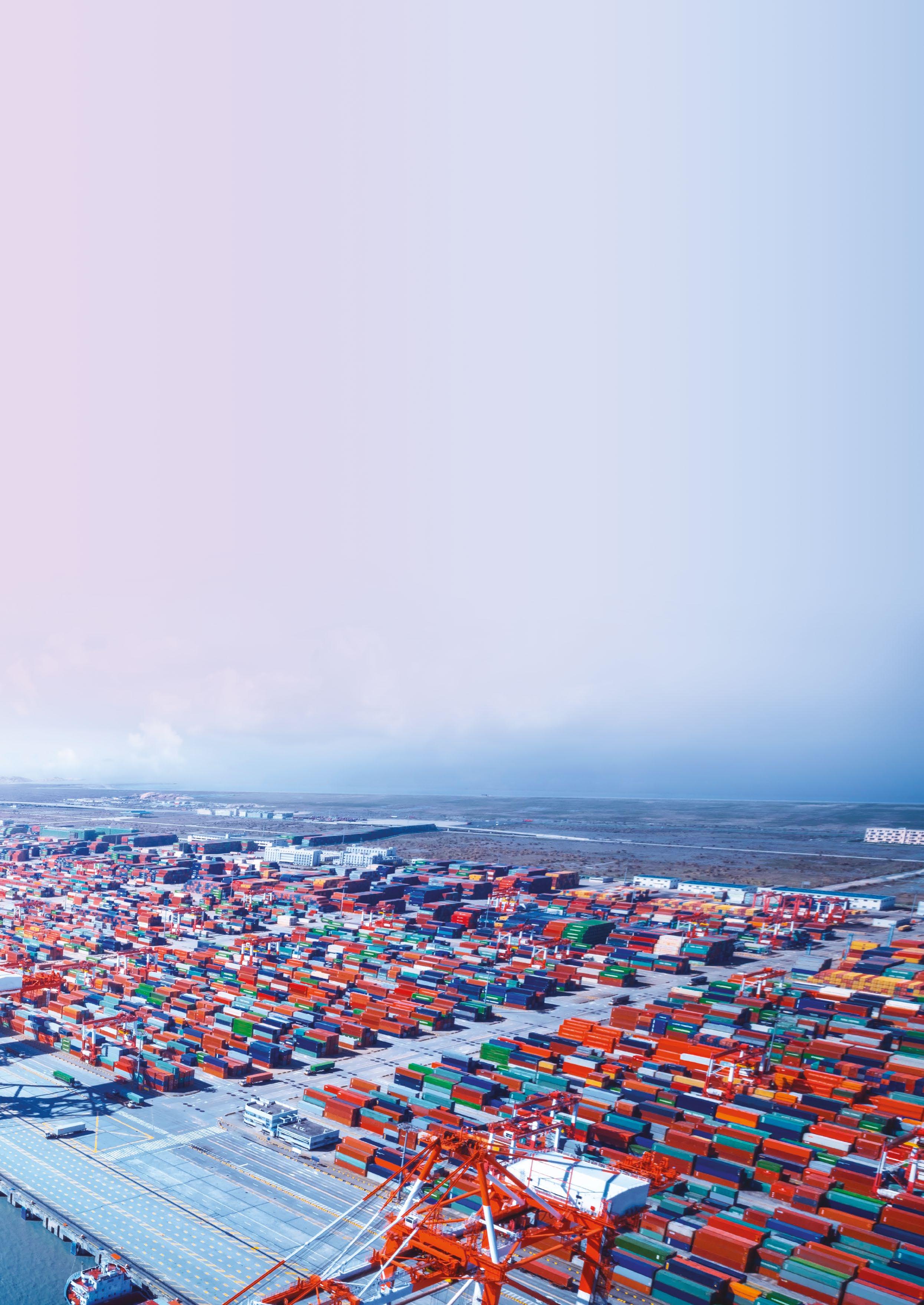
and their families, friends, suppliers and clients whilst avoiding disruptions to the delivery of essential goods as food, medicines or personal protective equipment. As a proactive commitment to the entire supply chain, the contingency plan was extended to key suppliers in order to avoid shortages. Local companies were selected, just in case of any disruptions in free movement of persons or goods.
During this period Casa Angola strengthened its cooperation with local and European authorities in order to permanently update information, and anticipate, whenever possible, its methods and procedures. Fernando Pinto, company board member, is a permanent member of OCEAN (Organisation de la Communauté Européenne des Avitailleurs de Navires) regarding WG - Customs & Taxation, which has allowed the company to be kept in a close contact with the European customs legislation trends that could affect the ship supply business.
Casa Angola Shipchandlers is a Portuguese family-owned and awarded SME, established in 1932, which has been serving the shipping industry for 88 years. It’s a clientoriented company with highly motivated teams, that claim to warranty the delivery of the right products at the right place.
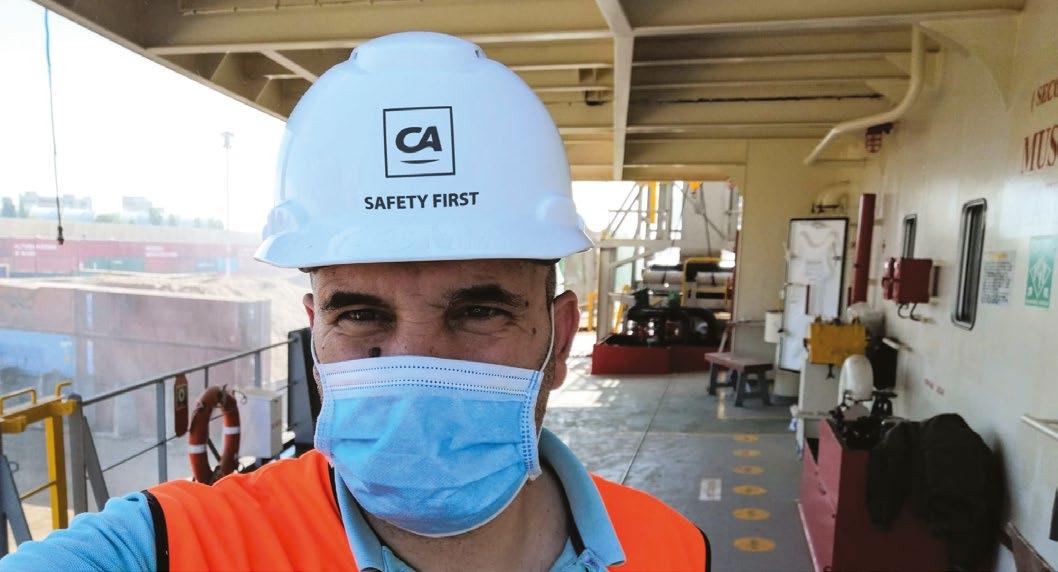
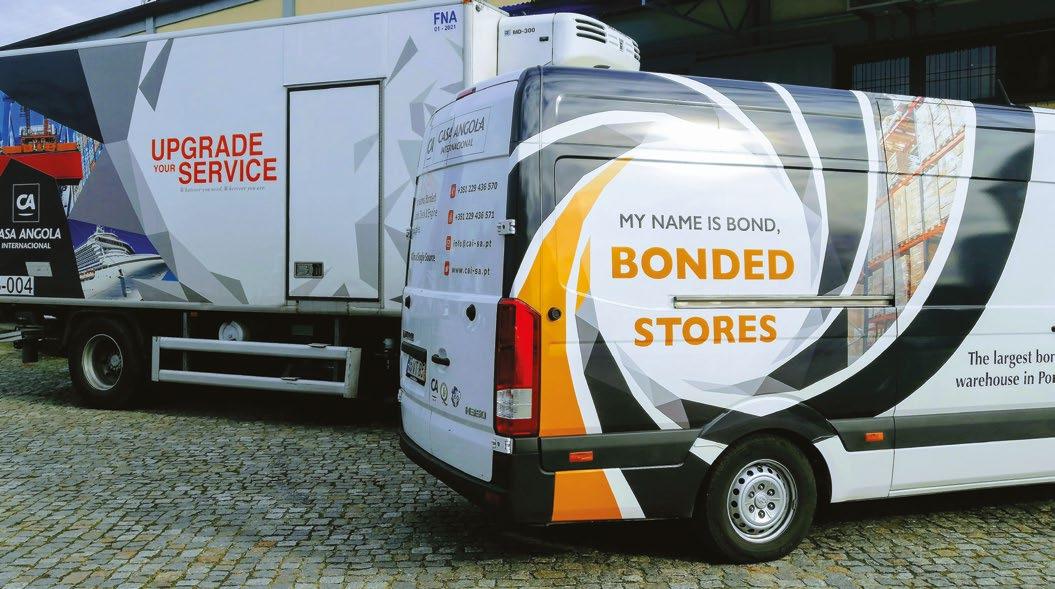
As a general supplier it offers a comprehensive range of service for the shipping industry which is recognised and in demand worldwide. It is able to provide any general equipment that a marine vessel requires to successfully operate, as well as Food, Bonded, Cabin, Deck & Engine supplies - all in a single source.
The service includes the procurement and supply of a wide range of products and goods, including perishables, groceries, dairy, meat & poultry, seafood, beverages & drinks, spirits, confectionery, tobacco, home & personal care. It is also able to provide combined consignments of frozen, chilled and dry cargo directly to the required destination, including offshore supplies; all in accordance with the best practices for the marine industry such us ISSA Quality Standards, NP EN ISO 9001:2015, HACCP (Hazard Analysis and Critical Control Point) and AEO (Authorised Economic Operator F).
With a focus on efficiency and effectiveness, the importance of speed in the shipping world is highlighted, Casa Angola’s logistics and reliability in prompt delivery is the guarantee that the vessel can set sail as soon as possible. u
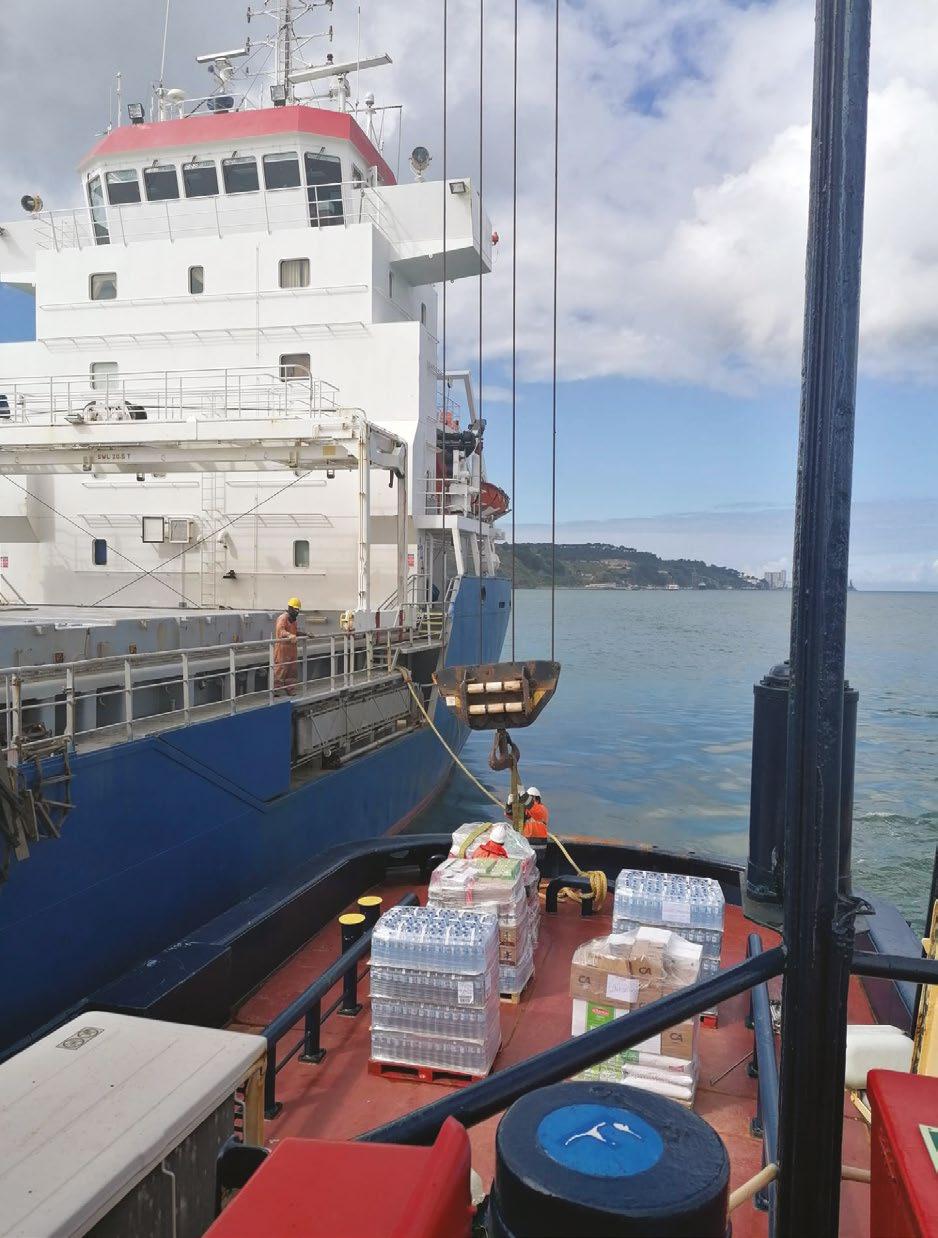
Advertorial:
Issue 85 2020 | The Ship Supplier | 37
Casa Angloa
Order pyrotechnic products early amid potential SOLAS expiry date extensions Medical & Safety Supply

Companies are being warned to order pyrotechnic products ahead of their expiry dates, following the updated guidance of certification of goods for seafarers released by the International Maritime Organization (IMO), in response to the ongoing COVID-19 situation.
WesCom Signal and Rescue, a global supplier of marine distress signals which has been manufacturing world-class pyrotechnics for more than 100 years, stressed the importance of forward planning for the ordering of pyrotechnics and other dated, mandated items, to mitigate any possible supply delays in the future.
Currently, there are no problems for WesCom Signal and Rescue with the manufacture of its safety distress signals and the team continues to work closely with its global network of distributors.
Only where absolutely necessary, extensions to expiry dates of pyrotechnics will be made at the discretion of the local maritime authority and will only be considered where availability is a problem for a particular vessel. The extension may be granted for a month at a time to enable the vessel to reach a port where supply can be replenished; but not beyond
four years after the date of manufacture, marked on the product.
Keith Bradford, Product & Customer Service Manager for WesCom Signal and Rescue, said: “We do not currently foresee any problems with availability, but due to the unknown climate we are all in, we strongly recommend working with customers to replace earlier than originally planned. Health and safety is, and will always be, of paramount importance to WesCom Signal and Recue and its suppliers around the world, and we urge seafarers to remain compliant at all times.”
The firm whole-heartedly advises seafarers to keep updated with current regulations to stay compliant, and to only use quality suppliers and equipment, and certified service partners.
WesCom Signal and Rescue’s business operations will continue unchanged, manufacturing and marketing its brands: Comet, Pains Wessex, Oroquieta and Aurora exactly as before. It is world renowned for its marine safety equipment and is trusted by the world’s navies, lifeboat and rescue services, merchant fleets and airlines, as well as by fishing vessels and leisure craft. u
38 | The Ship Supplier | Issue 85 2020
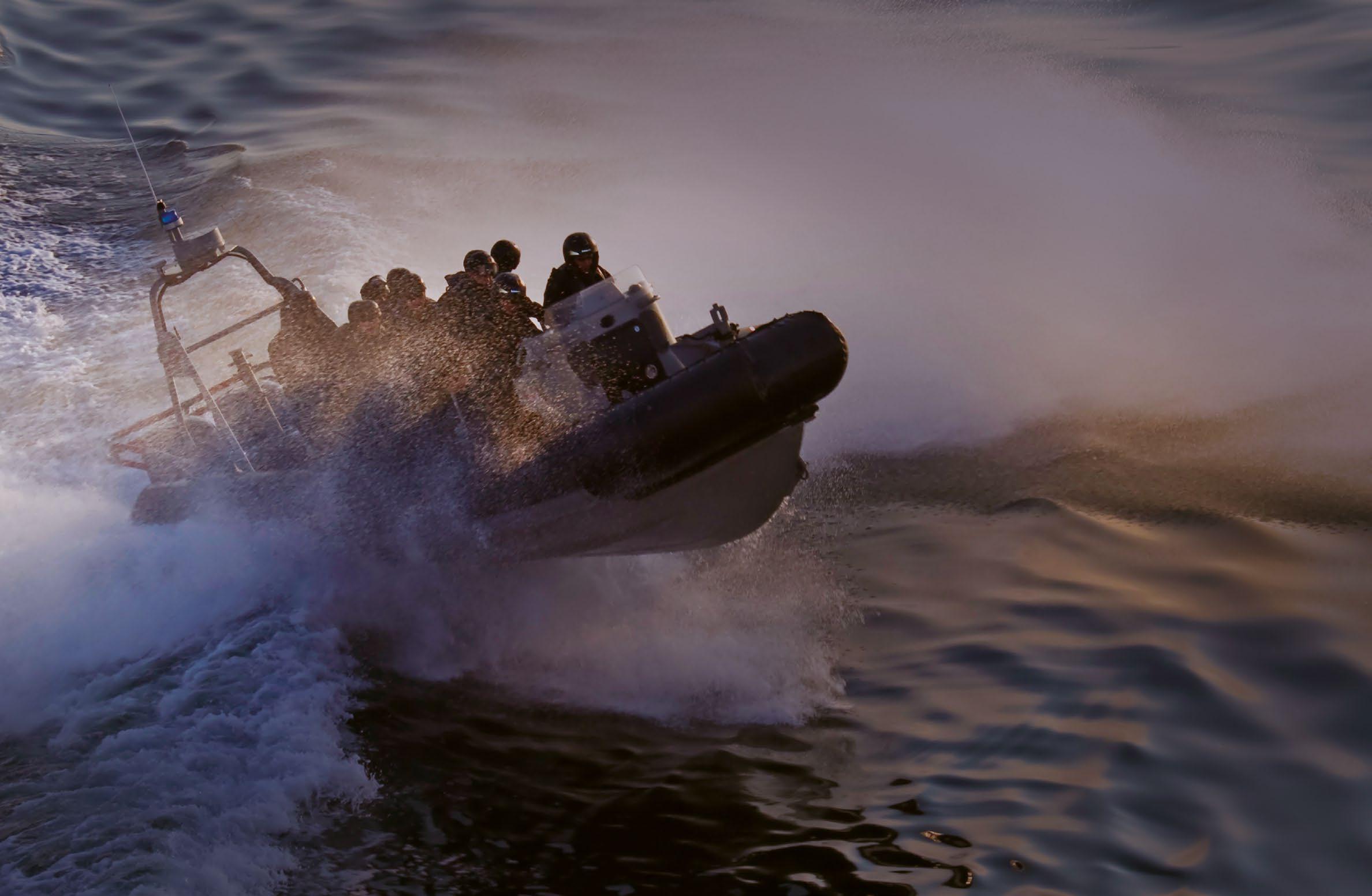
The importance of ballistic protection onboard
The development of marine safety and security equipment is critical in ensuring maritime and commercial vessels have the most advanced and technical systems onboard, to protect both crew and boats
That’s according to Air Sea Land Group (ASL GRP) which states that today, security measures come in many forms, from technical and computerised systems to marine signalling devices onboard, alongside an expert team based on land to monitor and detect potential threats.
It says that another option, which is perhaps overlooked in some cases, is ballistic protection.
Ballistic protection (bullet or projectile-resistant) is a versatile addition to a vessel’s security and can be made bespoke to a customer’s needs. Add-on or applique armour is generally a flat panel system that is attached to the exterior of a vessel.
Armour panels can also be integrated into the inner walls of a vessel, hidden behind the interior and insulation. Typically armour
panels would be mounted between the steel or aluminium outer skin and the inner finish. This type of ballistic protection is also recommended for use in designated areas where there is higher traffic or points of vulnerability, for example on the bridge deck, in the engine rooms, master suite and crew areas. A round of ammunition can pierce several layers of marine steel and other obstacles, so both the deck and the deckhead have to be taken into account to cover opportunistic angled shots that may, for example, have been fired from the quayside.
Another option for ballistic protection is for it to be incorporated into the lay up of a new build during the initial design phase. Naval architects and designers take into account the weights and strains required for armour systems, and adapt designs accordingly.
Depending on the use of the vessel, or the predicted threat the vessel and crew need to be protected against, armour systems can offer levels of protection against a range of weapons. From handgun rounds, sniper rifle
ammunition to high-powered armour piercing rounds.
Armour protection systems are rated to STANAG levels, which is a NATO Standardisation Agreement covering the standards for the “Protection Levels for Occupants of Logistic and Light Armoured Vehicles.”
In the commercial marine industry, armour rated to Stanag Level 1 protects against rounds from 7.62 x 51mm –which is typical sniper rifle ammunition. Stanag Level 2 rated armour protects against an armour piercing round.
Whilst the hope is that ballistic protection is never something a vessel owner or commercial maritime organisation would need, it is a critical security measure. This is particularly true in certain regions that are prone to terrorist attacks or pirate activity, or at high profile events or establishments.
From high-speed Naval patrol vessels, to Special Forces RIBs and crew transfer boats, ASL GRP has over 30 years’ experience in designing, manufacturing and installing armour systems for private and commercial clients, police forces and the military. u
Issue 85 2020 | The Ship Supplier | 39 Medical & Safety Supply
BWTS technology adapted to kill coronavirus on surfaces
Anew UV-C-based disinfectant system which is capable of detecting and eradicating micro-organisms including SARS-CoV-2 (COVID-19) has now received certification from two independent testing laboratories.
BIO-SCAN , a UV-C virus scanner, is now being marketed across a number of industry sectors and could ultimately benefit the shipping industry, though priority will be given to health care professionals. It adopts the same UV technology as that used to wipe out invasive species found in ships’ ballast water tanks.
Biofaq Laboratories, a division of CARSO Group, a European provider of environmental and agri-food testing services, and C4 Diagnostics, a French biotech specialising in diagnosing infectious diseases, issued the certification based on the internationally recognised standard NF T72-281.
The tests indicate that BIO-SCAN is effective in killing 99.99% (1/10,000) of viruses and 99.999% (1/100,000) of bacteria on surfaces in just eight seconds.
“The performance achieved during these two stringent tests is remarkable,” said BIO-UV Group’s founder and CEO

Benoit Gillmann. “Test results validate BIO-SCAN’s capacity to disinfect and inactivate all types of micro-organisms, including the coronavirus, using UV-C technology.”
Placing BIO-UV Group amongst a very limited number of companies that have achieved certification for a surfacedisinfecting system, the 50cm handheld device emits a ray of UV-C which is passed over a surface, taking only seconds to disinfect the scanned area.
Almost all hygiene and disinfection procedures are typically carried out using chemicals, primarily bleach, alcohol, formaldehyde, and quaternary ammonium. Some of these methods are hazardous to health and the environment, and the protocols currently in place increase the dosages, which can impact materials on contact and even expose people close to these chemicals.
UV-C rays only require the operator to use eye or skin protection. They are chemical-free and without side effects.
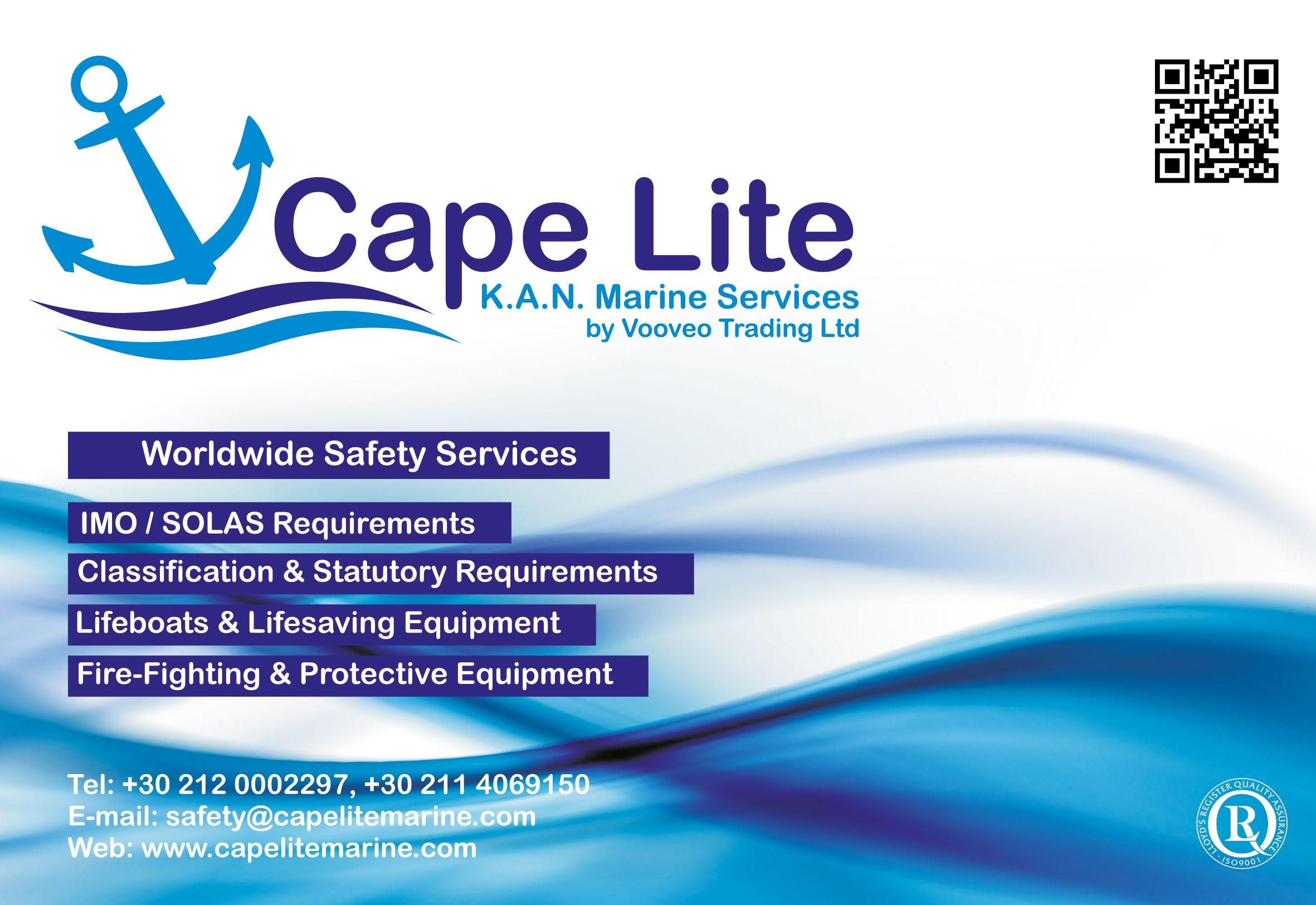
“The current health crisis and social distancing initiatives led us to adapt our UV-C technology to protect workers from picking up the virus from surfaces and to ensure they are working in safe, virus-free environments,” said Mr Gillmann, adding that UV-C disinfection technology has been around for a long time.
It was invented in Marseille, France, in 1904. However, its application was limited until recently, when it emerged that the technology is highly effective in killing pathogens and organisms in water systems, such as ship’s ballast water.
BIO-UV Group has already received orders for the system and is establishing distribution channels for export.
“We will further develop BIO-SCAN to treat larger volumes and surfaces and adapt the system for use in mass transport systems, but for the moment we are prioritising medical and paramedical professionals (hospital staff, community doctors, nursing homes, dentists, physical therapists,
firefighters, and paramedics). It will also be made available for other sectors and industries,” said Mr Gillmann.
The shipping industry is a likely beneficiary as it can be used on bridge and navigation instruments and in crew and passenger cabins, among other areas.
Mr Gillmann added: “We are currently developing several products to meet the specific needs of each of these markets. In addition, our subsidiary TRIOGEN is developing an ozone-based disinfection system for damp surfaces.” u


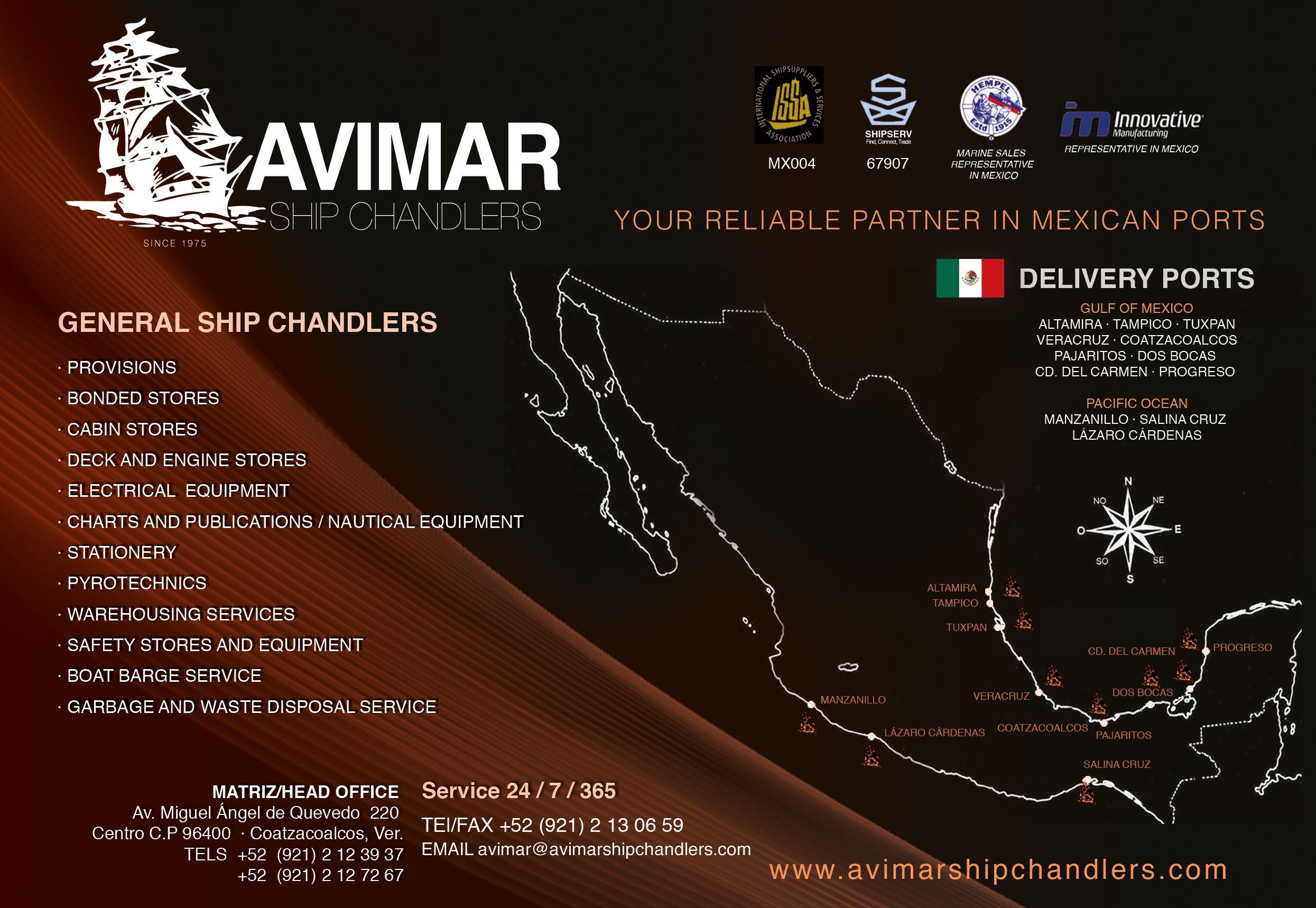
Cruise supply has “fallen off a cliff”
Only recently it was a booming sector of the global travel industry. Then along came COVID-19 and everything changed for the cruise market.
The pandemic, and subsequent port closures, have shut down the £120 billion dollar cruise industry and this has not only had a catastrophic effect on the cruise operators and employees but the supply chain as well.
One company which has experienced the devastating economic impact of the killer virus is Cavendish Ships Stores, based in Fareham, UK.
Its Director John Davey, who is also Executive Vice President for ISSA and Representative on the OCEAN Board for BASS, the British Association of Ship Suppliers (BASS) and OCEAN Vice President, said business had “fallen off the edge of a cliff” during the past few months.
“We are providing for the crew but whereas I would get a £100,000 order, it’s now an order for £1,000,” he told The Ship Supplier. “Our business is down 95%.”
The company has had to furlough 24 of its employees, and the pandemic could not have come at a worse time since it invested heavily in new premises which opened last year.
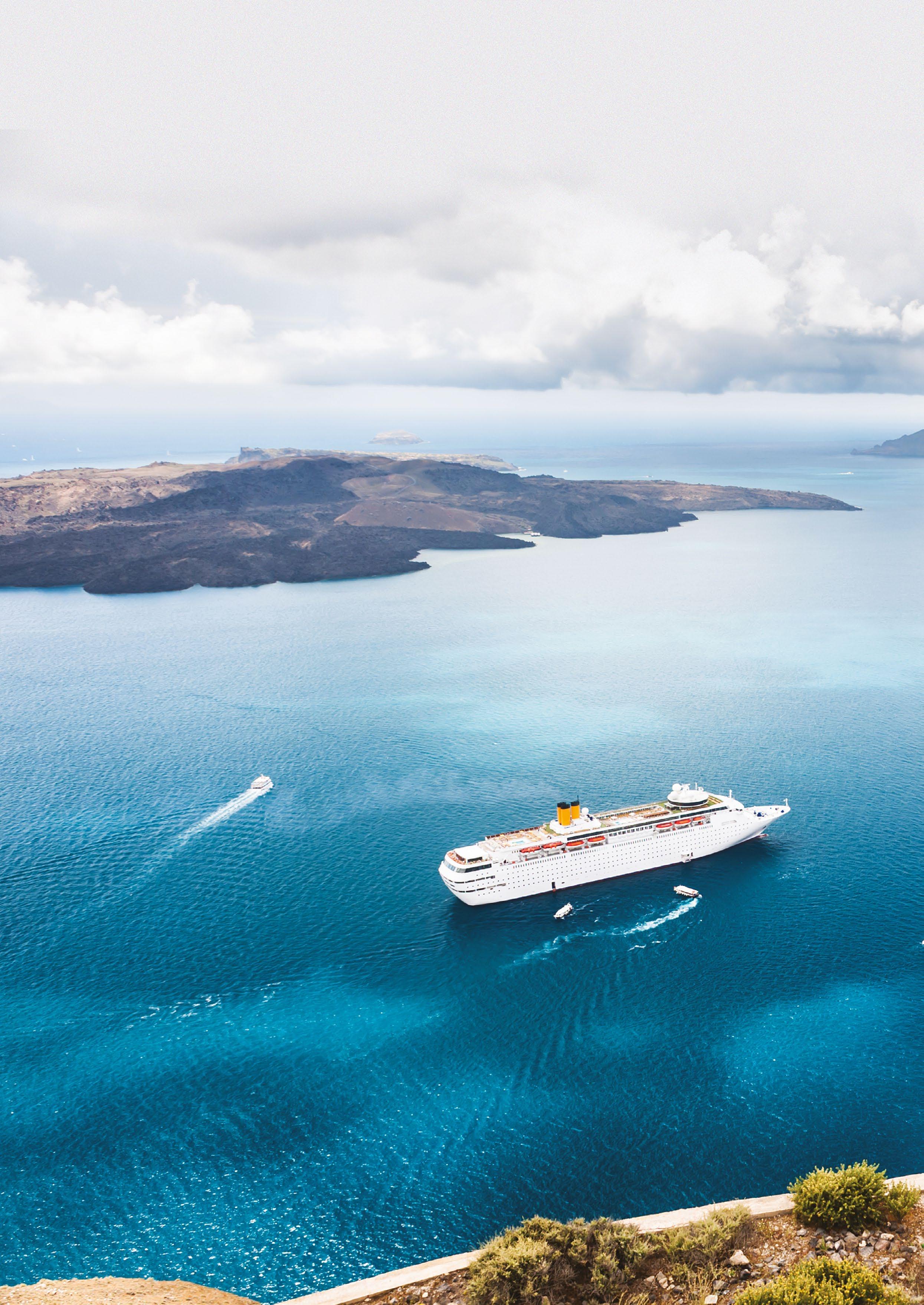
The cruise industry is resilient, and we are seeing some positive trends that bode well for the future
“ ”
Tom Boardley, Secretary General, Europe CLIA (Cruise Lines International Association)

ISSA News: Cruise Supply 42 | The Ship Supplier | Issue 85 2020
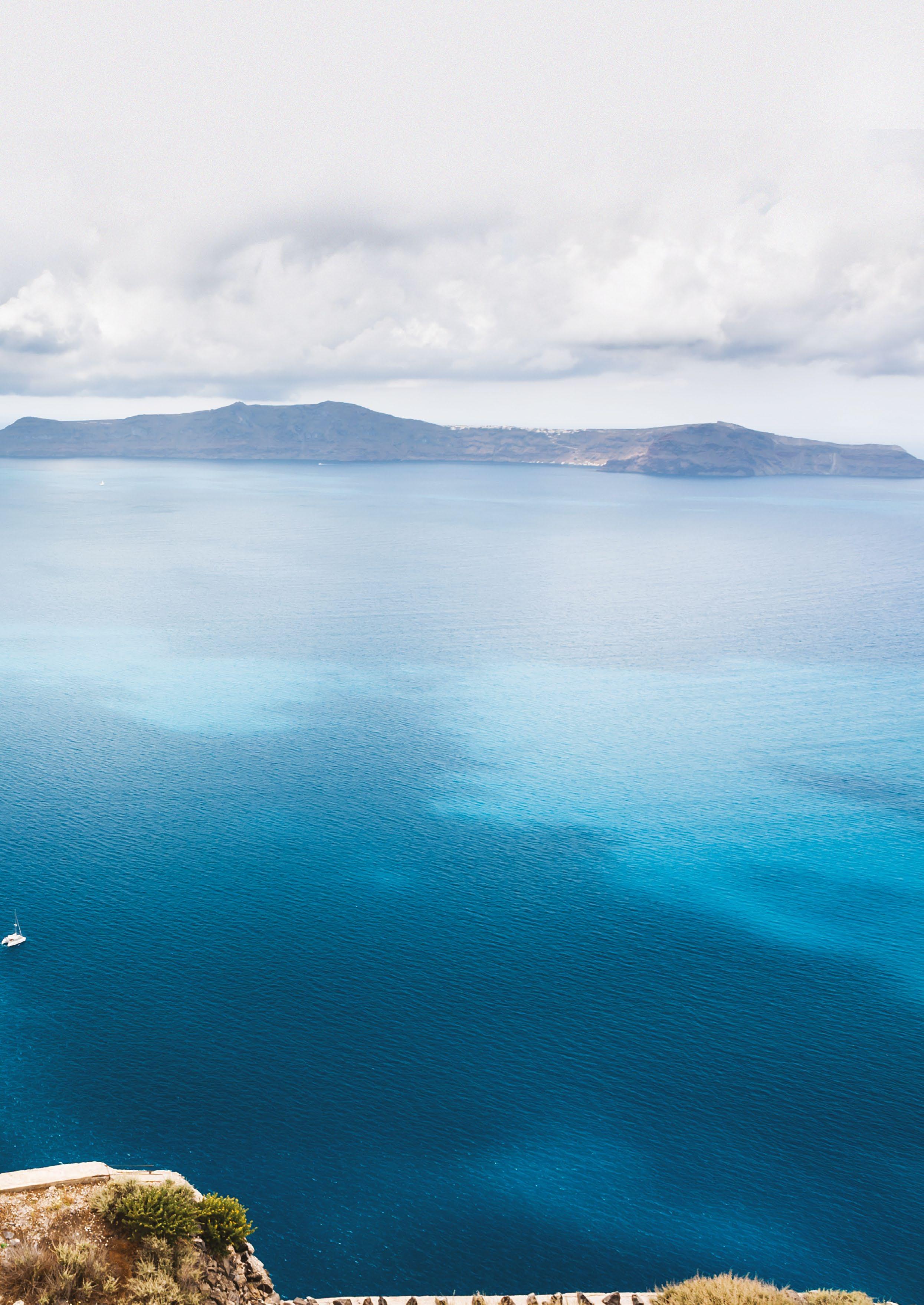
Mr Davey says this is compounded by the added uncertainty on when the cruise market will re-open for business.
Tom Boardley, Secretary General, Europe, CLIA (Cruise Lines International Association), told The Ship Supplier that while a fully defined timetable for resumption of cruising had not yet been finalised, “we expect cruises in some markets to start in a gradual, phased-in manner”.
Mr Boardley said that while suspending operations was the right thing to do to address the challenge, it had unfortunately had a signifgicant impact. CLIA research shows that for every 1% drop in cruising that occurs worldwide, up to 9,100 jobs can be lost, so each day of the suspension results in the loss of 2,500 jobs.
“People are at the heart of the cruise community – small and medium-sized businesses and independent business owners that extend well beyond the cruise industry,” said Mr Boardley. This included many small and family-run firms such as travel agencies, hotels, port agents, catering companies, suppliers and manufacturing services.
“As we prepare to sail again, a strong cruise community is critical to supporting the much-needed economic recovery,” he said.
He added that CLIA was maintaining regular dialogue with CLIA travel agent members and Executive Partner companies within the cruise industry eco-system, including port agents, technical suppliers, port authorities and cruise terminals.
Mr Davey said the difficulty with trying to kick start the cruise market, even if some ports do open, is that many countries now have quarantine measures in place, such as the UK where anyone who travels abroad currently has to enter 14 days of quaranatine, so anyone wanting to take a two-week holiday will have to take a month.
“I think the cruise lines are being quite vociferous about this and CLIA are lobbying on that front along with all the tour operators,” said Mr Davey.
He believes that if a vaccine is approved and made available in September/October the situation could change but cruise lines will have added safety protocols.
“They have told us already that they are only going to run the ships at 50%,” he said.
Mr Boardley said: “At least in some regions, the first cruises that depart may be shorter voyages and offer more limited itineraries. Cruise lines are working with ports and destinations so that cruise itineraries are designed with public health in mind.”
He said the cruise industry was using this time of suspension to review and enhance how it can go even further to protect the safety of guests and crew. “It is too early to say now what changes will be needed in future. We are learning, just as everyone is, and we are consulting with scientists and medical experts to help us with our planning.”
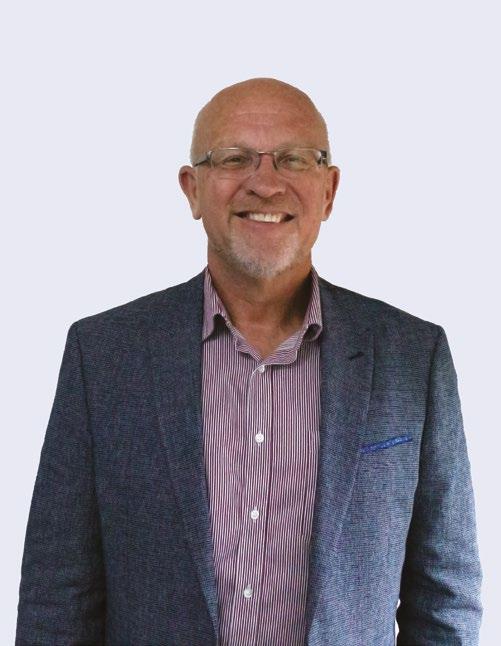
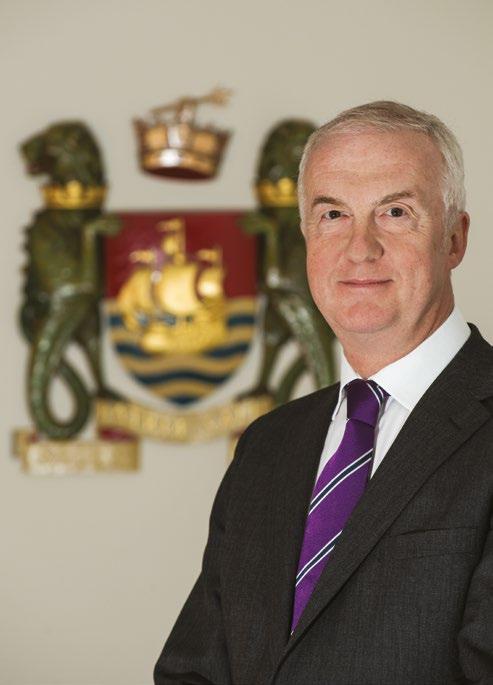
When sailings do resume CLIA anticipates new and enhanced protocols that reflect the latest advice from health authorities and go beyond other travel sectors. The wide-ranging approach involves exploring more robust screening protocols, expanded cleaning and sanitation practices, and comprehensive shipboard prevention, surveillance and response measures to protect the safety and health of passengers, crew and the communities the vessels visit.
Meanwhile, Cavendish Ships Stores is sitting on £1.4 million worth of contracted stock and Mr Davey also believes the cruise lines will not be placing any big orders as soon as they are allowed to get up and running again.
“We have had recent conversations with most of our customers and the ships are well-stocked, so if they only start one ship, they will move the stores they’ve got on one ship to the ship that is going to go. So, though we will be asked for fresh provisions, we may not see any major orders until the new year,” he explained.
“If the vaccine comes and people get vaccinated, it’s a different ballgame,” said Mr Davey.”The cruise lines are sitting on massive investments and they are laying off staff as well, so I think the sooner they get up and running, the better. However, I can’t see the round the world cruise season happening this year. I think it will be cruises out of the UK for the foreseeable future.”
He added: “Some ISSA members have been stung by cargo ships going bust. There are equally bad stories around. I think it’s about trying to weather the storm to be honest.
“The main thing is we are healthy. We will work this through, even though it’s painful.”
“The cruise industry is resilient, and we are seeing some positive trends that bode well for the future,” said Mr Boardley. “CLIA conducts twice yearly research to understand consumer sentiment towards cruise and our latest findings are encouraging as they show that overall interest in cruising remains robust. This is particularly the case for those who have cruised before, which may in part be due to their first-hand experience of the health and safety regimes already folllowed by cruise lines.” u
Issue 85 2020 | The Ship Supplier | 43 ISSA News : Cruise Supply
Tom Boardley, Secretary General, Europe, CLIA
John Davey, Director, Cavendish Ships Stores
“A 10-step Action Plan”
By Roger Symes, Director, Marine Debt Management
If you are reading this article it means you are still in business!
Congratulations! The past few months may well have been the most difficult in your career. Thankfully, the first wave of COVID-19 is now behind us but, for certain, tough times will stay with us for some time to come.
ISSA members can expect sales to commercial ships in the current year to be on average 25% below budget. Those serving the cruise and offshore sectors will be worst affected. The tanker and gas sectors will suffer least but, even here, the fall in demand for energy products is already leading to over supply and volatile freight rates.
The outlook is made more unpredictable because so many
Study where your business is coming from and who are your main customers.
01
ship owners have sold ships and leased them back. Will the leasing companies grant payment holidays, as the banks did following the global economic downturn in 2008? Or will they foreclose? For sure, we will see more bankrupt shipping companies this year.
For most ISSA members the biggest asset on their balance sheet is the debt they are owed by their customers. It’s far higher than the value of property, stock or cash in the bank. It is more important than ever to protect that asset and ensure it can be collected. Whilst the temptation is to focus on making up for lost sales, all ship suppliers need to concentrate on getting paid.
To that end, here’s our 10-step Action Plan, designed to ensure you stay in control during the turbulent months ahead.
Only supply customers in arrears if they first come back into terms or, at least, reduce their debt. Be willing to say no more credit, even to longstanding customers.
02 03 04
Prioritise those willing to pre-pay or pay cash by Master or local agent. Increase the differential between cash & credit prices.
For any severely overdue accounts, agree a strategy with the customer to get them back to agreed terms or, at least, within periods acceptable to you. Stop future deliveries if need be.
Look at who owes you money. How many customers? How much debt?
(Usually about 80% of the debt will be owed by 20% of the customers).
05
Be wary of new customers. Always perform an appropriate level of due diligence before granting credit terms.
Consult third-parties regarding debtor accounts 60 days or more past due dates, for example local port agents, your branch or agent local to the debtor.
06 08 09 07 10
Drill down into the accounts of the largest 20%. Focus efforts on bringing them closer to your agreed payment terms. Resolve any stray and/or disputed invoices.
Next turn to the 80% of customers representing 20% of the monies owed to you. Who pays on time or close to it? Require cash payment in future from all others.
Discuss debtor accounts 90 days or more past due dates with a specialist lawyer or debt collection company. There is no advantage in further delay.
Not every one of the above 10 steps will be appropriate to every ISSA member. You may wish to adjust the given periods and percentages. However, do not ignore any of the steps unless you have a good reason for doing so. u
Debt Management 44 | The Ship Supplier | Issue 85 2020
German Shipsuppliers Register 2020/2021 published
The German Shipsuppliers Association, Hamburg, has now published its 48th edition of the German Shipsuppliers Register which contains information about 121 ship store merchants in 29 ports of Germany. Apart from company names, addresses with telephone-, telex-, telefax-numbers, email addresses, web sites and lines of business, the Register stipulates further details such as names of proprietors, managing directors, departments, managers, clerks,
agencies and distribution of specific goods, branch offices, ports of delivery etc.
The Register is issued in an edition of more than 4000 copies in English (volume: 96 pages DIN A5, four colour printing) and will be distributed worldwide to shipowners, shipbrokers, companies allied to the shipping industry and to shipyards. It is published annually in June.
The Register contains member companies of the German Shipsuppliers Association which can be considered as
bona-fide ship store merchants. It enables ship owners to select their suppliers from the large number of companies. Moreover, this Register gives extensive information on the ship store trade in Germany for wholesalers and other circles allied to the shipping industry.
Online-Version and a Webbook of the German Shipsuppliers Register 2020/2021 can be seen and downloaded from the Association web site www.shipsuppliers.de. u
ISSA welcomes new members
Probucam SA
Calle 1 #
101 Y General Francisco Robles
Ecuador
Phone: 59 34 244 6689
Email: quotations@probucam.com, operations@probucam.com
Southwind Marine Trade TR Building Level 1Glosail Danga
Chittagong 4100
Bangladesh
Phone: 880-31-717667
E-Mail: info@southwind-bd.com, smtship@gmail.com
Baltmarine Trading UAB
Silutes Plentas 95D
LY-95112 Klaipeda
Lithuania
Phone: +370 46 212110/+370 614 66040
E-Mail: trading@baltmarine.eu
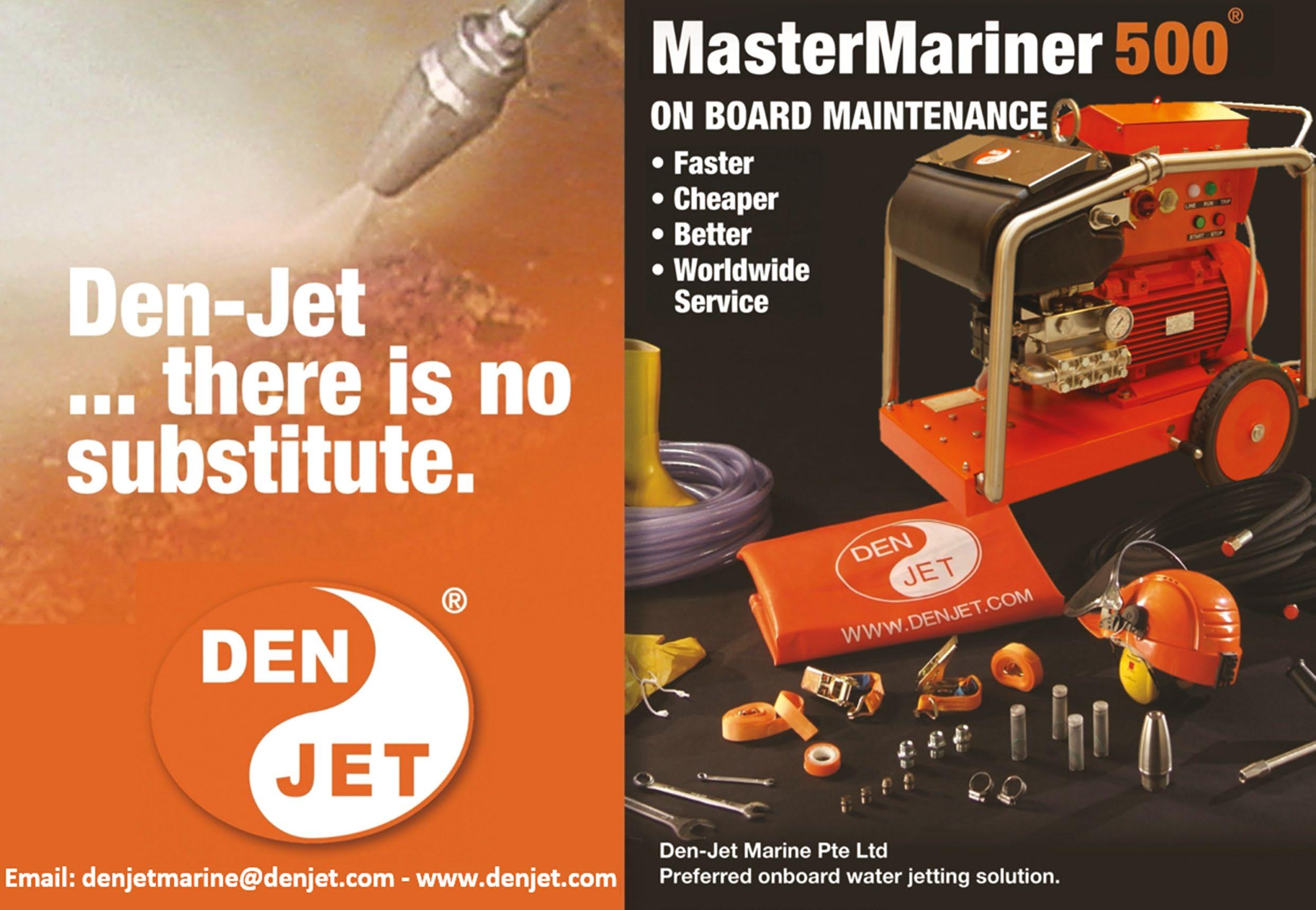
ISSA and Ship Supply News
Pressure mounts to designate seafarers as keyworkers
Pressure is mounting on governments to treat seafarers and port service provider personnel as keyworkers, with many left stranded and put on extended contracts due to national lockdowns amid the coronavirus crisis.
The heads of the maritime, labour and aviation organisations of the United Nations recently issued a plea for urgent action on crew changes and for keyworker designation so those working at sea can be relieved and repatriated in a safe way during the COVID-19 pandemic.
In a joint statement, the International Civil Aviation Organization (ICAO), International Maritime Organization (IMO) and International Labour Organization (ILO) advised that as from the middle of June, around 150,000 seafarers a month will require international flights to ensure crew changeovers can take place.
Half of these seafarers need to be repatriated home by aircraft, the other half will be joining ships. Due to COVID-19 restrictions, large numbers of seafarers, as well as crews of fishing vessels, have had to

extend their service onboard ships after many months at sea, unable to be replaced or repatriated after long tours of duty. This is unsustainable, both for the safety and wellbeing of seafarers and the safe operation of maritime trade.
“For humanitarian reasons – and the need to comply with international safety and employment regulations – crew changes cannot be postponed indefinitely,” the statement said. “We are seeking the support of Governments to facilitate crew changes, operations essential to maintain the global cargo supply chains and operations related to humanitarian aid, medical and relief flights.”
During the unprecedented COVID-19 pandemic, travel is being curtailed to prevent spread of the disease. Some ports and airports remain closed due to travel restrictions, with ships and aircraft denied entry, and/or have introduced restrictive measures for foreign nationals travelling to or from the country. As a result, seafarers around the world are stranded onboard ships, unable to be repatriated home or replaced by relief crews.
The three organisations have urged ‘keyworker’ designation for seafarers, marine personnel, fishing vessel personnel, offshore energy sector personnel, aviation personnel, air cargo supply chain personnel, and service provider personnel at airports and ports, regardless of nationality. Governments are urged to exempt these personnel from travel restrictions, to ensure crew changes can be carried out and that they have access to emergency medical treatment and, if necessary, to facilitate emergency repatriation.
The joint statement says Governments and relevant national and local authorities should implement already-agreed guidance, issued by ICAO, IMO, ILO and the World Health Organization (WHO), including on keyworker designation. This includes permitting seafarers, marine personnel, fishers and offshore energy sector personnel to disembark and embark ships in port and transit through their territory (i.e. to an airport) for the purpose of crew changes and repatriation; and implementing appropriate approval and screening protocols. u
ISSA and Ship Supply News 46 | The Ship Supplier | Issue 85 2020
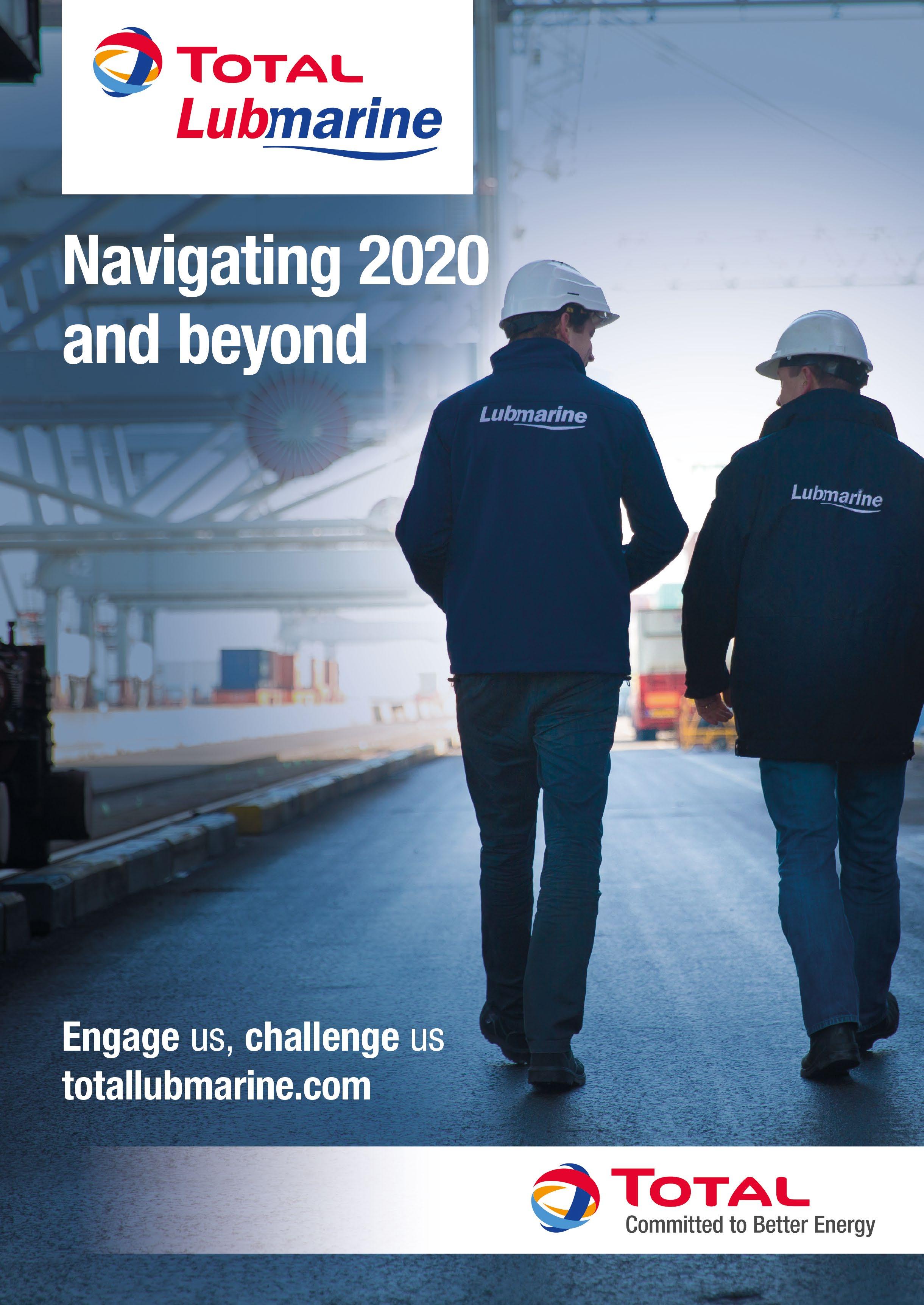
Market News
Wilhelmsen further expands 3D printing horizons with Singapore start-up F-drones
Vessels in Singapore will be able to take delivery of 3D printed spare parts by drone, after an MOU was signed between Wilhelmsen’s Marine Products and drone delivery provider F-drones for last mile delivery.
As the only drone delivery provider currently authorised by the Civil Aviation Authority of Singapore (CAAS) to execute drone deliveries Beyond-Visual-Line-of-Sight (BVLOS) to vessels at anchorage, the agreement with F-drones enables Wilhelmsen to broaden the scope of its exclusive on-demand additive manufacturing service.
Hakon Ellekjaer, Head of Venture, 3D Printing, Wilhelmsen said: “Exploring safe, reliable and inexpensive alternatives for last mile delivery of our 3D printed parts to our customers is key for us moving forward. F-Drones is actively developing a solution and their ambitions are very much aligned with our own, to disrupt the existing supply chain and offer a service that is faster, cheaper and greener.”
Currently refining the next iteration of its own proprietary drone system, capable of carrying 5kg over a distance of 50km, F-drones’ long-term ambition is to develop a larger scale drone capable of delivering 100kg to vessels up to 100km away.
Commenting on the agreement, Yeshwanth Reddy, Co-founder of F-drones, said: “We are excited to be working together with Wilhelmsen’s 3D printing venture, which is at the forefront of commercialising on-demand manufacturing for the maritime industry. Its capability can provide a large variety of parts in different shapes, sizes, and materials. With our drones that can carry much bigger items over longer distances, we
can catalyse the adoption of on-demand printing of parts for the maritime industry.”
As part of an exclusive Early Adopter Program for 3D printed marine spare parts, six customers signed up with Wilhelmsen’s Marine Products division in December 2019 to begin utilising on-demand additive manufacturing. Existing customers include Berge Bulk, Carnival Maritime, Thome Ship Management, OSM Maritime Group, Executive Ship Management and Wilhelmsen Ship Management.
Wilhelmsen is providing 3D printed spare parts on demand to the selected six customers’ vessels around the globe, reducing the typically high supply chain costs, long lead times and impact on the environment associated with the traditional supply chain. Through a unique selection, digitisation, and documentation process, parts are produced on-demand, without having to go through time consuming and costly storage, shipping, customs and receiving processes. u

48 | The Ship Supplier | Issue 85 2020
Survitec drives growth ambitions through board appointments
Safety and survival specialist solutions provider Survitec, has announced the strengthening of its Board of Directors with the additions of Nick Henry, Ian Plumb and Phil Swash as Non-Executive Directors.
These three industry leaders have exceptionally strong knowledge and experience in guiding companies through periods of major transformation to profitable growth. The new directors join a group of other industry experts led by Ron Krisanda, Survitec Executive Chairman.
Mr Krisanda commented: ‘’I am delighted to have Nick, Ian and Phil join our Board. Between them, they have decades of global, M&A, Plc and Private Equity experience having successfully led major manufacturing and service businesses through large scale transformation to deliver sustainable profitable growth. These appointments represent a major coup for Survitec and are a clear signal of our intent to become the world’s most trusted company for critical safety and survival solutions.”
Nick Henry has 36 years of experience in the commercial maritime field, across a number of its sub-sectors, including
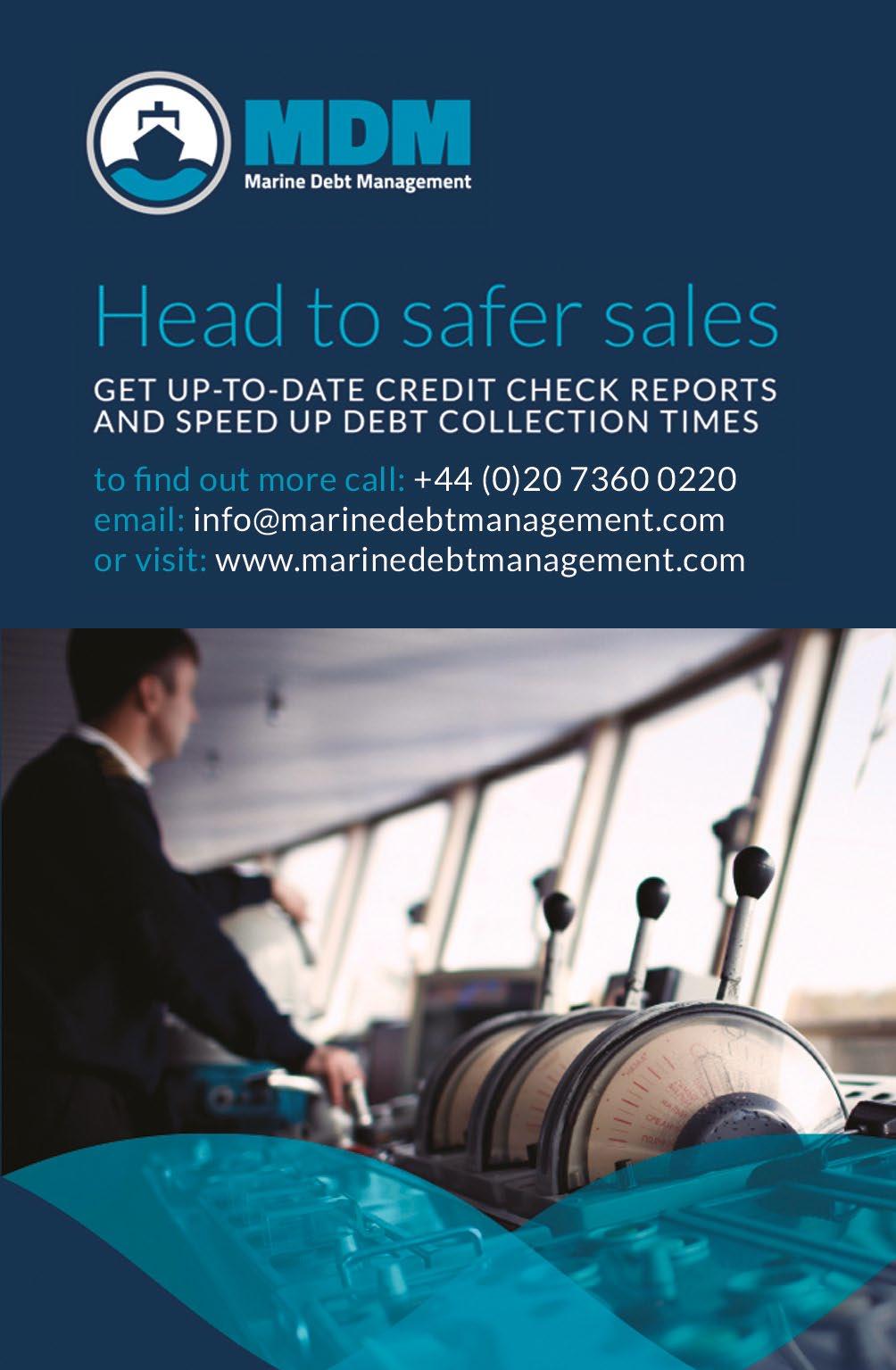
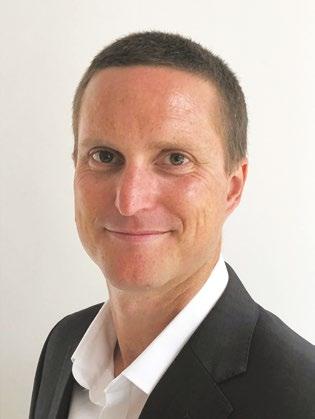

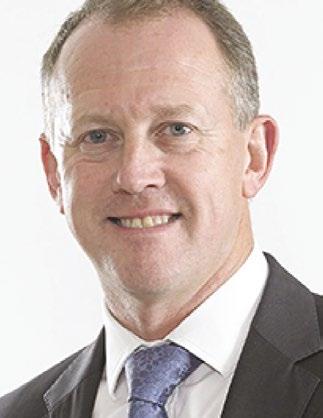
container operations and offshore services, globally. He spent the last 16 years with James Fisher and Sons, a marine services group, 15 of which have been as Chief Executive.
Ian Plumb is a highly skilled private equity professional following more than a decade of working within private equity firms. He has significant experience in all aspects of private equity exits,
Phil Swash has over 25 years’ experience in global senior leadership, transformation and P&L roles, with expertise in aerostructures, automotive, off-highway, global industrial operations, and lean and digital manufacturing. u
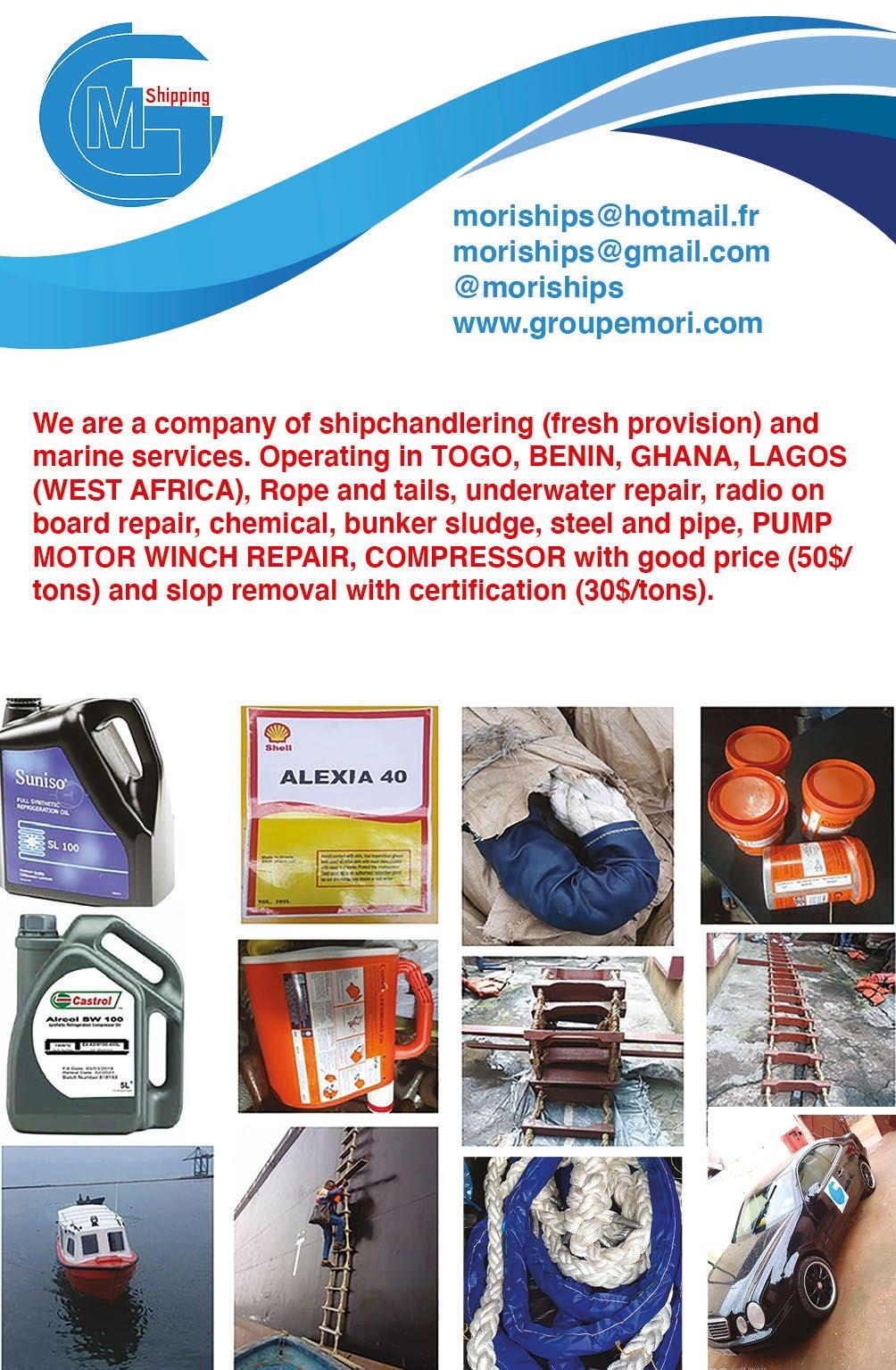
Market News
Issue 85 2020 | The Ship Supplier | 49
Ian Plumb Nick Henry Phil Swash
GAC UK office at Britain’s largest lock
GAC UK has opened its newest branch, offering marine and terminal services at the port of Eastham on the Wirral, Merseyside. It is the 25th office in GAC UK’s network of offices covering ports throughout England, Scotland, Wales, Ireland and Gibraltar.
Located at the western end of the Manchester Ship Canal, Eastham is home to the largest lock in Britain, constructed to accommodate tankers too large for the Canal. It is a major hub for chemical products such as petrochemicals, bitumen and acids, with several onshore terminals and refineries.
GAC took over the marine and terminals duties of longstanding rigging firm W Muskers, and counts 14 of their highlyexperienced professionals among its Eastham team. Between them, the members of the team headed by Operations Manager Richard Warburton and Supervisor Ben Williams represent 228 years’ experience.
GAC UK Managing Director Herman Jorgensen said:“We are excited and honoured to take over the work of W Muskers at
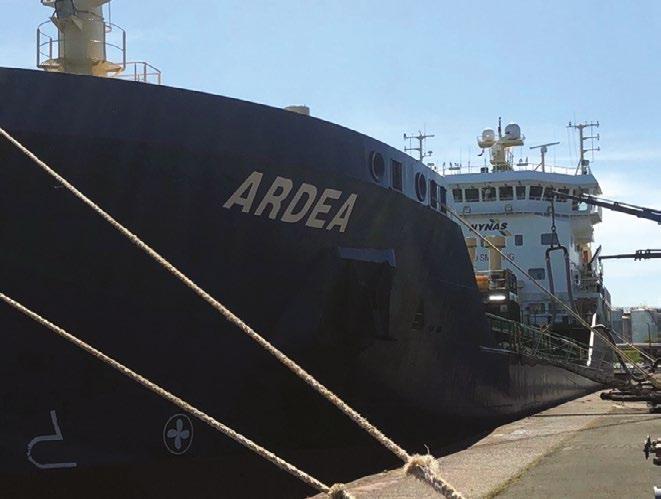
Eastham. We truly respect the incredible experience built up over more than 50 years and will honour and build on that into the next 50 years, having an utmost focus on health and safety and customer service in everything we do.”
From their base at Queen Elizabeth II Dock, they handle vessels coming up the River Mersey to load or discharge liquid bulk cargoes at the port’s terminals and refineries. Working around the clock, every day of the year, GAC Eastham is set to handle 30 vessels every month. u
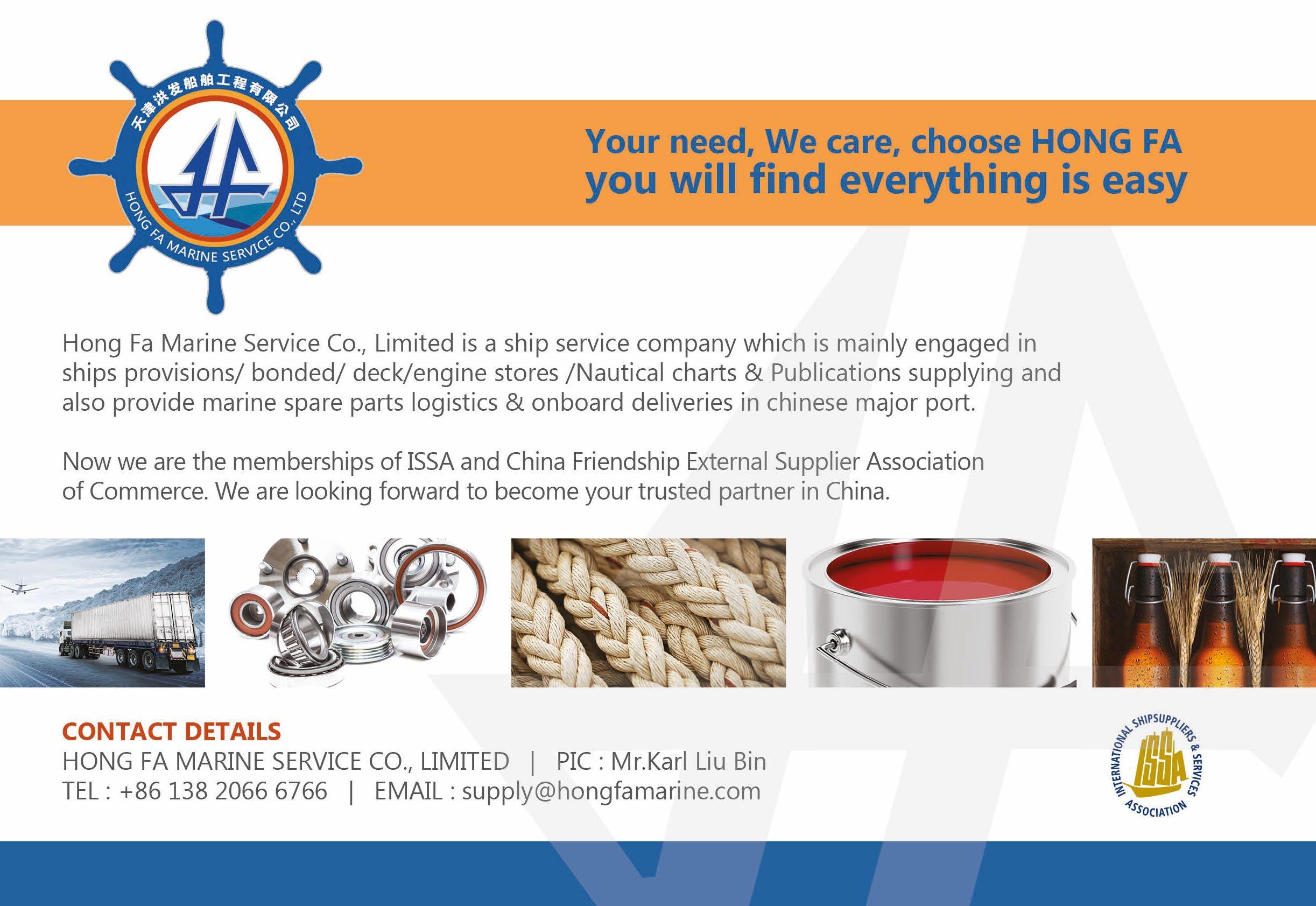
Market News
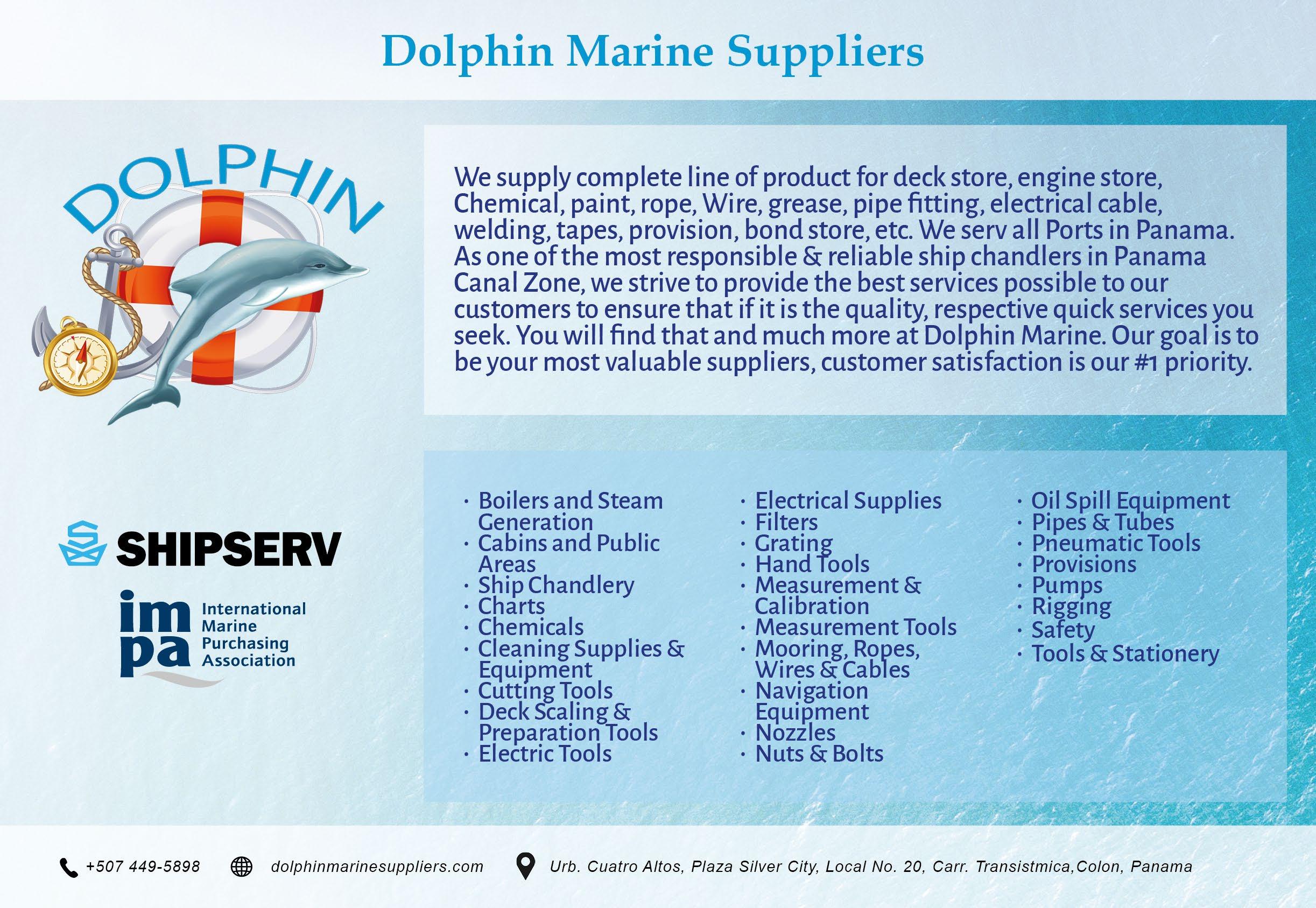
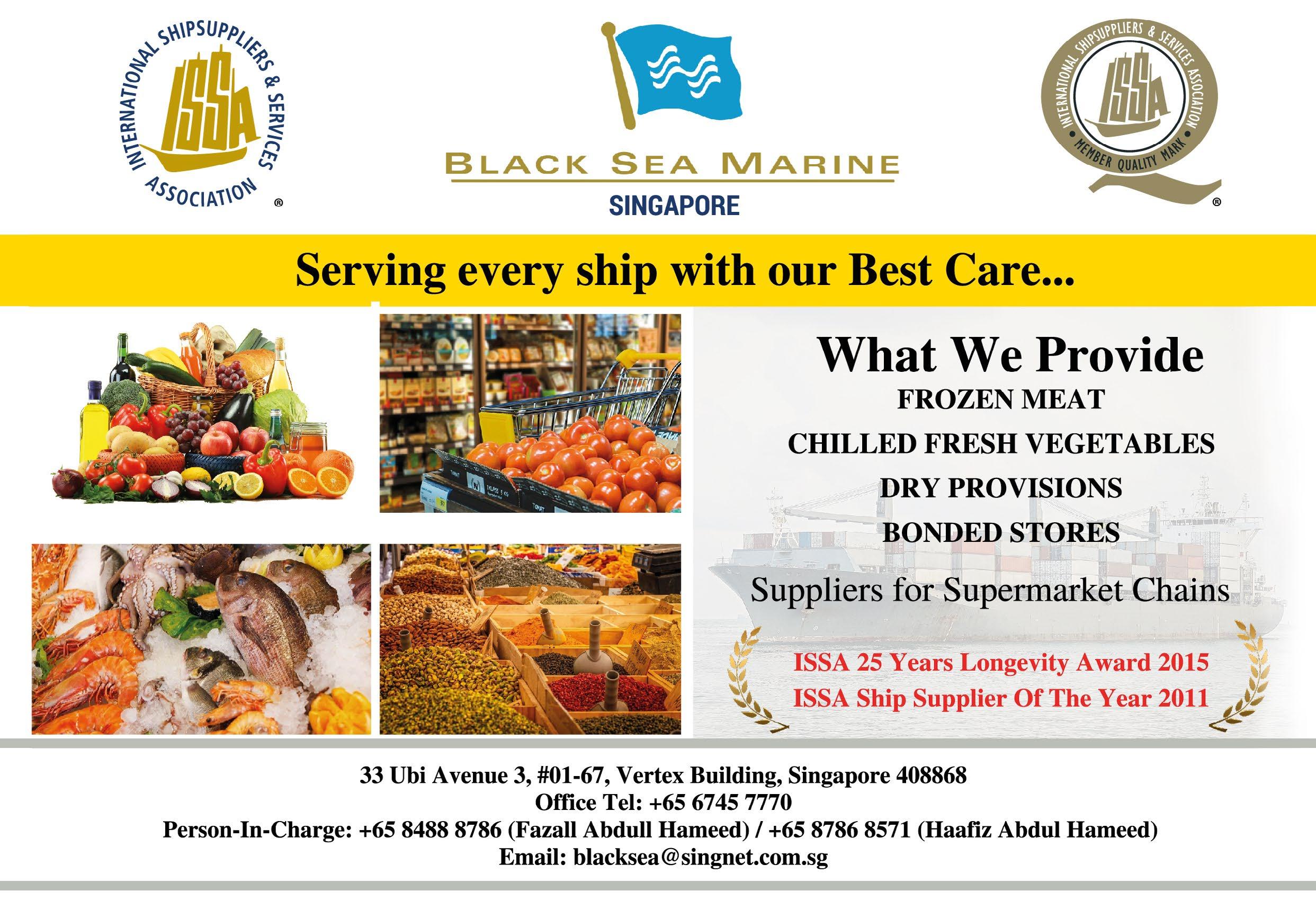
New Chicago lab extends Total Lubmarine’s technical services
Total Lubmarine has extended the global reach of its technical support services with the opening of a new Diagomar Plus Laboratory in Chicago, US. The new lab opening means the marine lubricant specialist now has five centres around the world – with Chicago joining Ertvelde (Belgium), Singapore, Shanghai, and Panama City.
”Our customers around the world value the level of technical expertise and support our dedicated teams are able to offer them to not only help deliver engine lubrication recommendations for optimum cost control results but crucially, through analysis and insight of equipment, to ensure operational efficiency and safety, and helping reduce vessel machinery downtime. So, we are delighted to extend this level of technical support still further with the opening of our new Diagomar Plus Laboratory in Chicago,” said Olivier Suming, Service Product Manager at Total Lubmarine.
“North America is an increasingly busy market for us and the opening of the Chicago Lab ensures we have a specialist team on hand to deliver onshore dedicated technical support to our customers,” he added.
Through the new Lab, Total Lubmarine’s customers in North America are able to access rapid and accurate lubricating oil analysis services for monitoring the performance and condition of marine engines and auxiliary machinery – helping them proactively prevent unnecessary damage before it happens.
The range of services available through the new Chicago Lab include standard analyses for Engine Oil, Nonengine Oil, Drain Oil, Thermal Oil, Stern tube Oil, and EAL (Environmentally Acceptable Lubricant).
The combination of technical services, expert lubricant knowledge and specialist insight offered by Total Lubmarine’s Lab network enables ship operators and crews to decide the best courses of action specific to their vessel. This is supported by dedicated marine lubricant specialists from Total who can assist and advise whenever required.
“We have developed this level of service globally that provides the necessary assurance for ship operators and engineers when they need it most,” said Mr Suming. “The
speed of service and delivery of final test results using any one of our worldwide labs is usually completed within 48 to 72 hours. Ship operators are supplied with the very best technical insight on the ‘health’ of their engines with quality reports that detail key findings and recommendations from our experts to better support decision making.” u

Market News 52 | The Ship Supplier | Issue 85 2020
Thordon Bearings appoints new engineering service distributor for US East Coast
Canyon Marine Solutions has been approved as an authorised distributor for Thordon Bearings, manufacturer of the awardwinning water lubricated COMPAC propeller shaft bearing system.
The Virginia-based engineering firm will provide sales and engineering support to Thordon’s complete portfolio of marine bearing and seal products in the states of Delaware, Virginia, Maryland, North Carolina, and the District of Columbia.
Canyon Marine Solutions, which officially began representing the company on 1st April, has already secured a major order for Thordon Bearings. The company will supply COMPAC propeller shaft bearings to the Marine Protector-class patrol vessels operated by the US Coast Guard.
The 87ft (26.5m) ships are based on Damen’s Stan 2600 design and were delivered from Bollinger Shipyards facility in Lockport, Louisiana. Each boat in the 74-vessel fleet, named after a marine predator, has a propeller shaft diameter of 3.75” (95.5mm)
“Canyon has already validated our decision to add the company to our global network of distributors with this high value order,” said Scott Groves, Thordon Bearings’ Regional Manager, Americas. “It’s a great kick start for a new distributor.
“The US East Coast, and in particular the Tidewater area between the Suffolk Scarp and the Atlantic Ocean, is a significant maritime market for us
and Canyon has hit the ground running. To service our customers’ requirements in the region, a full service, technical distributor was required, and Canyon Marine met all the criteria.
“Its board of directors have excellent marine engineering experience combined with an indepth knowledge of the Tidewater area which will be invaluable to the customers that Canyon Marine will be serving. We are very excited to see what the future brings,” added Mr Groves.
Canyon Marine Solutions co-founder and Director of Sales, Reece Fullerton, commented: “We are delighted that Thordon Bearings has the confidence in us to represent the company in this area. It is a huge honour to be part of the company and represent products I know work, solves problems and makes life easier for all those working on the water.”
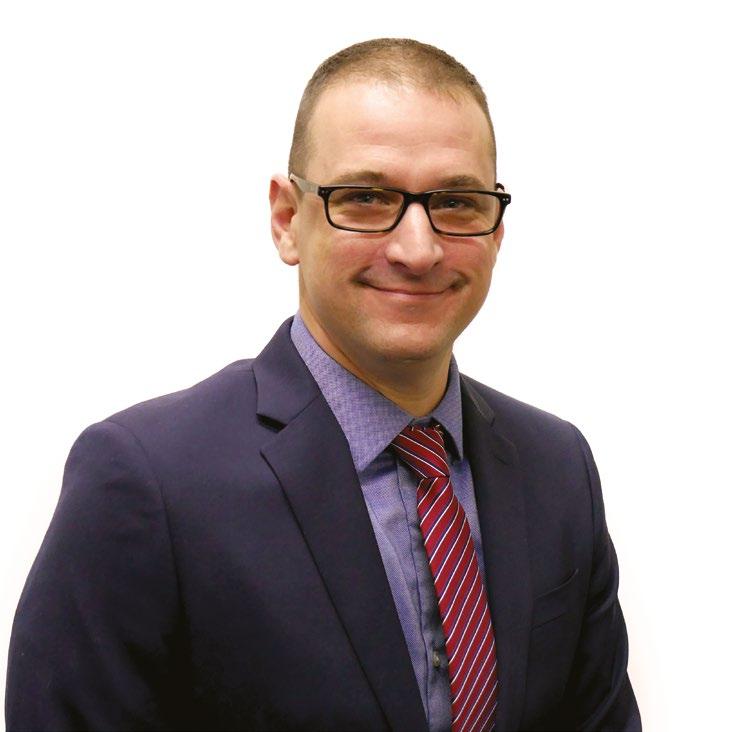
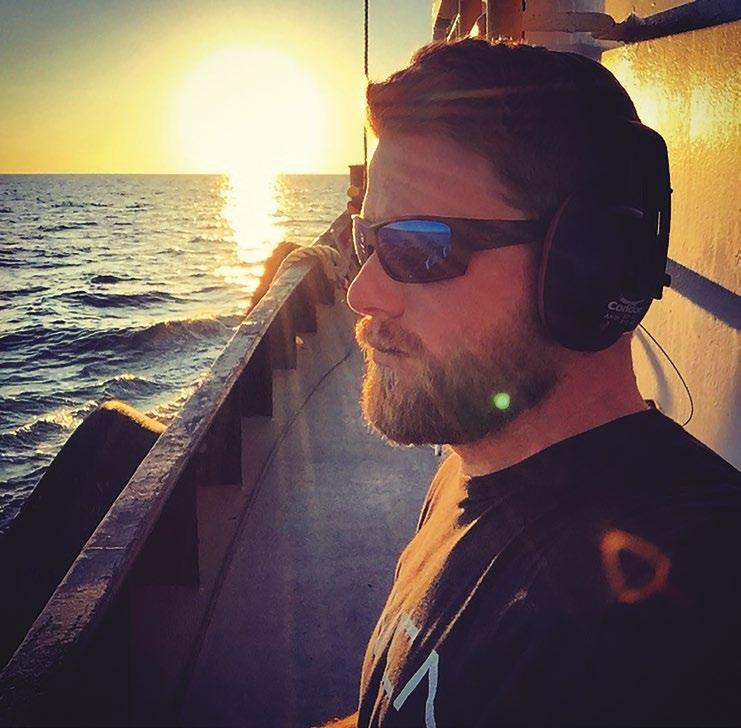
Fullerton said the Tidewater area is unique in that the culture revolves around working and being on the water.
“There is lots of marine-related industry in the region. The US Navy and Coast Guard have a significant presence here, but there are also a lot of workboats and recreational vessels. There are a lot of opportunities here for Thordon Bearings.”
Fullerton and his partners aim to grow Canyon Marine Solutions and
bring in other products that complement Thordon’s environmental vision. “We are all watermen here and Thordon’s vision of solving a maritime problem in a pollution-free way is something we really stand behind,” he said.
Canyon Marine will offer a full scope of technical services to Thordon customers, including machining and calculations, installations, commissioning and servicing. u
Market News
Issue 85 2020 | The Ship Supplier | 53
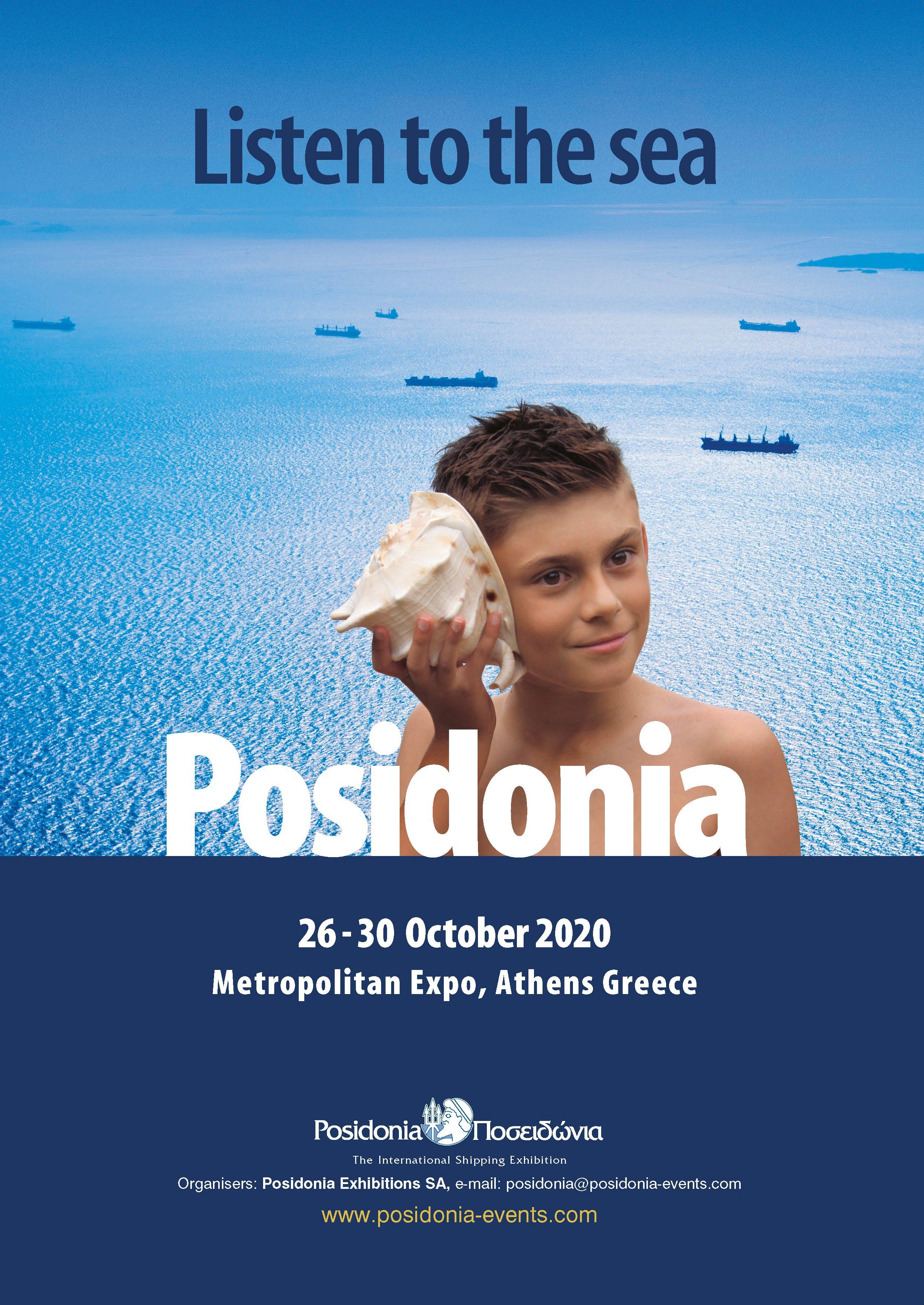
Play

Keep on moving
With up to 15 hours of battery life, Powerbeats keep up with marathons, hikes, or multiple workout days in a single charge. And with Fast Fuel, a five-minute charge gives up to one hour of playback when battery is low.
Powered by the Apple H1 headphone chip, they feature the same audio quality as Powerbeats Pro, delivering pure sound reproduction, enhanced clarity and dynamic range. You can control music and calls directly from the right earbud and play and pause your music, change tracks and take calls from your smart phone. And, when you are not wearing them you can just simply hang them around your neck.
Powerbeats
£129.95 beatsbydre.com

TV on the terrace
While we are currently spending more time in our homes, you could have your own outdoor movie experience with the Terrace TV from Samsung. It’s IP55 rated against water and dust intrusion, has a brightness of 2,000 nits so it can be seen in broad daylight, and has a QLED 4K display for outstanding performance.
Also available is the Terrace Soundbar, which is similarly IP55-rated and ready for mounting underneath or directly on the TV.
Samsung Terrace QLED 4K UHD HDR Smart TV
From $4,999 samsung.com
Bob Dylan
This is the upcoming 39th studio album by legendary American singer-songwriter Bob Dylan, and his first album of original material in eight years.
The double album is also his first since becoming the only songwriter to receive the Nobel Prize for Literature in 2016. Its 10 tracks include the three new songs released this spring: the album’s lead-off track, I Contain Multitudes, the nearly 17-minute epic Murder Most Foul and False Prophet.
In April, handwritten lyrics to Dylan’s The Times They Are A-Changin’ went on sale for a starting price of $2.2m (£1.75m).
Rough and Rowdy Ways
Columbia Records
Ray Lamontagne
Monovision is the new album from Grammy Award winning artist Ray LaMontagne, who gave us the chart hit Trouble back in 2004. This 10-track collection is his eighth studio album, and finds the artist in the multiple roles of songwriter, singer,producer, engineer, as well as performing all the instruments on every track.
This album shows how the folk singer continues to push himself in all directions with a wide range of styles, yet with a sound that could only be his.
Monovision
Columbia Records

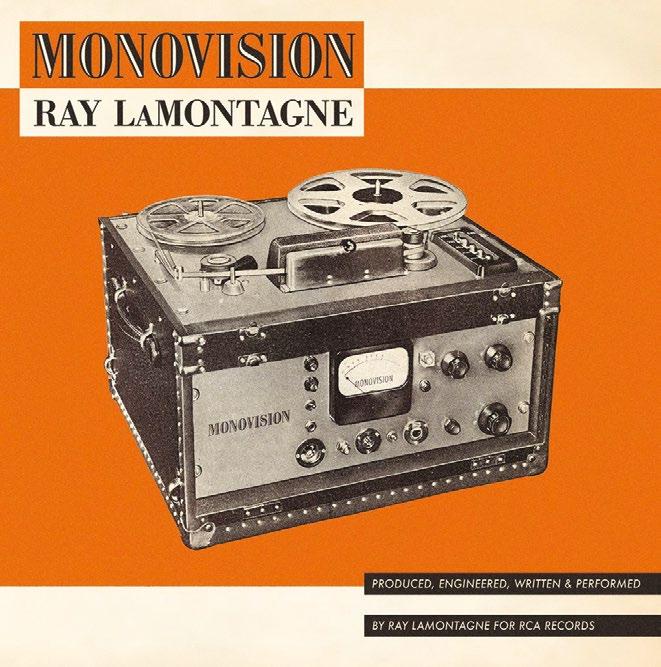
Issue 85 2020 | The Ship Supplier | 55
After Hours

Bacon back on view
The Museum of Fine Arts, Houston was the first major arts museum in the US to re-open amid the coronavirus pandemic, with strict measures in place for visitors including wearing a face mask, have their temperatures checked, and social distancing.
One of the exhibitions they can see is Francis Bacon: Late Paintings which celebrates the work of the leading figure in 20th-century British art. In 1971, he was at a turning point in his career as he prepared for a major retrospective mounted at the Grand Palais in Paris. The paintings that led up to this exhibition are among those featured in the Houston presentation, including Portrait of George Dyer in a Mirror, 1968, and Triptych, 1970. The installation will also open with a series of self-portraits, introducing Bacon’s vivid presence at a time when he stated “(I have) no one else to paint.”
Also on view will be portraits of his close contemporaries, including the poet Michel Leiris, who observed: “(Bacon’s paintings) help us, most powerfully, to feel the sheer fact of existence as it is sensed by a man without illusions.”
Francis Bacon: Late Paintings
Museum of Fine Arts, Houston Showing now until 16th August 2020
Contemporary canteen
Within the bustling metropolis of Mumbai lies The Bombay Canteen – a café and bar offering a fun approach and traditional recipes with a contemporary twist. Dishes such as the Seafood Bhel, Grilled Chicken Kaleji and Pumpkin Seekh Kebab with Mooli & Walnut Raita are just some of the innovative creations to look out for while the bar serves up classic cocktails with Indian flavours and reimagined colonial punches. The Bombay Canteen is housed within a former Mumbai bungalow, an ode to the vibrant city’s architectural history. It also has a bakery counter inspired by the traditional Indian bakeries, selling a selection of freshly baked savoury and sweet indulgences such as kheema buns.
www.thebombaycanteen.com

Black cab secrets
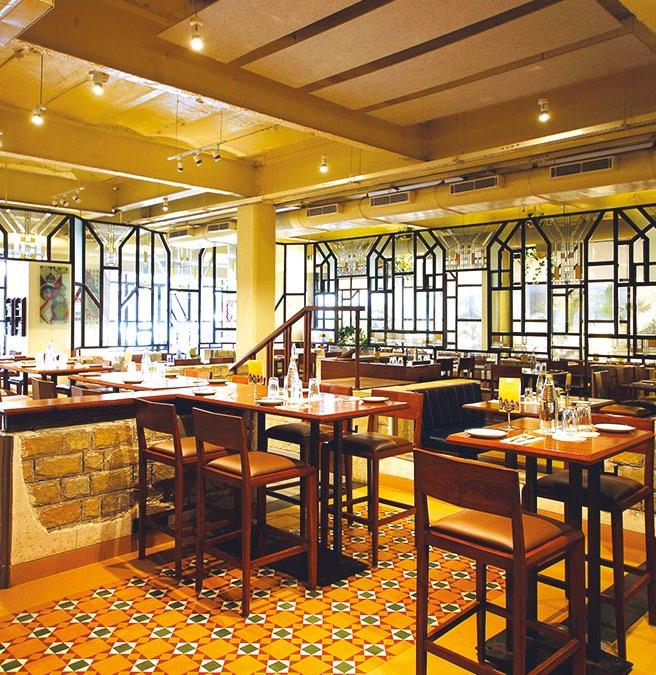
Meet the black cab driver, the keeper of London’s greatest secrets. Following the continuing success of a wide range of vocational memoirs, this story reveals a life lived in England’s bustling capital, and is one that uncovers its captivating secrets. Thanks in part to one of the most world-famous and challenging taxi tests in the world, the knowledge, and his own fascination with the metropolis, this cab driver can not only navigate the trickiest route to your destination, he can also recall all of the wonderful ,and weird, facts the streets have to offer along the way.
Every single day he bravely ventures into 60,000 streets crammed into a six-mile radius, he faces many pitfalls: wrong turns, one-ways and the dreaded dead-ends. His journey through England’s smoky capital is a perilous one. But this expert navigator, who spent 23 years as a London black cab driver, is the keeper of London’s greatest secrets and here, in a never-before-heard account, this cabbie reveals his fascinating life lived in London’s labyrinth.
Everyone is entitled to My Opinion: The Autobiography of a London Taxi Driver
By David Styles Penguin UK
56 | The Ship Supplier | Issue 85 2020
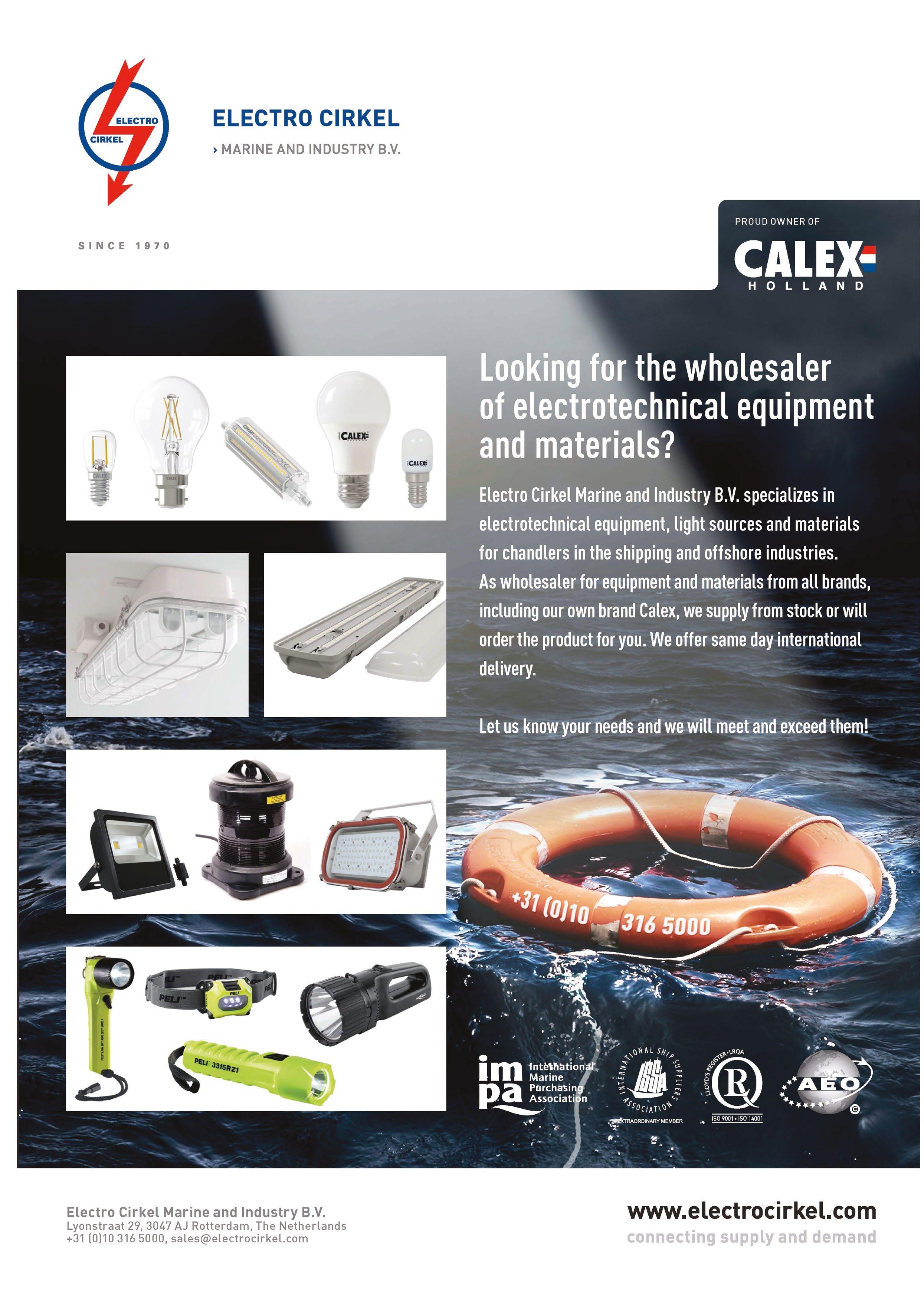
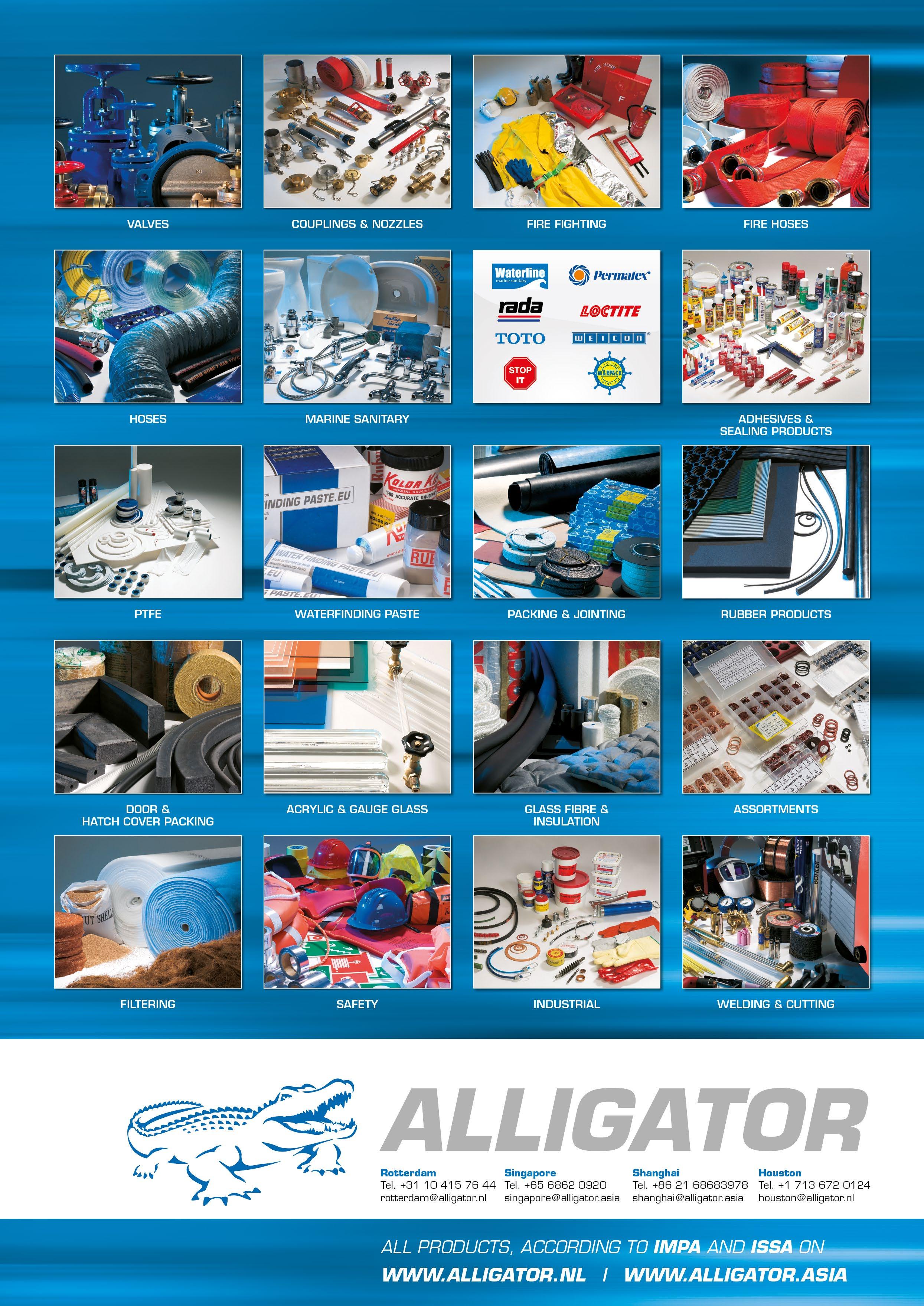

























































































































































 Mike Dobson, Commercial Director, Matrix Ship Management
Mike Dobson, Commercial Director, Matrix Ship Management





















































